
Dynamics

|
Generational Dynamics |
| Forecasting America's Destiny ... and the World's | |
| HOME WEB LOG COUNTRY WIKI COMMENT FORUM DOWNLOADS ABOUT | |
Violence escalates cross Yemen
Dozens of people have been killed across Yemen on Monday. Previously, fighting had been largely confined to the capital city, Sanaa, but in the last few days, violence has spread to a number of other cities as well, indicating the possibility of a situation spiraling out of control.
 |
The peaceful demonstrations began in Sanaa in February, with protesters demanding that President Ali Abdullah Saleh step down, after 33 years ofrule. The demonstrators were following the pattern of the uprisings in Tunisia and Egypt.
Saleh's security forces began using live ammunition and teargas on the peaceful protests in March, and the use of violence has been increasing ever since. Once the killings mounted, the powerful al-Hashid tribe, headed by a former Saleh ally Sheikh Sadeq al-Ahmar, turned against Saleh and joined the protesters.
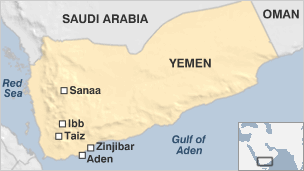 |
Several escalations have occurred within the last week. Saleh's forces have begun using bombers to attack Hashid positions, according to Al-Jazeera. A group of 300 militants, led by Al-Qaeda on the Arabian Peninsula (AQAP) attacked and devastated the town of Zinjibar on Saturday. On Monday, Saleh's forces bombed the militants in Zinjibar, and ground forces fired on peaceful protesters in the city of Taiz for the first time.
Some of the military began to defect when the army started firing on unarmed protesters, but they've mostly been loyal to Saleh until recently. However, the militant takeover of Zinjibar has caused a group of dissident generals to defect, accusing Saleh of surrendering to the "armed terrorist group."
Analysts who cover Yemen have been expressing different views on what's coming next. According to a BBC analyst in Sanaa,
"To some extent, the protests have been hijacked, not only by tribalists, but by military defectors and political Islamists. Yet amazingly, given the combined efforts of all these parties, the people in the squares are still trying to remain independent."
An analysis by Al-Arabiya says that Yemen is "rapidly descending into chaos and anarchy"#>:
"Deep divisions among his opponents are likely to ensure that Mr. Saleh’s ruling General People’s Congress (GPC) will retain power whether or not the president is around to lead it. GPC’s positioning is also enhanced by divisions within the armed forces with key units commanded by members of the president’s family loyal to the president. The split in the military has moreover deprived Yemen of a powerful institution that like in the case of ousted Egyptian President Hosni Mubarak could tell Mr. Saleh authoritatively that it is time to go.As a result, Mr. Saleh is showing no inclination to leave office before his term ends in 2013. He has several times backed out of a deal negotiated by the Saudi-led Gulf Cooperation Council (GCC) that would have eased him out of office in exchange for immunity against prosecution.
Yemen is meanwhile rapidly descending into chaos and anarchy as a result of Mr. Saleh’s tenacity. It is a situation that the president believes works in his favor whether or not he retains power. It strengthens his claim that only he can prevent Yemen from disintegrating and Al Qaeda’s Yemeni affiliate, Al Qaeda in the Arabian Gulf (AQAP), from taking over parts of the country.
It also deepens the divisions in the country and among the opposition which enhances the GPC’s ability to hold on to power if and when he is gone."
Yemen has been an important strategic ally of the United States in the fight against terrorism. But it's also become the headquarters of Al-Qaeda on the Arabian Peninsula, the most dangerous al-Qaeda spinoff in the world right now. A civil war in Yemen would have dangerous consequences for the world. The offensive is being taken as a result of demands by the Obama administration, but some analysts say that the operation would subject the army to even more public criticism in a country where anti-US feeling runs deep.
(Comments: For reader comments, questions and discussion,
see the 31-May-11 News -- Yemen's president hangs on to power as clashes spread to other towns
thread of the Generational Dynamics forum. Comments may be
posted anonymously.)
(31-May-2011)
Permanent Link
Receive daily World View columns by e-mail
Donate to Generational Dynamics via PayPal
Pakistan to launch a major military offensive in North Waziristan
This morning's key headlines from GenerationalDynamics.com.
The Pakistan army, working in conjunction with the U.S. military, will lanuch a military offensive against al-Qaeda and Taliban safe havens in Afghan border regions. Humanitarian agencies have been quietly told to prepare for up to 365,000 displaced people (refugees) as a result. Dawn/Reuters
In a move that's typical of our times, the German government is shifting positions and will now consider simply providing more money to Greece on June 29 to make its next loan payments. The Germans had previously objected to this approach, since Greece would simply be borrowing more money to pay off existing loans, and had been demanding that Greece default on its debt in some way, preferably by simply extending the time period when payments on its debt would be due. The hope in all of this is that Europe will experience the fabled "V-shaped recovery" that will wipe out existing debt through growth. But the European Central Bank (ECB) has been bitterly opposed to any Greek default, and the Germans are now apparently giving in. However, the fight isn't over yet, since the parliaments of Germany, the Netherlands and Finland will have to approve this new bailout. Wall Street Journal (Access)
One of the demands to be imposed on Greece in exchange for the new bailout will be rapid privatization of some government assets, including Hellenic Postbank, the post office. Employees of Hellenic Postbank walked off the job on Monday, to protest privatization. Other companies subject to privatization joined the protests, which were peaceful. Kathimerini
An outbreak of crime and violence in Athens, Greece, is being blamed on xenophobia stemming from a large influx of immigrants. Greece is the first point of entry for many immigrants, and there are more than 40,000 asylum applications pending in Greece. Racist violence has increasing followed the fatal knifing of a 44-year-old Greek man on May 10, resulting in a "vicious cycle of hatred and barbarism." Kathimerini
China's government has had to deal with clashes between Han Chinese and several ethnic minorities in the past few years -- the Tibetans in Tibet, and the Muslim Uighurs in Xinjian province. Now a new problem has arisen, with large anti-government demonstrations by Mongols in several towns in Inner Mongolia. Two people have been killed in clashes with police. AP
The Beijing government says that a comparison to the Tibet and Uighur riots is "improper." The Mongol riots were triggered by a traffic accident, and while there have been anti-government protests, there have not been clashes between ethnic groups, as there were in Tibet and Xinjiang. Global Times
The International Energy Agency (IEA) announced that a record 30.6 gigatons of carbon dioxide was released in the atmosphere in 2010, a rise of 1.6 gigatons from the previous year. The new figures were a shock to climate change experts, who had believed that the poor world economy would like the burning of fossil fuels that cause most of the emissions. Experts called for more government controls, enforceable international agreements, and the spending of vast sums of money to control future emissions. Telegraph
Last Friday's demonstrations in Cairo, Egypt, have caused a further split in Egypt's Muslim Brotherhood. The purpose of the demonstrations were to seek a "second revolution," because of activist impatience with the speed of governmental change. The Muslim Brotherhood had opposed the demonstrations, but the Muslim Brotherhood Youth took part in the demonstrations anyway. Now, the leadership is retaliating by suspending the membership of the Muslim Brotherhood Youth in the Revolution Youth Coalition. The Youth Coalition is deciding its next step. Al-Ahram
Eight high-ranking Libyan army officers appeared in Rome on Monday saying they were part of a group of as many as 120 military officials and soldiers who had defected from Muammar Gaddafi's side in recent days in Libya. Reuters
 |
Harvests of fish and rice in central and eastern China are in danger because of an extended drought, affecting 34 million people across five provinces. The drought also threatens to cut into power production. Reuters
Young girls in China's southern Guangdong province will be taught how to avoid becoming a mistress. Many school and college girls become mistresses because they can make so much money doing so. A mistress from a less renowned school costs a man $3,000 per year, and up to $26,000 for students from the best campuses. Time
(Comments: For reader comments, questions and discussion,
see the 31-May-11 News -- Yemen's president hangs on to power as clashes spread to other towns
thread of the Generational Dynamics forum. Comments may be
posted anonymously.)
(31-May-2011)
Permanent Link
Receive daily World View columns by e-mail
Donate to Generational Dynamics via PayPal
Crisis civil wars -- the worst of the worst wars
Monday is Memorial Day, originally called Decoration Day, a day of remembrance for those who have died in our nation's service. Decoration Day was officially proclaimed on May 5th, 1868, by President Ulysses Grant, to honor and decorate with flowers the graves of fallen soldiers during the Civil War. Later on, this holiday came to include fallen soldiers from any war.
 |
Even today, the American Civil War (or, as some call it, the War of Northern Aggression) stirs great passions and fury, and it's appropropriate to ask why that is, after 156 years. Is the "Stars and Bars" Confederate flag a symbol of heroism or a symbol of racism? It all depends on whom you ask, and don't be surprised if the person shouts his answer at you.
 |
From the point of view of Generational Dynamics, the reason that it's so well remembered is because it's one of the three generational crisis wars that America has fought -- the Revolutionary War, the Civil War, and World War II. Other wars -- the Mexican war, even World War I -- are barely remembered except perhaps for their names. (See "Which war came first, Korea or Vietnam?")
Historians always look for the "cause" of a war, as if such a concept makes sense. Was the "cause" of the Civil War slavery, even though Abraham Lincoln had no intention of freeing the slaves? Was the cause economic? Or was there some other cause?
For some wars you can name a cause, but for others you cannot. Leo Tolstoy, in his epic work War and Peace, about Napoleon's invasion of Russia, was completely baffled as to the cause of that war:
"It naturally seemed to Napoleon that the war was caused by England's intrigues (as in fact he said on the island of St. Helena). It naturally seemed to members of the English Parliament that the cause of the war was Napoleon's ambition; to the Duke of Oldenburg, that the cause of the war was the violence done to him; to businessmen that the cause of the war was the Continental System which was ruining Europe; to the generals and old soldiers that the chief reason for the war was the necessity of giving them employment; to the legitimists of that day that it was the need of re-establishing les bons principes, and to the diplomatists of that time that it all resulted from the fact that the alliance between Russia and Austria in 1809 had not been sufficiently well concealed from Napoleon, and from the awkward wording of Memorandum No. 178.It is natural that these and a countless and infinite quantity of other reasons, the number depending on the endless diversity of points of view, presented themselves to the men of that day; but to us, to posterity who view the thing that happened in all its magnitude and perceive its plain and terrible meaning, these causes seem insufficient.
To us it is incomprehensible that millions of Christian men killed and tortured each other either because Napoleon was ambitious or Alexander was firm, or because England's policy was astute or the Duke of Oldenburg wronged. We cannot grasp what connection such circumstances have with the actual fact of slaughter and violence: why because the Duke was wronged, thousands of men from the other side of Europe killed and ruined the people of Smolensk and Moscow and were killed by them."
Tolstoy was completely baffled, but from the point of view of Generational Dynamics, generational crisis wars are part of the human DNA, as much as sex is, and it makes as much sense to ask the "cause" of many such wars as the "cause" of why people have inappropriate sex.
A generational crisis war is an elemental force of nature, like a hurricane or an earthquake. In that sense, there are neither "good wars" nor "bad wars." Politicians can neither cause them or prevent them. There are no distinctions over race, religion, creed, skin color, form of government, type of society, or geography. There are only distinctions based on time (generational era) -- a generational crisis war begins only when the generations that survived the previous one are gone.
If crisis wars are the worst wars, then crisis civil wars are often the worst of the worst. That's not to say that the Bataan Death March, the slaughter on Normandy's beaches, the firebombing of Dresden, or the nuking of Hiroshima were not horrible events. Atrocities are atrocities, no matter where they're committed.
But what makes civil wars the worst of the worst is that people commit these atrocities on their neighbors and loved ones. How many brothers fighting brothers were among the tens of thousands slaughtered at Antietam or Gettysburg? In Rwanda and Bosnia, populations had intermarried, but that did not stop someone from picking up a machete, going next door, killing the father and children, raping the wife, killing her, and then cutting them all up into mangled pieces.
Of course, we in the arrogant West think we're above all that. People on both the left and right often portray Africans and Arabs as uncivilized tribal warriors who practice slaughter as a way of life, while we would NEVER do anything of the sort. However, the only real difference is that Africa and the Mideast are on different generational timelines from the West. "We" did exactly the same things, but we crammed it all into World War II. And anyway, Belgrade and Sarajevo were not backward tribal cities. They were modern, cosmopolitan Western cities, and still are, if you forget what happened there in the 1990s.
(As an aside, the Sri Lanka civil war that ended in 2009 is under investigation for war crimes. There were plenty of atrocities in the Sri Lanka civil war, but compared to some others I've looked at, it was almost civilized.)
During the 2006 war in Lebanon between Israelis and Hizbollah, I was struck by a quote from Lebanese President Émile Geamil Lahoud:
"Believe me, what we get from [Israeli bombers] is nothing compared to [what would happen] if there is an internal conflict [a new civil war] in Lebanon. So our thanks comes when we are united, and we are really united, and the national army is doing its work according to the government, and the resistance [Hizbollah] is respected in the whole Arab world from the population point of view. And very highly respected in Lebanon as well."
Lahoud was saying that Israeli warplanes bombing Lebanon's infrastructure really weren't so bad, compared to what could happen. He was reflecting on the day in 1982 when Lebanese Phalangists invaded Palestinian refugee camps, and raped, multilated and slaughtered hundreds or perhaps thousands of refugees. At least Israeli bombers weren't doing THAT in 2006. This is the impact of crisis civil wars, and why they cannot be forgotten.
This brings us back to Decoration Day.
If we're going to send our sons and daughters off to war in an explosion of mutual xenophobia that has no "cause" except the force of nature and the force of hormones on all sides, then we at least owe our veterans their rewards and our care, and our dead soldiers our memories. And Decoration Day is the least we can do for them.
As we approach a new "clash of civilizations" world war, the Millennial generation will be the new generation of Heroes, taking their place as the next "greatest generation."
These Heroes are our young darlings. Some of them have already gone off to war. When the time comes and the nation is facing its greatest danger, these Heroes will go off to war fearlessly and do their duty. Without any thought for themselves, they'll go proudly and valiantly into battle, and they won't even be sad about it. It's their parents and grandparents in the Gen-X and Boomer generations who'll be standing on the shore in tears, waving goodbye as their ships disappear over the horizon, knowing that we'll never see many of them again, but also knowing that there's no choice.
And after it's all over, there'll be millions more reasons for Decoration Day.
(Comments: For reader comments, questions and discussion,
see the 30-May-11 News -- Decoration Day 2011
thread of the Generational Dynamics forum. Comments may be
posted anonymously.)
(30-May-2011)
Permanent Link
Receive daily World View columns by e-mail
Donate to Generational Dynamics via PayPal
Qatar and Algeria face off in Libya
This morning's key headlines from GenerationalDynamics.com.
 |
Just in time for Memorial Day, the Library of Congress has opened a new web site containing digitized versions of over 10,000 records made from 1900 to the 1920s. For anyone like myself who love pop classics, this is a gold mine, with some of the greatest musical artists of the time. VOA
Here are a couple of selections of songs that are still familiar today:
They didn't believe me is a charming love song from Jerome Kern's 1915 Broadway show, "The Girl from Utah," recorded by vocalists Alice Green (Olive Kline) and Harry Macdonough. It's great to hear this because there are a couple of verses beyond what you normally don't hear today.
Next we have George M. Cohan's stirring war song from 1917, Over There, sung by Nora Bayes. It almost makes you want to go to war.
Library of Congress National Jukebox
Last week's arrest of Ratko Mladic on charges of war crimes in the Bosnian war of the early 1990s is splitting Serbia, where many consider him to be a war hero. ( "27-May-11 News -- Europe cheers the capture of Ratko Mladic, the butcher of Srebrenica.") As Serbia approaches the beginning of its generational Awakening era, some 10,000 protesters clashed with police in Belgrade, demanding the resignation of president Boris Tadic, and demanding that Mladic not be extradited to the International Criminal Court in The Hague. Irish Times
200 masked Islamist militants, some of them from Al-Qaeda on the Arabian Peninsula (AQAP), launched an attack on the provincial capital of Zinjibar, pop. 18,000, at town on the southern cost of Yemen. The fighters were accused of pillaging the town, burning down buildings and launching violent reprisals that left corpses strewn across dusty streets. Telegraph
Top Yemeni opposition leaders are accusing Yemen's President Ali Abdullah Saleh of handing the provincial capital of Zinjibar to al-Qaeda militants on purpose. The alleged motive would be to show what would happen to all Yemen towns if Saleh were forced to step down. VOA
Algeria has been supplying tanks and armored personnel carriers to the Gaddafi regime in Libya, at least partially accounting for Nato's slow progress in its air campaign against Gaddafi. In response, Qatari armed forces are now assisting Libyan rebels in the western port city of Misrata, and their officers are helping to train guerrilla fighters on the perimeter of the fighting. Independent
The European Central Bank (ECB) continues to clash angrily with European Union officials who say that they're considering "reprofiling" or "soft restructuring" of Greece's debt, all of which are forms of default. ECB board member Lorenzo Bini Smaghi says that such talk "has been very damaging," and makes people think "that investing in the euro area is unsafe." He adds, "[The Greeks] have assets they can sell and reduce their debt. ... If you look at the balance sheet of Greece, it is not insolvent." Financial Times (Access)
(Comments: For reader comments, questions and discussion,
see the 30-May-11 News -- Decoration Day 2011
thread of the Generational Dynamics forum. Comments may be
posted anonymously.)
(30-May-2011)
Permanent Link
Receive daily World View columns by e-mail
Donate to Generational Dynamics via PayPal
Reasons for a strategic Israeli-Saudi alliance
There are an increasing number of reports appearing indicating that Israel and Saudi Arabia are forming an "alliance of necessity" against Iran, after leadership in both countries have become at least partially estranged from the White House and the Obama administration.
 |
There have been reports of this kind before. Last year in June, Israel National News reported, based on stories on Iranian and Islamic news sites, that Israel was setting up a military base in Tabuk, in northwest Saudi Arabia, in preparation for an attack on Iran. As rumors have spread, one civilian was quoted as saying, "The relations between Saudi Arabia and Israel have become the talk of the town."
Those stories have turned out not to be true, but an Israeli-Saudi alliance has become more credible since the beginning of the "Arab uprisings" across the Middle East. Both the Saudis and the Israelis believe that Washington is mishandling these uprisings, and they're making their own preparations, based on their feared anxieties over Iran's development of nuclear technology.
The incident that began the estrangement of Saudi King Abdullah from the White House was President Obama's humiliation of long-time ally Hosni Mubarak, calling for him to step down in the face of the student protests. This raised the fear the Obama would also call for Saudi King Abdullah to step down, and led to the conclusion that the U.S. could no longer be trusted, especially with regard to the danger from Iran. (See "21-May-11 News -- Saudi Arabia advances Gulf Cooperation Council, further cuts U.S. ties.")
Israel's Prime Minister Benjamin Netanyahu and President Obama have always had a frosty relationship, especially with regard to the issue of Iran, but it really spiraled downward after the President's recent Mideast peace process speech, in which he appeared to be endorsing the Palestinian position on 1967 borders. Although this has been denied, what's undeniable is that the speech has triggered a series of speech / counter-speech events, as well as statements from the Palestinians, with the result that all parties have now openly taken the most hardline possible positions, and there is no discernable "peace process." (See "25-May-11 News -- Palestinians slam Netanyahu's speech to Congress.")
Despite major differences and a history of enmity, a strategic alliance between Israel and Saudi Arabia makes sense for several reasons, according to an April report by security and intelligence analyst David Virgil Dafinoiu:
From the point of view of Generational Dynamics, these conclusions about Iran are highly suspect. Iran is in a generational Awakening era, and the chances of it launching a preemptive war are pretty much zero. Furthermore, Iran is going through a major "generation gap" political crisis, and even Iran's support of Hamas and Hizbollah is being questioned internally.
Nonetheless, these conclusions are widely believed, and would provide the motivation to form an alliance between Israel and Saudi Arabia.
According to an analysis in the Debka subscriber-only newsletter, forwarded to me by a subscriber:
"Saudi Arabia and Israel have been cooperating quietly on issues of shared interest for three years starting in the days of Netanyahu's predecessor, Ehud Olmert. But the basis of understanding has broadened and strengthened in the four months since the fall of Egyptian President Hosni Mubarak and the falling-out between Abdullah and President Barack Obama over the latter's Middle East policy.When the Israeli prime minister met Obama at the White House Friday, May 20, ... he made no secret of the relationship he had set in motion with Riyadh. ... Netanyahu let it be understood that his own Palestinian steps had been coordinated with the Saudis and through them with the GCC Gulf emirates and Jordan's King Abdullah II. ...
This new connection also gave Netanyahu the chance to disavow any impression of Israel scrapping its military option for preventing Iran attaining a nuclear bomb. ... The prime minister was very clear about this at the White House: Not only has Israel not abandoned this option, but it is determined to exercise it with Saudi assistance - in lieu of the United States if need be.
This determination was reflected in his words to Congress: "The more Iran believes that all options are on the table, the less the chance of confrontation," he said. "This is why I ask you to continue to send an unequivocal message: American will never permit Iran to develop nuclear weapons. As for Israel, if history has taught the Jewish people anything, it is that we must take calls for our destruction seriously. We are a nation that rose from the ashes of the Holocaust. When we say never again, we mean never again. Israel always reserves the right to defend itself."
[T]he accords Israel has reached with the Saudis do not constitute a formal pact or treaty but rather a row of strategic understandings hammered out in fairly regular, unpublicized encounters between Israeli and Saudi intelligence chiefs at which Netanyahu too has put in an appearance."
When President Obama took office, he promised to make a series of steps, starting with his Cairo speech, that would make friends with the entire Arab and Muslim world. Ironically, these steps have backfired, and the U.S. now has fewer friends and allies in the Mideast than it did before.
(Comments: For reader comments, questions and discussion,
see the 29-May-11 News -- Israel and Saudi Arabia form an 'alliance of necessity' against Iran
thread of the Generational Dynamics forum. Comments may be
posted anonymously.)
(29-May-2011)
Permanent Link
Receive daily World View columns by e-mail
Donate to Generational Dynamics via PayPal
Greece's hopes of averting default dim further
This morning's key headlines from GenerationalDynamics.com.
A major dispute has erupted between the Fatah and Hamas delegations to the talks in Cairo on implementing a Palestinian reconciliation. The dispute is over a procedural matter which will have major consequences, in that it will determine whether Hamas or Fatah has majority control of the government. Al-Ahram
For the first time in four years, the Rafah border crossing between Gaza and Egypt opened on Saturday on a permanent basis. According to a Palestinian border official, 450 people crossed from Gaza into Egypt, and only 23 were turned back because of Egyptian security concerns. Males between the ages of 18 and 40 required visas to pass through the crossing, but all others could pass through with no visa. Jerusalem Post
Greece's finance minister is denying a report that international auditors will report next week that Greece has failed to meet any of its fiscal targets, a condition for getting the 12 billion euros on June 29 as the next tranche in last year's EU bailout commitment. The audit report will be published next week, so we should know within a few days. Reuters
Apparently this all came about because an al-Jazeera reporter happened to be on the same plane as a senior Libyan government minister. He told the reporter that he was in Tunisia for secret talks with "British officials," but could say no more. A British official said: "No representatives of HMG, or intermediaries, are involved in negotiations with the Libyan regime about a ceasefire. Our position is clear. Gaddafi must go, so that the Libyan people can determine their own future." Al-Jazeera
Lockheed Martin Corp, the world's biggest aerospace company and the Pentagon's No. 1 supplier by sales, was hit by an unspecified cyber incident, according to the Department of Homeland Security. Unknown attackers broke into sensitive networks of Lockheed Martin and several other U.S. military contractors. The networks contain data on arms under development, but it's not known how much data was stolen. Reuters
(Comments: For reader comments, questions and discussion,
see the 29-May-11 News -- Israel and Saudi Arabia form an 'alliance of necessity' against Iran
thread of the Generational Dynamics forum. Comments may be
posted anonymously.)
(29-May-2011)
Permanent Link
Receive daily World View columns by e-mail
Donate to Generational Dynamics via PayPal
Canadian PM Harper causes a controversy at the G8 meeting
At a two-day meeting in Deauville, France, G-8 leaders pledged $20 billion in aid to Egypt and Tunisia over the next three years, according to Spiegel. The $20 billion will be provided by the World Bank, the International Monetary Fund (IMF), and the European Bank for Reconstruction and Development (EBRD).
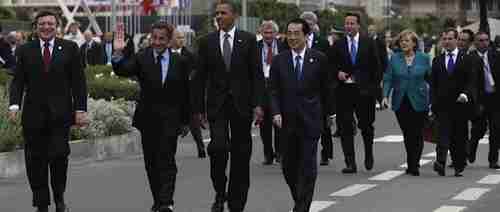 |
The IMF has warned that countries with pro-democracy uprisings in the Mideast and northern Africa will need more than $160 billion in international aid over the next three years.
In addition, to the $20 billion from the G-8 countries, there would be $10 billion from Gulf Arab states and $10 billion in bilateral aid to Tunisia and Egypt, according to the Guardian.
Jalloul Ayed, Tunisia's finance minister, is very satisfied with the results. "We are truly very satisfied with the very strong, clear and precise statements proffered by all of the G8 nations, and the financial institutions. It's very clear that everybody wants to help us."
I think Ayed shouldn't get his hopes too high. The "wealthy" G-8 countries are the United States, Canada, Germany, France, Great Britain, Italy, Japan and Russia. They and other countries have some variation of one of these summit meetings every couple of months, and there are always lots of promises. But once the meeting ends, the pledges are all but forgotten.
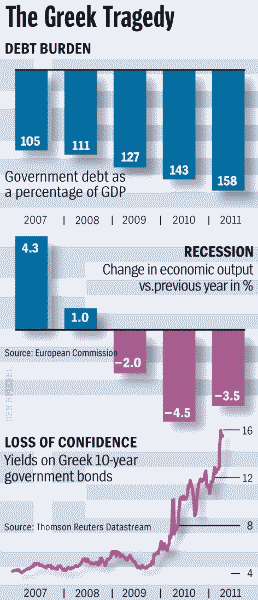 |
We're now going to turn to the G-8's (non-) actions on Greece. But as we do so, remember that almost everything that any politician has said in the past year about Greece's debt problem has been a total lie. Also, recall that Eurogroup chairman Jean-Claude Juncker recently was quoted as saying, "When it becomes serious, you have to lie," as we reported recently.
Well, things are VERY serious right now, so we have to assume that politicians are going to be lying like mad.
I was amused on Thursday to hear a sound byte on TV from Greece's Socialist party Prime Minister George Papandreou saying something like the following at a press conference: "Please, just leave us alone to work. We're perfectly capable of getting ourselves out of this situation. Just leave us alone to work." I was scratching my head wondering whether by "leave us alone," he meant, "don't give us any more bailout money." But no, I'm sure what he meant was, "stop asking us embarrassing questions that we have no answer for, and just give us the money already."
Well, there are big problems looming. Greece is scheduled to receive 12 billion euros on June 29 as the next tranche in last year's EU bailout commitment, and that money will be needed immediately for Greece to make it's next payment on its bonds, according to the BBC.
Now, everybody knows that this money will just go down the drain, and Greece will be no better off when the next bond payment is due. The IMF's share of the 12 billion euros is 3.3 billion euros, and the IMF is committed to not paying its share unless an audit proves that Greece will be solvent by 2012, which it will not be.
So in an effort to apply pressure to Greece, Jean-Claude Juncker has said that the IMF was assuming that if it decided not to make the 3.3 billion euro payment, then the EU would step in and make it instead. But Juncker added that countries such as Germany, Finland and the Netherlands would oppose that, and such a payment would have to be approved unanimously by all eurozone countries.
Therefore, Juncker concluded, the Greeks had better put in much harsher austerity measures. However, Papandreou's Conservative party opposition is refusing to go along with harsher austerity measures, saying that they would "flatten the Greek economy and destroy Greek society."
And besides, the argument goes, why bother to suffer if we're just going to default a little later anyway?
It's widely believed that a Greek debt default would have worldwide consequences. If Greece defaulted, then there would be a domino effect on Ireland, Portugal, Spain, Italy and Belgium, and one or more of them would probably default as well, putting pressure on the entire euro currency.
Now that the G-8 has failed to come up with anything, and with the June 29 deadline looming, analysts that I heard were predicting either of two possibilities:
The second possibility is somewhat disturbing, because it could happen at any time. Tomorrow even. In the meantime, officials will continue to say that nothing will happen, until it happens.
And so, another G-8 meeting has passed. The leaders have made some promises that probably won't be fulfilled, and they've pretended that the really serious problems don't exist. That's emblematic of our times.
The G-8 meeting issued a resolution on the Mideast peace process that followed along the lines of President Barack Obama's speech of two weeks ago. However, because of strong insistence by Canada's Prime Minister Stephen Harper, statements about returning to 1967 borders were omitted from the resolution. Montreal Gazette
(Comments: For reader comments, questions and discussion,
see the 28-May-11 News -- G8 promises aid to Tunisia, Egypt, but fails on Greece's June 29 deadline
thread of the Generational Dynamics forum. Comments may be
posted anonymously.)
(28-May-2011)
Permanent Link
Receive daily World View columns by e-mail
Donate to Generational Dynamics via PayPal
U.S. State Department offers reward for Doku Umarov
This morning's key headlines from GenerationalDynamics.com.
In a new shock to economists, the number of Americans signing contracts to buy previously owned homes plunged 11.6% in April, far more than the 1% they had forecast. Since home sales are typically consummated about two months after a purchase contract is signed, we can expect actual home sales to fall a comparable amount in June. Politicians in Brussels, Athens and Washington have been refusing to face reality because they keep expecting the real estate bubble to return. Housing prices have already fallen from housing bubble highs only to year 2000 levels, but based on my own straightforward analysis, based on the Law of Mean Reversion, it's indicated that they'll continue to fall to 1985-1990 levels over the next ten years. Bloomberg
The U.S. Secretary of State has designated the Caucasus Emirate in Russia's North Caucasus provinces, as a terrorist organization. This action will help stem the flow of financial and other assistance to the group. U.S. State Dept.
In addition, the State Dept. has authorized a reward of up to $5 million for information leading up to the capture of Doku Umarov, the senior leader and operational commander of the Caucasus Emirate. The stated goal is to establish an Islamic emirate through violence in the North Caucasus, Southern Russia, and Volga regions of the Russian Federation, with Umarov as its Emir. U.S. State Dept.
Russia welcomed the move. President Medvedev's envoy Anatoly Safonov said, "Washington’s decision can be assessed only positively. It is well-timed and quite prompt. This is a contribution to the joint efforts in the fight against terrorism. This is a signal that Russia and the U.S coincide in assessments and approaches. It can be said that there are no discrepancies in these assessments at present." Jamestown
Millions of people in Russia's middle class, mostly the best and the brightest, are fleeing the Russian Federation in increasing numbers, mostly to live in Europe or America. According to one estimate, 1.25 million Russians have left in the last three years, almost as many as what took place "after the October coup in 1917 when about two million people left" Russia. They're leaving because opportuntities have declined, while "administrative pressures have increased." They feel a "lack of a future," and that, unlike a decade ago, there is no light at the end of the tunnel but only more darkness. Paul Goble
South Korea lost out to Russia in the competition to hold the Winter Olympics in 2014, but it's continuing to build facilities for such a competition, in the hope that the Russian games in Sochi will have to be canceled. Ethnic violence continues to increase in Russia's North Caucasus provinces, and the political impact of the Circassian genocide in 1864 is increasing. However, the rights to the Olympiad could be taken away from Russia and given to Korean only if the Russians failed to build all the venues on time, or if the region became too unstable. Paul Goble
On Friday, air force combat jets bombed tribal forces in towns east of the capital Sanaa in Yemen. There were explosions in the neighborhood of Sheikh Sadeq al-Ahmar, the leader of the powerful al-Hashid tribe. Al-Ahmar used to be an ally of Yemen's president Ali Abdullah Saleh, but finally turned against him as the pro-democracy protests continued, and government security forces became more violent. CNN
A roadside bomb targeting UN peacekeepers exploded in south Lebanon, wounding six, two seriously. The UN Interim Force in Lebanon (UNIFIL) was created after the 2006 war between Israel and Hizbollah in Lebanon, with the purpose of preventing a recurrence of the war. AFP
Algeria is openly supportive of Gaddafi in Libya's conflict with the Nato humanitarian mission. Libyan rebels have accused Algeria of providing military equipment, weapons and mercenaries to Gaddafi, though the Algerians deny this. There are three reasons why Algeria is supporting Gaddafi: (1) Fear that an unstable Libya could turn into an al-Qaeda safe haven. (2) Fear that a rebel victory in Libya could spread to Algeria. (3) Fear that Algeria will lose influence in the region, if it were governed by the rebels rather than Gaddafi. The article makes note of a generational concept: "It is likely that memories related to the violence of the civil war [in Algeria] are still too recent and represent a powerful deterrent to a full-scale revolt." Algeria's last crisis civil war climaxed in 1962. Jamestown
Germany legalized prostitution in 2001, but it's taboo to talk about it too much. There are millions of men buying sex, though few will admit it, and using sex as a business perk or incentive has become increasingly common. Corporate sex orgies have grown in popularity. Spiegel
Researchers looking for a biotechnological breakthrough that can produce a new Green Revolution in the 2020s may have found it, at least for tropical regions: mycorrhizal fungi. Scientists have discovered a way of producing large quantities of the fungus, and when applied to plants, cut the need for fertilizers in half. Science Daily
(Comments: For reader comments, questions and discussion,
see the 28-May-11 News -- G8 promises aid to Tunisia, Egypt, but fails on Greece's June 29 deadline
thread of the Generational Dynamics forum. Comments may be
posted anonymously.)
(28-May-2011)
Permanent Link
Receive daily World View columns by e-mail
Donate to Generational Dynamics via PayPal
The politics of European Union membership for Serbia
Even though 16 years have passed since the end of the Bosnian war, many Serbs still consider Ratko Mladic to be a war hero who saved Serb lives during the Bosnian war that ended in 1995. Hundreds of protesters clashed with police in Novi Sad, according to B92 (Serbia), as well as in other cities, to protest Thursday's arrest of Mladic. Elsewhere protesters chanted "Rise up Serb" and "The wing may be broken but the fight will be remembered," according to AP.
However, outside of Serbia, Mladic is considered to be a war criminal for the atrocities he committed in the massacre at Srebrenica, considered by many to be the worst war crime since the Holocaust of World War II. The Europeans are cheering his capture as much as Americans cheered the killing of Osama bin Laden.
For the most part, the East European crisis wars have been between two great civilizations: The Orthodox Christian civilization and the Muslim civilization. These wars have been fought not only in the Balkans, but also farther east in the Crimea and in the Caucasus. In the Balkans, there is a third great civilization, the Western Christians, represented by largely Roman Catholic Croatia.
World War I was triggered when a Serb high school student assassinated Austrian Archduke Franz Ferdinand on June 28, 1914 in Sarajevo. The spreading war led to the Bolshevik Revolution in Russia, and the destruction of the Ottoman Empire.
From the point of view of Generational Dynamics, the next Balkans war began pretty much right on time -- in 1992, just 78 years after the assassination of Archduke Ferdinand, and 70 years after the final collapse of the Ottoman Empire.
The Siege of Sarajevo was directed by Serbian president Slobodan Milosevic, and was executed by his two generals, Ratko Mladic and Radovan Karadzic. Milosevic was captured in 2001, and died in his cell in 2006. Karadzic was captured in 2008, and is still being tried in The Hague on genocide charges.
The Orthodox Christian Serbs completely blockaded the city of Sarajevo, allowing no one to get out, or any supplies to get in. They then shelled the Muslim civilians in the city, and Serb soldiers went from one neighborhood to another committing horrendous atrocities.
In her book, World on Fire, here's how author Amy Chua describes the Bosnian war: "In the Serbian concentration camps of the early 1990s, the women prisoners were raped over and over, many times a day, often with broken bottles, often together with their daughters. The men, if they were lucky, were beaten to death as their Serbian guards sang national anthems; if they were not so fortunate, they were castrated or, at gunpoint, forced to castrate their fellow prisoners, sometimes with their own teeth. In all, thousands were tortured and executed."
The Bosnian War climaxed in 1995 when tens of thousands of Bosnian Muslims had taken refuge in the Bosnian town of Srebrenica, supposedly a "United Nations Safe Area." The Serbs massacred thousands of Muslim men in what has become known as the Srebrenica massacre. (See "Srebrenica massacre: Survivors commemorate."
In July, 1995, the Bosnian Serb army claimed that the Muslim army was hiding out in Srebrenica, and began shelling the town. The Serbs distributed candy to the children as a trick to separate the men from the women and children. 23,000 women and children were bussed away, while the men were held in trucks and warehouses. By the time it was over, 7,000-8,000 men were massacred. 100,000 were killed during the entire war.
Mladic faces 15 counts, including genocide, crimes against humanity and violation of the laws of war in Bosnia-Hercegovina between April 1992 and July 1995, according to BBC.
What has particularly infuriated Mladic's supporters is that Serbian President Boris Tadic cooperated in the capture of Mladic, and did so for purely political reasons -- to satisfy the demands of Brussels for Serbia to join the European Union.
Thus, French President Nicolas Sarkozy is quoted by the Guardian as saying, "[It's] a very courageous decision by the Serbian president. It's one more step towards Serbia's integration one day into the European Union."
President Tadic may be a hero to European officials, but to many in Serbia itself, he's comparable to the "Ustashas" - the Croat Nazis who sided with Hitler and betrayed the Serbs in World War II.
(Comments: For reader comments, questions and discussion,
see the 27-May-11 News -- Europe cheers the capture of Ratko Mladic, the butcher of Srebrenica
thread of the Generational Dynamics forum. Comments may be
posted anonymously.)
(27-May-2011)
Permanent Link
Receive daily World View columns by e-mail
Donate to Generational Dynamics via PayPal
Egypt will permanently reopen Gaza border crossing
This morning's key headlines from GenerationalDynamics.com.
 |
In further moves to end military and intelligence cooperation with the United States, Pakistan has told the U.S. to cut back its troops in the country, and is closing three military liaison centers, setting back U.S. efforts to eliminate Taliban and al-Qaeda sanctuaries in Pakistan's tribal areas. Pakistan has become increasingly nationalistic and anti-American since the military operation that killed Osama bin Laden. LA Times
It's Friday again, and time for massive new protests in Syria following midday prayers. The protests are eviscerating Syria's economy, as billions of dollars in projects by investors in Gulf nations are being shut down. Daily Star (Lebanon)
Egypt has announced that it will permanently reopen the Rafah border crossing between Egypt and Gaza on Saturday, allowing regular pedestrian traffic. Israelis have objected, saying that the open border will allow weapons to be smuggled into Gaza. Jerusalem Post
With the border crossing opening, Palestinian Investment Fund (PIF) is launching a $1 billion fund to invest in the reconstruction of Gaza Strip. Plans are to build an airport, seaport, water desalination plants and an expanded electric network. Arab News
Mass demonstrations are planned for Friday in Cairo Egypt's Tahrir Square, and it's being called "the second revolution demonstration," because of activist impatience with the speed of governmental change. The Muslim Brotherhood is officially staying out of the protests but the Muslim Brotherhood's young guard will participate. Haaretz
News you can use: Don't bother buying your wife or girlfriend flowers...she'll only think you're cheating. Daily Mail
(Comments: For reader comments, questions and discussion,
see the 27-May-11 News -- Europe cheers the capture of Ratko Mladic, the butcher of Srebrenica
thread of the Generational Dynamics forum. Comments may be
posted anonymously.)
(27-May-2011)
Permanent Link
Receive daily World View columns by e-mail
Donate to Generational Dynamics via PayPal
Thaksin Shinawatra's sister may become prime minister
Thailand's politics have certainly been colorful, both figuratively and literally. And now the next exotic comedy scene is occurring. As Thailand approaches elections on July 3, the opposition Pheu Thai party is putting up the beautiful Yingluck Shinawatra for prime minister.
 |
Yingluck is the sister of former PM Thaksin Shinawatra, who was toppled in an army coup five years ago. He is currently in exile to avoid a two-year jail term for graft, according to Reuters.
Thailand's last last generational crisis war was the bloody Cambodian "killing fields" civil war, followed by the Vietnamese invasion of Cambodia, in the late 1970s.
This war split Thailand along its traditional fault line: The fair-skinned Thai-Chinese, market-dominant minority living mostly in Bangkok and to the south; and the vast majority, the poor dark-skinned indigenous Thai laborers, mainly from farms in Thailand's north and northeast.
The fault line between the classes has turned into the now-famous rallies between the "yellow shirt" élites and the "red shirt" laborer class. In particular, this led to the bloody massacre of red shirts in Bangkok last May, leaving behind an enormously bitter class division. (See "24-May-10 News -- Les Miserables of Thailand at a turning point.")
The massacre followed nearly a decade of game-playing at the national level. Thaksin Shinawatra, the hero of the "red shirt" indigenous Thai class, became prime minister in 2001, and was reelected in 2005. With the red shirts having three times the population of the yellow shirts, it was obvious that they were going to win every election. Thaksin was overthrown in 2006 by the army. Thaksin's party won the next election, but the winner was removed from office because he had hosted a cooking show on TV. (Really!) Another Thaksin ally won the next election, but he was forced from office by large "yellow shirt" rallies. Along the way, the courts ruled that other Thaksin allies should be banned from office.
The élites finally got one of their own elected, prime minister Abhisit Vejjajiva, in the Democrat Party.
But now it's time for another election, and the Pheu Thai party is putting up Thaksin's sister Yingluck as their candidate!! Who could make this stuff up?
It promises to be a very unpleasant campaign. The general secretary of the Democrat Party has said that Yingluck is not a real candidate, and has accused three other senior members of the Pheu Thai party of terrorism, according to the BBC. Pheu Thai party leaders have filed a complaint with the Crime Suppression Division, accusing the Democrat Party leaders of defamation under the Criminal Code, according to the Bangkok Post. They've also asked the Election Commission to dissolve the Democrat Party.
Ever since Yingluck has gotten into the race, the Pheu Thai party has been rising in the polls, and there's a chance that the party will gain enough seats in Parliament to have a governing majority.
What's interesting about this situation from the point of view of Generational Dynamics is that it's possible to see in real time how a country moves from one civil war to the next one, decades later.
After the last war ended in 1979, Thailand went through a generational Recovery era and part way through an Awakening era with the war survivors trying to guarantee that there would never be another war. But starting about five years ago, the young "yellow shirt" élite minority began taking steps to take power away from the "red shirts," eventually leading to violence in Bangkok last year.
The typical pattern is that there are alternating periods of violence and peace, with each period of violence worse than the previous one, until finally there's full scale war after a few decades.
If Yingluck's party gains a governing majority, then the Thai-Chinese élites will not tolerate it this time, any more than they did the last time. In particular, they will not tolerate the sister of Thaksin Shinawatra to govern. This will surely lead to another round of political conflict, followed by real violence.
The possible victory of Yingluck Shinawatra is a fascinating development, but it portends real ethnic conflict in the "Land of Smiles."
(Comments: For reader comments, questions and discussion,
see the 26-May-11 News -- Thailand election portends more ethnic clashes
thread of the Generational Dynamics forum. Comments may be
posted anonymously.)
(26-May-2011)
Permanent Link
Receive daily World View columns by e-mail
Donate to Generational Dynamics via PayPal
Tribal violence in Yemen spreads outside the capital Sanaa
This morning's key headlines from GenerationalDynamics.com.
Some analysts are comparing Greece's Prime Minister George Papandreou to the mythical Sisyphus, because every time he does something to try to reduce Greece's debt, he has to start all over again. EuroIntelligence
Europe's financial crisis continues to grow, as bitter disagreements surface about whether to allow any kind of Greek debt default, and whether such a default would have catastrophic effects, as European Central Bank (ECB) officials are predicting. Moody's Investors Service warned that a Greek restructuring could have a domino effect, leading to downgrades elsewhere. "The full impact on Europe's capital markets would be hard to predict and harder still to control. The fallout would have implications for the creditworthiness [and hence the ratings] of issuers across Europe," Moody's said. Wall Street Journal (Access)
The unforeseeable consequences of a Greek default are causing bitter fights within Greece as well. One of EU's conditions for a bailout was a consensus about austerity measures from Greece's political parties, but consensus is getting harder and harder to find. The reason is that more and more people believe that austerity measures are useless, since Greece is going to default anyway. According to one analyst, "The Eurogroup is caught on the horns of a dilemma. It has no power to threaten Greece because not paying the financial aid would have unforeseeable consequences for all the parties concerned." CNBC
Explosions from heavy shelling can be heard across town in the south of Sanaa, Yemen's capital, indicating that the conflict is now using heavier weapons than the machine guns and the mortars of the last few days. A full scale civil war may have already begun. Residents of Sanaa are now fleeing the city with their belongings, not believing that any part of the city is safe. The tribal violence pits the forces of president Ali Abdullah Saleh against his former ally, Sadiq al-Ahmar, head of the powerful Hashid tribe. Al-Jazeera
The U.S. State Department on Wednesday ordered nonessential diplomats to depart Yemen, and urged all Americans to leave, as security conditions deteriorated. AP
At his press conference with President Obama on Wednesday, British PM David Cameron confirmed a continued heavy U.S. role in Libya:
"In terms of the U.S. role, I would make this point, which I'm not sure is widely understood in Britain or in Europe — is already a huge number of the sorties and the support and the air assets that are actually bringing the pressure to bear are U.S. assets. There was this enormous effort at the beginning, as the president said, but also a sustained amount of assets that have been used.And as the president said, there are also the unique assets and capabilities that the U.S. has that others don't have that are so vital. And as he said, we all have to ask what is it that we can all do to make sure the pressure is really brought to bear. That is what the British are doing, the French are doing, the Americans are doing. And I know we'll discuss this in the margins of the G8."
Turkey's Prime Minister Tayyip Erdogan has been supporting Syria's president Bashar al-Assad, with the objective of helping Assad reach a peaceful settlement with the protesters. But now, after three months of "backing a regime which shoots to kill Muslims in the street," and with the number of Syrian deaths rising past 1100, Erdogan is changing policies, and is now actively opposing Assad. Most troublesome is Assad's repression of Kurdish regions in northern Syria, resulting in ferment among the Kurds of southern Turkey. Unless this repression stops immediately, Turkey will take overt action. Debka
The recent resolution by Georgia's parliament, which passed by a vote of 95 to 0, recognizing the mass killings and deportations of Circassians from the North Caucasus in the nineteenth century as "genocide," is bring applause from the Circassians in the province of Kabardino-Balkaria. Estimates are that the bloody and prolonged war between the Russian empire and the Circassians exterminated or deported some 90% of the Circassian population. The war climaxed in 1864 with a victory parade in Sochi by the Russians. The Winter Olympics will be held in Sochi in 2014, on the 150th anniversary of the conflict, and the genocide claims are becoming increasingly important as the Olympics games approach. Jamestown
(Comments: For reader comments, questions and discussion,
see the 26-May-11 News -- Thailand election portends more ethnic clashes
thread of the Generational Dynamics forum. Comments may be
posted anonymously.)
(26-May-2011)
Permanent Link
Receive daily World View columns by e-mail
Donate to Generational Dynamics via PayPal
Netanyanu receives warm reception in Congress
America was always a religious nation, but prior to WW II, America was really a Protestant nation, and was fairly hostile to Jews and Catholics, according to historian William G. McLoughlin. (See my 2006 article, "President George Bush talks about a 'Third Awakening,' but he has his history wrong.")
 |
Two major world events changed this about America: the victory of the godless Communists in the Bolshevik Revolution in Russia in 1917, and then the shock and horror of the Holocaust after WW II. The creation of the state of Israel in 1948 provided a link between conservative Evangelical Christians and Jews, and allowed a common front with Catholics as well to make defense of Israel the symbol of religious pluralism in America by the time of America's generational Awakening era in the 1960s. Jewish writer Will Herberg is quoted in 1955 as saying, "to be a Protestant, a Catholic, or a Jew are today the alternative ways of being an American."
In his speech to both houses of Congress on Tuesday, Israel's prime minister Benjamin Netanyahu tapped into these emotions, and sought to emphasize that Arabs across the Mideast "Arab Awakenings" are beginning to experience the same thing:
"Israel has no better friend than America. And America has no better friend than Israel. We stand together to defend democracy. We stand together to advance peace. We stand together to fight terrorism. Congratulations America, Congratulations, Mr President. You got bin Laden. Good riddance!In an unstable Middle East, Israel is the one anchor of stability. In a region of shifting alliances, Israel is America's unwavering ally. Israel has always been pro-American. Israel will always be pro-American. ...
Support for Israel's security is a wise investment in our common future. For an epic battle is now unfolding in the Middle East, between tyranny and freedom. A great convulsion is shaking the earth from the Khyber Pass to the Straits of Gibraltar. The tremors have shattered states and toppled governments. And we can all see that the ground is still shifting. Now this historic moment holds the promise of a new dawn of freedom and opportunity. Millions of young people are determined to change their future. We all look at them. They muster courage. They risk their lives. They demand dignity. They desire liberty."
Netanyanu's speech was warmly received by Congress, and he received dozens of standing ovations.
In terms of the actual content of the speech, it was Netanyahu's turn to take a hard line, following the lead of President Barack Obama in Thursday's speech last week. In fact, Netanyahu took the most extreme hardline position on every issue. There would be no 1967 borders, no right of return for refugees' descendants, no compromise on East Jerusalem settlements, no withdrawal of Israeli troops from the West Bank, and no negotiations with a Hamas government. And the Palestinians would have to recognize Israel as a Jewish state.
Responses from Palestinians were equally hard line.
Palestinian negotiator Saeb Erekat said that Netanyahu's speech indicated how unwilling the Israeli leader was to make peace, according to Al-Jazeera:
"We've not heard any new words in Netanyahu's speech in front of congress tonight. He's chosen to dictate, not negotiation.He can make peace with congress, but at the end of the day in terms of everything he said tonight he has proven that we don't have a partner for peace in Israel. ...
Reconciliation with Hamas is our number one priority and those who want a two-state solution, who want peace, must know the way to that must go through reconciliation."
Nisreen El-Shamayleh, Al Jazeera's correspondent in Ramallah, said that Netanyahu's demands would be seen by Palestinians as asking far too much:
"Netanyahu says he wants to negotiate, but as far as Palestinian officials are concerned there isn't much to negotiate about.He doesn't want to withdraw to 1967 borders, he wants to retain major settlements, he wants to keep Jerusalem as the undivided capital of Israel and he wants the Palestinians to declare that they relinquish the right of return ... and recognise Israel as a Jewish state."
Erekat seemed particularly unhappy about Netanyahu's saying that the Palestinians would have to recognize Israel as a "Jewish state." He said that this was a "new condition," and implied that it was a trick to deny the right of return to Palestinian refugees.
We now have maximally hardline positions on all sides. This is the outcome I was fearing as soon as I heard Obama's speech last Thursday.
What we're witnessing very dramatically is what happens in a generational Crisis era. Whereas the 1990s Unraveling era was a time of maximum compromise, with the Silent generation of WW II survivors still in charge, today we're approaching a time of maximum confrontation, with Boomers and Gen-Xers in charge.
A couple of days ago, I wrote that Israel is playing out a generational Crisis era script in an extremely panicked form. The danger is that, even if Israel survives the approaching Crisis era war, it may not survive the subsequent Recovery era, if the United Nations, or its next incarnation, decide that Israel is at fault for starting the war. This would be a kind of "mirror image" of the action taken in 1948 in creating Israel.
A couple of web site readers asked me what Israel could be doing differently. I don't know the answer to that question, but I can suggest one possibility:
OBAMA: Israel must accept the 1967 borders with agreed upon land swaps.NETANYAHU: That's fine, Mr. President. Let's agree on the 1967 borders with land swaps, and let's discuss what land swaps you have in mind that will guarantee Israel's security.
EREKAT: Only the tiniest land swaps will be considered. The unmodified 1967 borders are sacrosanct.
In this template, Netanyahu is the agreeable one and Erekat is the villain, not vice-versa.
If I'm not mistaken, this is the kind of technique that Israel used in peace talks in the 1990s, with the result that the Palestinians were always blamed for the collapse of peace talks. If the Palestinians could not agree to a peace plan in the 1990s, then they won't agree today.
(Comments: For reader comments, questions and discussion,
see the 25-May-11 News -- Palestinians slam Netanyahu's speech to Congress
thread of the Generational Dynamics forum. Comments may be
posted anonymously.)
(25-May-2011)
Permanent Link
Receive daily World View columns by e-mail
Donate to Generational Dynamics via PayPal
Tribal warfare in Yemen enters second day
This morning's key headlines from GenerationalDynamics.com.
Pakistan media are reporting that China has issued an ultimatum to Washington that "Any attack on Pakistan would be construed as an attack on China." Saying that "US, Pakistan near open war," the reports say that the ultimatum was a demand that the US respect Pakistan's sovereignty in the aftermath of the bin Laden operation. This ultimatum was reportedly delivered at the May 9 China-US strategic dialogue and economic talks in Washington. Pakistan Tribune.
In today's main article, I discussed how positions have hardened substantially in the last week between the Palestinians and Israelis, and that this hardening is going to continue. This is characteristic of generational Crisis eras. In the case of Pakistan, the success of American's violation of Pakistan's sovereignty was a great shock to them, and the anger appears to be growing.
Positions are hardening in India, as well. India's Defence Minister A K Antony said that the killing of bin Laden was "a watershed in the global war on terror," and that, "the ripples of this event will have wide ranging impact on our strategic neighbourhood." He added that finding bin Laden in Abbottabad, deep inside Pakistan, has "internationally stamped Pakistan’s position as the core of terrorist activities in the region." Outlook India
A suicide car bomber struck a police facility in an army cantonment in Peshawar, in Pakistan's northwest, early Wednesday. One person was killed, and 14 injured, in the latest attack, only a couple of days after a major 18-hour attack on a naval base in Karachi. Tehrik-e-Taliban Pakistan (TTP), Pakistan's Taliban terrorist group, is assumed to be the perpetrator again, although no one has yet taken credit. AP
Hundreds of tribesmen loyal to Sadiq Ahmar, head of the powerful Hashid tribe, are in open warfare with the security forces of President Ali Abdullah Saleh, who is refusing to step down despite massive anti-government demonstrations. It's feared that the clashes of the last two days could spiral into worse violence, or full scale civil war. LA Times
An explosion at Iran's largest and oldest oil refinery killed at least four people and injured 25 during a visit by President Mahmoud Ahmadinejad to inaugurate an upgrade at the sprawling plant. Sabotage or an assassination attempt on Ahmadinejad's life are suspected, but state media says it was an accident caused by a gas leak. Either way, the explosion is highly embarrassing to the regime. The National (UAE)
 |
France's Finance Minister Christine Lagarde plans to announce on Wednesday her candidacy to be the new had of the International Monetary Foundation (IMF), following the resignation of Dominique Strauss-Kahn, who is embroiled in a criminal sex scandal. Sources say that the EU has reached a consensus supporting Lagarde. Reuters
Crazy idea of the week: Utah legislators want to make Utah the first state in the country this month to legalize gold and silver coins as currency. One banker plans to offer a debit card that will be backed by the user's gold and silver coins. AP
A poll by Boston's Suffolk University finds that network news is dying, and that Fox News Channel is the most trusted news source. Fox's Bill O'Reilly came out on top as the most trusted individual. U.S. News
 |
Armenia and Azerbaijan are bitter enemies, technically still at war, even though a cease-fire agreement was signed in 1994, leaving the disputed Nagorno-Karabakh territory unresolved. But now Armenians are facing a major new problem, after Azerbaijan won this year's glitzy Eurovision pop music competition, meaning that next year's competition will be held in its capital, Baku. The dilemma has split Armenians, some of whom say that Armenians cannot compete in Baku, and others who say that competing is a matter of national honor. Eurasia Net
(Comments: For reader comments, questions and discussion,
see the 25-May-11 News -- Palestinians slam Netanyahu's speech to Congress
thread of the Generational Dynamics forum. Comments may be
posted anonymously.)
(25-May-2011)
Permanent Link
Receive daily World View columns by e-mail
Donate to Generational Dynamics via PayPal
Tobin's Q and Shiller's CAPE show market overvalued by 60-75%
There was a pall over the usually bubbly financial analysts on Monday. It's not that I heard anyone say that financial disaster was imminent, though some hinted at that. It's that pretty much everyone I heard was painting an ominous picture, especially over what's been happening in Europe.
 |
And the bad news just poured out of Europe:
Papandreou's government though appeared to be getting panicky on Monday. According to Kathimerini, the government finally approved the first wave of privatizations, after stalling for months. As far as I can tell, it's not a big deal: Greece will sell a 10% stake in the phone company and a 17% stake in the power company, as well as a 34% stake in the post office, all by the end of the year. I'm guessing that this won't require in any public sector layoffs.
At any rate, the bond market wasn't impressed with the announced privatizations: The yields (interest rates) on Greece's two-year notes rose another 0.6% to 26.1%.
So Fitch pointed out that Belgium has the euro area's third-highest debt load, and the political deadlock makes it unlikely that they'll be able to reduce it.
But it's not the change in government that's bothering investors about Spain. It's the fact that the huge, angry anti-government protest vote means that Zapatero's austerity program will be curtailed, and that means that Spain could be on its way to default, just like the other countries.
Judging from commentary I heard on Monday, a lot of people expected Greece to default over the weekend. That didn't happen, but several people were saying that Greece could default any day now, and if not, Greece would still have to default within two years at the most.
Europe isn't the only place with economic troubles. China's National Economic Accounting and Economic Growth Research Center issued its annual report on China's economy, and found that China is faced with both inflationary pressure and the risk of sluggish growth. China needs to prevent stagflation by controlling the gross unbalance in the current stage, according to the report. Xinhua
The S&P 500 Price/Earnings ratio is currently at 16.58, according to the Wall Street Journal, well above the historical average of 14, and indicating that the market is way overpriced. I've written about this many times. (See "6-May-11 News -- Crash of silver prices may signal further market plunge.")
The web site of the UK firm Smithers & Co. provides information about two other indexes.
Tobin's q ratio is computed by dividing the market value of a company (as determined by stock prices) by the replacement value of the book equity. Robert Shiller's CAPE (cyclically adjusted P/E) is considered by some to be more accurate than the traditional P/E ratio.
The graph at the top of this report show the q and CAPE indexes up to December 31,2010. At that date the S&P 500 was at 1257.6 and US non-financials were overvalued by 70% according to q. Quoted shares, including financials, were overvalued by 63% according to CAPE. As at 10th March, 2011 with the S&P 500 at 1295.11 the overvaluation by the relevant measures was 75% for non-financials and 68% for quoted shares.
These figures are consistent with my own computations, based on historical technological forecasting trends. (See my Dow Jones historical page.)
Stocks fell sharply on Wall Street on Monday, and investors are blaming it mainly on the debt crisis in Europe, according to AP. The European debt crisis just goes on an on, and officials can only hope that the credit bubble will return and all the debt will disappear. Generational Dynamics tells us that there'll be a major financial crisis long before that happens.
This has certainly been, and continues to be, one of the most amazing times in history.
(Comments: For reader comments, questions and discussion,
see the 24-May-11 News -- Multiple financial crises in Europe affecting stock prices
thread of the Generational Dynamics forum. Comments may be
posted anonymously.)
(24-May-2011)
Permanent Link
Receive daily World View columns by e-mail
Donate to Generational Dynamics via PayPal
Pakistan in shock again over attack on Karachi naval base
This morning's key headlines from GenerationalDynamics.com.
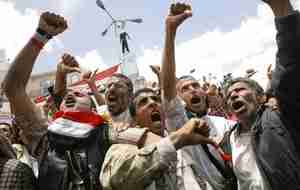 |
Full scale tribal warfare appears to be breaking out around Sanaa, the capital of Yemen, on Monday, as security forces loyal to President Ali Abdullah Saleh fought gun battles with Yemen's most powerful tribe, the Hashid tribe. After months of protests that have become increasingly violent, the Gulf Cooperation Council (GCC), in conjunction with the U.S., had been negotiating with Saleh to step down. On three occasions, most recently on Sunday, he had verbally agreed to step down, but then reneged at the last minute. As a result, the GCC mediators have given up and gone home. This triggered the clashes with the Hashid tribe, and local news reports suggest that thousands more Hashid tribesmen were attempting to enter the city to participate. LA Times
Once again, Pakistanis are facing the shocked realization that the country's armed forces seem unable to protect the country's people. The armed forces and intelligence services were infuriated and humiliated by the U.S. action that killed Osama bin Laden, since they apparently didn't know that bin Laden was there and they apparently didn't detect the military action until it was over. But even so, Sunday's terrorist attack on a the PNS Mehran naval base in Karachi showed that they can't even protect themselves. 10 Pakistani security personnel were killed, and two important aircraft were destroyed. Indications are that the militants have insider information that allowed them to succeed. Dawn and LA Times
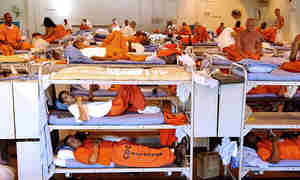 |
The U.S. Supreme Court ruled that California must remove tens of thousands of inmates from its prison rolls in the next two years. State officials hope to avoid setting any criminals free, but with the state near bankruptcy, the required money may not be available. LA Times
With the humanitarian military action in Libya dragging on for over two months, France and Britain are planning to shift tactics by deploying attack helicopters to strike Muammar Gaddafi's forces. The helicopters will permit more precise strikes against military assets in urban areas. AFP
(Comments: For reader comments, questions and discussion,
see the 24-May-11 News -- Multiple financial crises in Europe affecting stock prices
thread of the Generational Dynamics forum. Comments may be
posted anonymously.)
(24-May-2011)
Permanent Link
Receive daily World View columns by e-mail
Donate to Generational Dynamics via PayPal
The survival of Israel in a generational Crisis era
President Barack Obama gave a new Mideast policy speech on Sunday, in order to mend fences following the aftershock of his speech on Thursday. Whereas his Thursday speech was clearly designed to please the Palestinians and anger the Israelis, his new speech takes a more middle of the road approach, and will clearly anger both sides. Thus, each side can point to reasons why Obama likes them or hates them, and so Washington has returned to business as usual.
 |
The event was an election fundraising speech to the pro-Israel group American Israel Public Affairs Committee (AIPAC). Obama's reception was one of intense skepticism, according to the center-right (pro-Tory) Telegraph, who said, "Wagging his finger repeatedly, Mr Obama adopted the manner of a schoolmaster frustrated that his pupils were too dim or inattentive to pay attention to what he had said."
Obama told them many things that they wanted to hear. He condemned the Hamas-Fatah unity agreement, he criticized Hamas for not recognizing Israel's right to exist, he said that Israel's security is sacrosanct, and he said that the United Nations can't solve this, referring to the Palestinian plan to create a state of Palestine unilaterally in September.
But he also made it clear that he didn't really mean the pre-1967 borders that he appeared to be talking about on Thursday, but rather the pre-1967 borders after a number of agreed land swaps, large enough to guarantee Israel's security.
Palestinian and pro-Palestinian commentators that I heard pointed out that he didn't talk about the issues of Jerusalem or the "right of return" of the Palestinian refugees. One emphasized that a return to the pre-1967 borders was a non-negotiable demand, and that only very tiny land swaps would be permitted. The large land swaps that Obama appeared to be describing would put many Arabs into Israel, and that's not acceptable.
As far as I can tell from various comments, the Israelis are still very suspicious of Obama's motives and intentions, while the Palestinians are totally disgusted with his apparent complete cave-in to the Israelis in the Sunday speech.
What I found most interesting about his speech was the following passage:
"Here are the facts we all must confront. First, the number of Palestinians living west of the Jordan River is growing rapidly and fundamentally reshaping the demographic realities of both Israel and the Palestinian Territories. This will make it harder and harder — without a peace deal — to maintain Israel as both a Jewish state and a democratic state.Second, technology will make it harder for Israel to defend itself in the absence of a genuine peace.
Third, a new generation of Arabs is reshaping the region. A just and lasting peace can no longer be forged with one or two Arab leaders. Going forward, millions of Arab citizens have to see that peace is possible for that peace to be sustained.
And just as the context has changed in the Middle East, so too has it been changing in the international community over the last several years. There’s a reason why the Palestinians are pursuing their interests at the United Nations. They recognize that there is an impatience with the peace process, or the absence of one, not just in the Arab World — in Latin America, in Asia, and in Europe. And that impatience is growing, and it’s already manifesting itself in capitals around the world. ...
But the march to isolate Israel internationally — and the impulse of the Palestinians to abandon negotiations –- will continue to gain momentum in the absence of a credible peace process and alternative. And for us to have leverage with the Palestinians, to have leverage with the Arab States and with the international community, the basis for negotiations has to hold out the prospect of success. And so, in advance of a five-day trip to Europe in which the Middle East will be a topic of acute interest, I chose to speak about what peace will require."
This is an interesting generational analysis, provided by President Obama, to explain why a peace deal is required very soon, and why the Israelis have to change direction.
However, it's actually a generational analysis that explains why no peace deal is possible. Just because you understand the problem doesn't mean that a solution exists.
And that's the real irrationality of this situation. Obama understood that the existing "peace process," which really involves kicking the can down the road, cannot possibly work. And so, the youthful Gen-X president sat down with his advisors, and they came up with a new "peace process." But surely it must have occurred to them that the new "peace process" has no more chance of working than the old one. But perhaps the youthful Gen-X president and his advisers, who were once promising to heal the world, could not admit to themselves that the solutions to some problems are beyond their reach.
So what happens next? Generational Dynamics tells us that there will be a major new Mideast war, and that gives us a big advantage over most journalist, analysts and politicians, since at least we know where we're going to end up, and they have no idea.
There were many people who were furious at President Obama's speech on Thursday because it appeared to sell out the Israelis.
I was appalled by his speech, but for an entirely different reason. I don't care whom Obama seems to side with, because I know that a politician can neither cause nor predict what's coming -- in this case, an all out genocidal Mideast war. I couldn't care less what boundaries Obama recommends, because I know for certain, based on generational analysis, that those boundaries are just talk, and they won't be applied.
What I was appalled about is, perversely, that Obama's speech was too clear. Instead of obfuscating the issue of boundaries, which is what a politician is supposed to do, he clearly stated the problem in a way that would produce a backlash. And the backlash came in the form of a scolding by Israeli Prime Minister Benjamin Netanyahu. And now, Obama had to provide a rebuttal on Sunday, and Netanyahu will give a surrebuttal when he speaks to Congress on Tuesday. It's a dreadful chain of events.
A web site reader wrote on Sunday that it's important to watch what happens in Jordan. That's certainly true. Even though Jordan's government has had a long-time friendly relationship with the U.S., many of the people of Jordan are Palestinian refugees, and the country is a tinder box that might explode at any time. And a speech like the ones given recently might be the chaotic event that causes the chain reaction that triggers that explosion.
As important as Jordan is, I would have to emphasize the importance of Saudi Arabia itself. The rapidity of the recent "tectonic shift" that turned Saudi Arabia from a trusted ally to a potential enemy in only a few weeks is truly frightening. (See "21-May-11 News -- Saudi Arabia advances Gulf Cooperation Council, further cuts U.S. ties.") From the point of view of Generational Dynamics, such rapid changes in attitudes and behaviors indicate that the hostility to the U.S. is much deeper than previously believed, and that some kind of trigger has already occurred (i.e., the incident involving Mubarak). Because of Saudi Arabia's strategic importance as an oil producer and its position on the Persian Gulf, combined with Jordan's strategic relationship with Israel, it's possible that we'll be seeing more major shifts in the next few weeks.
Another web site reader wrote the following to me on Sunday, referring to this "tectonic shift":
"I think you should be working hard to figure this out. You are probably one of the only people on the planet that can get even close, and it would be a great boon to have some clarity on who is going to fighting who. I think you have enough analytical skill to come up with some actionable data that could be used to make yourself a bunch of money on the currency markets."
I am REALLY flattered to receive this comment, but Generational Dynamics doesn't provide anything close to that level of precision. I've never made any money from Generational Dynamics, and I doubt that I ever will, and I certainly don't have a clue about the Mideast currency markets.
But if that's asking too much, it's still appropriate to speculate, based on what we do know, and what we see happening.
If Jordan is joining the Gulf Cooperation Council (GCC), then it's reasonable to speculate that Jordan and the GCC countries will be on one side (the side that opposes Israel and the West). Since the Palestinian factions (Fatah and Hamas) are essentially enemies, does that mean that one or the other will be on Israel's side? Stranger things have happened.
I've said in the past that I believe that Egypt could go either way, based on generational reasons: The large majority of the Egyptian population is under 30, and they've never known Israel as anything but an ally. Despite some well-publicized rhetoric and anti-Coptic violence from Egyptian salafists, it's still my opinion that Egypt is more likely to be Israel's ally than Israel's enemy.
The key is always the phrase "forced to choose." It's easy to be anyone's friend or enemy, when all that's at stake is rhetoric. Stalin may have hated Britain and the United States with all his heart, but when he was "forced to choose" because the Nazis were invading, he chose the Allies. Egypt may well do the same. But once again, this all speculation, albeit informed speculation.
Beyond that, there are some other considerations. As I've discussed in the past with the 2006 invasion of Lebanon, and the recent response to the "invasion" by unarmed protesters, Israel is playing out a generational Crisis era script in an extremely panicked form.
There is a Mideast war coming that Israel may not survive. But if the Israelis continue on their current path, and the country DOES survive the Crisis era war, then Israel may not survive the Recovery Era, if the United Nations, or its next incarnation, decide that Israel is at fault for starting the war (just as most people in 1945 blamed Germany for starting BOTH WW I and WW II).
If the nation of Israel is going to continue to be in existence in the 2020s, in anything resembling its current form, then the Israelis and their defenders are going to have to become a lot more rational. Unfortunately I don't expect that to happen, and the irrational debate going on right now between Obama and Netanyahu over borders is a good example.
(Comments: For reader comments, questions and discussion,
see the 23-May-11 News -- Obama's new speech backs off on Thursday's Mideast policy announcement
thread of the Generational Dynamics forum. Comments may be
posted anonymously.)
(23-May-2011)
Permanent Link
Receive daily World View columns by e-mail
Donate to Generational Dynamics via PayPal
Italy joins other PIIGS countries with ratings downgrades
This morning's key headlines from GenerationalDynamics.com.
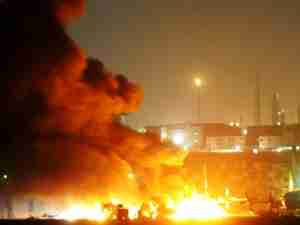 |
A well-planned professional terrorist attack was launched on the Pakistan's PNS Mehran naval base in Karachi, Pakistan, on Sunday evening. 12-15 militants attacked from three directions, and carried out simultaneous attacks on different targets. The militants also took some Chinese personel hostage in a building inside the base. Gunfire continued for hours. Dawn
The banned terrorist group, Tehrik-e-Taliban Pakistan (TTP), Pakistan's Taliban terrorist group, took credit for the attack. Intelligence reports had warned police and other security agencies that terrorist attacks were planned on army, navy and air force installations. Express Tribune (Pakistan)
The huge explosions and firefights sent a wave of panic and shock through the area. One such explosion destroyed a P-3 Orion aircraft, which the navy had recently acquired from the United States. This is Pakistan's premier anti-submarine attack aircraft. It was feared that a second aircraft was also subsequently lost. The News (Pakistan)
The assault on the Mehran naval airbase is the latest attack on Pakistan's military installations, and is raising fears about the safety of the country's nuclear arsenal. Pakistan has the fastest growing nuclear arsenal in the world and in a decade could pass France as the fourth-largest nuclear power, so such brazen attacks raise fears that al-Qaeda could acquire nuclear materials, or even a nuclear weapon. Reuters
In a surprise announcement on Saturday, S&P's rating service announced a decision to revise downward is outlook for Italy. Of the PIIGS countries (Portugal, Ireland, Italy, Greece and Spain), only Italy has escaped the full brunt of the euro zone debt crisis so far. S&P's move does not cause any immediate debt crisis for Italy, but it does make the country more vulnerable. Reuters
Exit polls indicate that Spanish Prime Minister Jose Luis Rodriguez Zapatero's Socialist party has suffered major losses in regional and local elections on Sunday. ( "22-May-11 News -- New 'Spanish Revolution' signals electoral change on Sunday") The elections have not ended the anti-government protests, which have now been continuing for eight days. Bloomberg
The Taliban's summer offensive was expected, but that doesn't make it any less violent. On Saturday, a suicide bomber killed six medical students in a major hospital in Kabul, and on Sunday, suicide bombers disguised as border policemen attacked a local government office in eastern Afghanistan, killing seven Afghans. VOA
(Comments: For reader comments, questions and discussion,
see the 23-May-11 News -- Obama's new speech backs off on Thursday's Mideast policy announcement
thread of the Generational Dynamics forum. Comments may be
posted anonymously.)
(23-May-2011)
Permanent Link
Receive daily World View columns by e-mail
Donate to Generational Dynamics via PayPal
EU official proposes forcing Greece to privatize
What started out as a small gathering last Sunday has ballooned into huge protests in Madrid's Puerta del Sol square, with tens of thousands of protests camped out, protesting austerity measures and government corruption. There were also large crowds in Barcelona, Valencia and smaller cities, according to TV Spain.
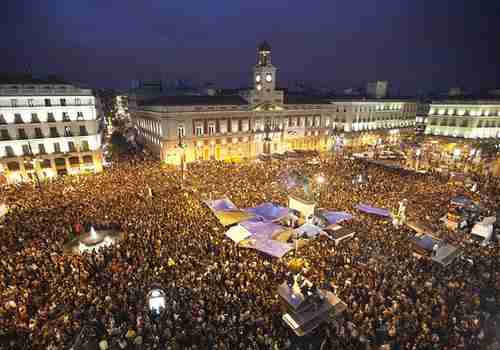 |
The protesters have been peaceful, mostly young people, but including families with small children. The quickly growing size of the spontaneous protests was a surprise to authorities, who declared that they would be illegal on Saturday, the day before Spain's regional elections on Sunday. But protesters ignored the demands to end the protests, and police have allowed them to continue unhindered.
The size of the anti-government protests illustrates how deeply the anger at the government of Prime Minister José Luis Rodríguez Zapatero has grown. Polls show that on Sunday his ruling Socialist Party (PSOE) could suffer important losses to the center-right Popular Party (PP).
But that's not the biggest threat, according to Market Watch. The biggest threat is a "reckoning of accounts" in the various regions, where in some cases the Socialists have been in power for decades. There is evidence that these governments have been hiding significant amounts of debt, so that as new regional governments take power, this additional debt will be revealed.
Spain's economy is already in a precarious position. Unemployment is around 20%, and it's at 42% for people ages 15 to 24, the age group of the principal protesters, who see no hope for themselves in sight, and are referring to themselves as the "lost generation" and "los indignados" (the outraged).
But lack of jobs and a devastatingly poor economy are not the only reason for the protests. "We protest against the political situation that allows more than 100 people who are accused of corruption across the country to stand in the next elections," says one protester quoted by the BBC.
In fact, one PP candidate, Francisco Camps, is likely to be re-elected as head of the regional government of Valencia, and by the end of the year he's likely to be in court facing bribery charges, according to the Toronto Star.
He's just one of many PP politicians caught in what's known as the Guertel scandal. According to a 2009 description by Deutsche Presse-Agentur, PP politicians were given tailor-made suits and other clothing items in return for awards for contracts that paid kickbacks. The corruption network has been named Guertel, the German word for "correa" which means "belt."
As one of Europe's PIIGS countries (Portugal, Ireland, Italy, Greece and Spain), European officials are hoping against home that some miracle will happen, and it won't be necessary to bail out Spain, in the say that Greece, Ireland and Portugal have had to be bailed out. All the European politicians are claiming Spain is completely safe.
But let's recall that European politicians have lied over and over again, and Eurogroup chairman Jean-Claude Juncker recently was quoted as saying, "When it becomes serious, you have to lie," as we reported two weeks ago. By their own admission, it's not possible to believe a word that European financial executives say. They will deny that anything is going to happen until it actually happens. And with a corruption scandal brewing in Spain, "it" might happen to Spain before too long.
One of the many conditions imposed by the EU in return for last year's bailout was that Greece would privatize gas and phone companies, and well as some state-owned banks, and would shut down loss-making state-owned enterprises. But the Greeks have been stalling on doing this, because of public sector union opposition to losing jobs and membership. Eurogroup chairman Jean-Claude Juncker is now proposing to take the decision out of Greece's hands by creating a "privatization agency," independent of the Greek government, staffed by EU officials. "Henceforth, the European Union will escort Greece's privatization program as if we were conducting it ourselves," said Juncker. Wow! That's going to be one bloody fight. Reuters
For the first time, a French official is suggesting that France might go along with the 'soft restructuring' of Greek debt that we've been hearing so much about these last few days. Under this plan, Greece would be given more time to pay off its debts, though it would still technically be a default. French Finance Minister Christine Lagarde, who is being named as a candidate to replace Dominique Strauss-Kahn as head of the IMF, said that France might support a restructuring, provided that the banks holding Greek debt agreed "voluntarily." However, the European Central Bank (ECB) has expressed bitter opposition to any kind of default, since it could trigger a chain reaction that could put all of Europe's financial system in danger. Wall Street Journal (Access)
Iran's state-run news service is applauding the Spain protests:
"It can't be ignored that the spontaneous burst of people on the streets draws strong parallels to the North African and the Middle East revolutions, which saw youngsters take a stand, initiating gatherings through social media, overnight camps and defying authorities - some are asking could this be the start of Europe's Tahir Square?"
I have to say that these guys really have balls to say something like that, after Iran's similar protests were turned into a bloody massacre. Press TV
(Comments: For reader comments, questions and discussion,
see the 22-May-11 News -- New 'Spanish Revolution' signals electoral change on Sunday
thread of the Generational Dynamics forum. Comments may be
posted anonymously.)
(22-May-2011)
Permanent Link
Receive daily World View columns by e-mail
Donate to Generational Dynamics via PayPal
China-Pakistan alliance enhanced by 'Shaheen-1' war game
This morning's key headlines from GenerationalDynamics.com.
 |
On May 20, 1941, Hitler's elite paratroopers invaded Crete overnight and were thwarted by allied forces and Cretan civilians. The three day commemoration will end with several events on Sunday. Kathimerini
Two ships carrying Shia Iranian activists on their way to support the anti-government protests in Bahrain were ordered to return to Iran by the Iranian government, after facing "threats" from Gulf Cooperation Council (GCC) warships. Bahrain's population is 2/3 Shia Muslim, but the government is Sunni Muslim, as are all the members of the GCC. Palestine Telegraph
Pakistan's army and intelligence services were severely humiliated by the U.S. raid that killed Osama bin Laden, since bin Laden lived openly near an army academy for years, and because the raid was not detected by the armed forces until it was over. According to an Indian analyst, the result is a desperation that may lead to Pakistan provoking a border incident with India, to give themselves an opportunity for a retaliatory strike against India, to regain some prestige. (In a generational Crisis era, a desperate act like this has a very high probability of leading to all out war.) Bahukutumbi Raman
In March, the Pakistan Air Force (PAF) and China's People's Liberation Army Air Force (PLAAF) conducted a joint combat aircraft war exercise over Pakistani soil, dubbed "Shaheen-1" (meaning "Eagle" in Urdu). Joint ground maneuvers are planned for later this year. 2011 is celebrated by both countries as the "Year of Pakistan-China Friendship." Jamestown
In a deal clinched on Friday, China will provide 50 more fighter jets to Pakistan, with delivery within six months. AP
Palestinian leaders are requesting a special meeting of the Arab League to discuss the consequences of Obama's speech, supporting a Palestinian state based on 1967 borders, and Netanyahu's firm rejection of the proposal. CNN
Thousands of anti-globalisation activists protested in the French city of Le Havre on Saturday against a G8 summit of rich nations to be held in Deauville at the end of the week. The Group of Eight nations, or "wealthy nations," are Britain, Canada, France, Germany, Italy, Japan, Russia and the United States. Saturday's protesters represented some 35 anti-globalisation, anti-nuclear, socialist, labour and human rights groups. AFP
France's southern port city of Marseille has been a model of successful integration, but with the latest influx of migrants from Algeria, Tunisia and Moroco, the era of harmony may be coming to an end. Spiegel
 |
Newt Gingrich's cell phone ringtone is Abba's hit "Dancing Queen." The secret came out during a campaign stop when his cell phone rang. NY Daily News
(Comments: For reader comments, questions and discussion,
see the 22-May-11 News -- New 'Spanish Revolution' signals electoral change on Sunday
thread of the Generational Dynamics forum. Comments may be
posted anonymously.)
(22-May-2011)
Permanent Link
Receive daily World View columns by e-mail
Donate to Generational Dynamics via PayPal
The rise of the Gulf Cooperation Council (GCC)
A major realignment led by Saudi Arabia is in progress in the Mideast, triggered by the Arab uprisings and by anger in the Gulf states over President Obama's responses, especially with respect to Iran.
 |
The incident that started the Saudis on the path to realignment was President Obama's humiliation of long-time ally Hosni Mubarak, calling for him to step down in the face of the student protests. This raised the fear the Obama would also call for Saudi King Abdullah to step down, and led to the conclusion that the U.S. could no longer be trusted. (See "11-Feb-11 News -- Egypt 'contagion' threatens stability of Saudi Arabia.")
The uprising in Bahrain resulted in further sharp disagreements. The Saudis sent 1,000 troops into Bahrain to take over non-combat roles, so that the Bahraini security forces would be freed up to combat the protesters. Obama said that he opposed this move by the Saudis, and in his speech on Thursday, Obama condemned the "repressive military action."
For the Saudis and the other Gulf nations, human rights for the Bahrain protesters is not the issue. What IS the issue is the concern that Iran is trying to destabilize the entire region, and that the Obama administration either does not care about this threat or is not concerned about it.
According to Nawaf Obaid, senior fellow at the King Faisal Center for Research and Islamic Studies, writing for the Washington Post earlier this week:
"A tectonic shift has occurred in the U.S.-Saudi relationship. Despite significant pressure from the Obama administration to remain on the sidelines, Saudi leaders sent troops into Manama in March to defend Bahrain’s monarchy and quell the unrest that has shaken that country since February. For more than 60 years, Saudi Arabia has been bound by an unwritten bargain: oil for security. Riyadh has often protested but ultimately acquiesced to what it saw as misguided U.S. policies. But American missteps in the region since Sept. 11, an ill-conceived response to the Arab protest movements and an unconscionable refusal to hold Israel accountable for its illegal settlement building have brought this arrangement to an end. As the Saudis recalibrate the partnership, Riyadh intends to pursue a much more assertive foreign policy, at times conflicting with American interests. ...Iran’s efforts to destabilize its neighbors are tireless. As Riyadh fights a cold war with Tehran, Washington has shown itself in recent months to be an unwilling and unreliable partner against this threat. The emerging political reality is a Saudi-led Arab world facing off against the aggression of Iran and its non-state proxies.
Saudi Arabia will not allow the political unrest in the region to destabilize the Arab monarchies — the Gulf states, Jordan and Morocco. In Yemen, the Saudis are insisting on an orderly transition of power and a dignified exit for President Ali Abdullah Saleh (a courtesy that was not extended to Hosni Mubarak, despite the former Egyptian president’s many years as a strong U.S. ally). ... In Iraq, the Saudi government will continue to pursue a hard-line stance against the Maliki government, which it regards as little more than an Iranian puppet. In Lebanon, Saudi Arabia will act to check the growth of Hezbollah and to ensure that this Iranian proxy does not dominate the country’s political life. Regarding the widespread upheaval in Syria, the Saudis will work to ensure that any potential transition to a post-Assad era is as peaceful and as free of Iranian meddling as possible. ...
Saudi Arabia has the will and the means to meet its expanded global responsibilities. In some issues, such as counterterrorism and efforts to fight money laundering, the Saudis will continue to be a strong U.S. partner. In areas in which Saudi national security or strategic interests are at stake, the kingdom will pursue its own agenda. With Iran working tirelessly to dominate the region, the Muslim Brotherhood rising in Egypt and unrest on nearly every border, there is simply too much at stake for the kingdom to rely on a security policy written in Washington, which has backfired more often than not and spread instability. The special relationship may never be the same, but from this transformation a more stable and secure Middle East can be born."
The above is all just talk, but there is solid action being taken as well to support the talk. The Gulf Cooperation Council (GCC) is an alliance of six Sunni Muslim states around the Persian Gulf.
There are two steps being taken to turn the GCC into a major military alliance not connected to the U.S.:
According to an analysis in the Debka subscriber-only newsletter, forwarded to me by a subscriber, the expanded GCC is meant to challenge and downgrade the Egyptian-dominated Arab League, with its post-Mubarak Egyptian influence. The GCC will have a Sunni Arab royalist alignment, and will challenge two emergent Muslim forces seeking Middle East domination:
I've certainly blamed President Obama for a lot of things, but it's hard for me to see what he could have done differently to avoid this mess. After the uprising in Tunisia forced Tunisia's leader to step down, there was enormous domestic and international pressure to encourage Mubarak to step down in Egypt. As far as I can tell, Saudi's King Abdullah assumed that Obama would never turn his back on Mubarak, and was shocked when it happened, while Obama was apparently shocked to learn later how furious Abdullah was. However, even if Obama knew of Abdullah's feelings, the pressure would still have been enormous, and even today many young Egyptians are criticizing Obama for waiting as long as he did.
Another issue is President Obama's disastrous speech on Thursday, including his statement that an Israeli-Palestinian deal should start with the 1967 borders. Given Saudi Arabia's anger that the U.S. has not stopped Israel from building new settlements in the West Bank, it's possible that Obama's demands were an attempt to placate the Saudis, and possibly head off the GCC plan. If so, then it was a desperate attempt, and I doubt that it will have any effect.
On the other hand, the harsh scolding that Israeli prime minister Benjamin Netanyahu gave to President Obama in the White House on Friday might have been planned in advance to give Obama cover in his relationships with the Saudis.
From the point of view of Generational Dynamics, the Mideast is headed for a major war, as I've been saying for years. This war is coming with 100% certainty, and neither President Obama nor any other politician can either cause or prevent it. The only thing we don't know is the exact scenario that will lead to this war.
This "tectonic shift" in the Mideast is a fascinating development. Events are moving quickly, and we may soon have a better idea which Mideast nations will be fighting which other Mideast nations, when this war is finally launched.
(Comments: For reader comments, questions and discussion,
see the 21-May-11 News -- Saudi Arabia advances Gulf Cooperation Council, further cuts U.S. ties
thread of the Generational Dynamics forum. Comments may be
posted anonymously.)
(21-May-2011)
Permanent Link
Receive daily World View columns by e-mail
Donate to Generational Dynamics via PayPal
If you're reading this, then the world hasn't ended yet
This morning's key headlines from GenerationalDynamics.com.
Greece's credit rating was cut by three levels on Friday, to well below junk status, by Fitch Ratings. Possibly more signifcant, Fitch said that any "soft restructuring" or "reprofiling" or Greece's debt would be counted as a full-fledged default. Greece's two-year bond yields (interest rates) increased to more than 25%. S&P has previously downgraded Greek debt to junk status. Bloomberg
Adding to Greece's troubles, Iceland, Liechtenstein and Norway have decided to suspend aid payments to Greece, under a program designed to reduce economic and social disparities in central and southern Europe. According to the statement, "Greece has undertaken to co-finance 50% of the cost of each project. This has not been followed up. Moreover, it is unclear whether all the funds that have already been disbursed to the Greek authorities have been transferred to the appropriate recipients." Nasdaq/WSJ
Analysts are saying that a Greek default is inevitable, and that it would trigger a chain reaction with harsh consequences. According to one analyst, things have now gotten so bad, that we will see another Greek bailout or default within days. However, a bailout will only postpone the problem for a while, and there's a lot of opposition in many countries to a new bailout for Greece. Telegraph
Israel boosted security on its border with Lebanon Friday amid fears that protesters could repeat demonstrations that saw thousands of Palestinians march toward a security fence on Nakba Day. Daily Star (Lebanon)
It's another Friday, and another opportunity for massive demonstrations and anti-government protests following midday prayers in Syria. This week it was dubbed "Azadi Friday," using the Kurdish word for "freedom." Syrian forces killed at least 34 people. Al-Jazeera
In a jab at Russia, Georgia's parliament unanimously passed a resolution declaring that Russia's 1864 battle with Circassians in Sochi was a genocide. The Winter Olympics will be held in Sochi in 2014, on the 150th anniversary of the conflict, and the genocide claims are becoming increasingly important as the Olympics games approach. Eurasia Net
Now that "up to 60 percent" of the pupils in the primary schools of Moscow are children of migrants who do not speak Russian well, an increasing number of Muscovite parents are doing whatever they can to ensure that their children go to those schools which have few or no migrant children. Paul Goble
Harold Camping, an Oakland minister, is predicting the end of the world on Saturday. He says that an earthquake will first shake New Zealand, triggering an apocalypse that rolls relentlessly toward the USA, reaching San Francisco at around 6 p.m. on Saturday. USA Today
(Comments: For reader comments, questions and discussion,
see the 21-May-11 News -- Saudi Arabia advances Gulf Cooperation Council, further cuts U.S. ties
thread of the Generational Dynamics forum. Comments may be
posted anonymously.)
(21-May-2011)
Permanent Link
Receive daily World View columns by e-mail
Donate to Generational Dynamics via PayPal
Confrontation will continue when Netanyahu speaks to Congress
When President George Bush announced his Mideast Roadmap to Peace in 2003, I wrote that the plan could never succeed because the survivors of the genocidal 1936-49 war between Arabs and Jews, including Yasser Arafat and Ariel Sharon, were disappearing, and the younger post-war generations would be refighting that war.
 |
It's almost exactly eight years later. Ariel Sharon is in a permanent vegetative state and Yasser Arafat is dead, though the latter has been replaced by another war survivor, Mahmoud Abbas, and as such is probably the most conciliatory actor among those currently on stage.
And so watching and listening to the speech on Thursday by the youthful Gen-Xer President Barack Obama, I felt a sense of déjà vu.
Suddenly I was thrust back to 2008, in the days of candidate Obama's campaign rhetoric. He was going to heal the world as soon as he took office. He would be guided by facts, not like President Bush, who was guided by ideology and ignored facts. He would cure global warming, close Guantanamo, become friendly with Iran and North Korea, bring a two-state solution to Palestinians and Israelis, beat the Taliban and al-Qaeda, reflate the real estate and stock market bubbles and, of course, provide universal health care. He's failed at all of these objectives (except possibly reflating the stock market bubble).
Possibly my greatest single shock about the campaign occurred after Obama won the election. Instead of moving to the center and repudiating some of the looniest promises, he repeated them, and added that the world was going to change on January 21. I believe the exact words that went through my mind were, "Omigod!! He actually believes his campaign rhetoric!!"
So that feeling came to me again on Thursday. Apparently the youthful Gen-Xer President Obama still believes that all he has to do is give a speech and the world will heal. That's the only thing I can think of that explains this incredible speech.
President Obama's speech "did a great service in sketching out a new paradigm for American engagement with the Middle East," according to an analysis by the Jerusalem Post. The speech was a "major departure" from previous US policy because it's a "substantial shift toward the Palestinian position" in the following ways:
It's hard to know what to make of this, since it's so unrealistic. I guess it's forgiveable though, in the sense that a "realistic" solution does not exist.
The office of Israel's prime minister Benjamin Netanyahu issued the following statement immediately after the end of President Obama's speech:
"Israel appreciates President Obama’s commitment to peace. Israel believes that for peace to endure between Israelis and Palestinians, the viability of a Palestinian state cannot come at the expense of the viability of the one and only Jewish state.That is why Prime Minister Netanyahu expects to hear a reaffirmation from President Obama of U.S. commitments made to Israel in 2004, which were overwhelmingly supported by both Houses of Congress.
Among other things, those commitments relate to Israel not having to withdraw to the 1967 lines which are both indefensible and which would leave major Israeli population centers in Judea and Samaria beyond those lines.
Those commitments also ensure Israel’s well-being as a Jewish state by making clear that Palestinian refugees will settle in a future Palestinian state rather than in Israel.
Without a solution to the Palestinian refugee problem outside the borders of Israel, no territorial concession will bring peace."
What's remarkable about this statement is that Netanyahu is essentially demanding that Obama retract his speech, something that obviously is not going to happen.
The "U.S. commitments made to Israel in 2004," Netanyahu is referring to a commitment by the Bush administration that in exchange for withdrawal from Gaza. Netanyahu is saying that the U.S. is reneging on its previous commitments.
If any political compromise on this issue is possible, it would have to be in the proposed concepts of "land swaps." Perhaps the Obama administration believes it has found a way to swap chunks of land so cleverly that Israel's security is preserved.
Ordinarily I would say that this speech will be completely forgotten within a week, but that can't happen because Netanyahu is visiting Washington over the weekend, and will be giving a speech to Congress on Tuesday.
The situation in the Mideast is much worse today than it was in 2003, when the Mideast Roadmap was proposed, simply because many more of the generation of conciliatory war survivors are gone:
I could probably go on with dozens more reasons.
It's now May. Think of how much has happened since January, and now imagine how much more is going to happen by December. This is going to be a very significant year.
Palestinian President Mahmoud Abbas welcomed Obama's efforts to renew talks with Israel that collapsed last year, and will convene "emergency" talks with Palestinian and Arab officials to consider further steps, according to Haaretz.
A Hamas spokesman said that the speech was disappointing, and that the U.S. president did not propose anything new. "What Obama needs to do is not to add slogans but to take concrete steps to protect the rights of the Palestinian people and the Arab nation," he said.
In his speech, President Obama promised substantial economic aid to Egypt and Tunisia:
"Second, we do not want a democratic Egypt to be saddled by the debts of its past. So we will relieve a democratic Egypt of up to $1 billion in debt, and work with our Egyptian partners to invest these resources to foster growth and entrepreneurship. We will help Egypt regain access to markets by guaranteeing $1 billion in borrowing that is needed to finance infrastructure and job creation. And we will help newly democratic governments recover assets that were stolen.Third, we’re working with Congress to create Enterprise Funds to invest in Tunisia and Egypt. And these will be modeled on funds that supported the transitions in Eastern Europe after the fall of the Berlin Wall. OPIC will soon launch a $2 billion facility to support private investment across the region. And we will work with the allies to refocus the European Bank for Reconstruction and Development so that it provides the same support for democratic transitions and economic modernization in the Middle East and North Africa as it has in Europe."
Both of these economies have been approaching bankruptcy since their respective uprisings began, so this aid is thought to be essential to prevent regional destabilization.
(Comments: For reader comments, questions and discussion,
see the 20-May-11 News -- Obama and Netanyahu in sharp disagreement after speech
thread of the Generational Dynamics forum. Comments may be
posted anonymously.)
(20-May-2011)
Permanent Link
Receive daily World View columns by e-mail
Donate to Generational Dynamics via PayPal
Iraq and Kuwait in potential row over new deep water port
This morning's key headlines from GenerationalDynamics.com.
Weekend elections are threatening to drive Spain's ruling Socialist party from power in several regions. They're also threatening a nasty surprise: to uncover billions of dollars of "hidden debt" owed by local governments to health clinics and other suppliers. There is widespread, unrecorded debt among once-free-spending local governments. Some companies are complaining that fiscally frail administrations are pressuring them to do business off the books and not immediately bill for goods and services. This would be another potential disaster for the euro and the European Union. Wall Street Journal (Access).
 |
The European Central Bank (ECB) is "playing its last card" and threatening to refuse to accept Greek bonds as collateral, if the European Union (EU) approved the proposed "soft restructuring" of Greece's debt. ECB officials have been warning for weeks that any debt restructuring, or any form of default, would have catastrophic consequences for the euro zone. However, some economists are saying that the ECB threat is just a negotiating ploy, and that they'll be forced to accept Greek bonds, no matter what happens. Kathimerini
South Africa's African National Congress (ANC) party has been winning elections by 60%+ majorities continually since 1994. But in Wednesday's municipal elections, the opposition Democratic Alliance began to successfully challenge the ANC for the first time, winning some victories. The ANC is the black liberation party following the end of apartheid, and originally led by Nelson Mandella. The DA opposition party is considered to be for whites and those of mixed race. Black voters are switching allegiance away from the ANC to the DA because the ANC is failing to provide basic services -- running water, sanitation, schools, health care, housing -- to the poor blacks, while all of these services are usually available in white neighborhoods. Bloomberg
Plans by the Kuwaitis to begin construction of "Mubarak port," a deep water port just over the border from the site of a new Iraqi port currently under construction, is causing tempers to flare. The two ports would compete for shipping business. The move has caused historic tempers to flare. Iraq invaded Kuwait in 1990, leading to American intervention and the Iraq war. Iraqi activists have called for the closure of the Kuwaiti embassy in Bagdad, and expulsion of their ambassador. Iraqi Prime Minister Nuri al-Maliki ordered the formation of an emergency committee to travel to Kuwait immediately to tackle the dispute between the two countries. Kurdish News Agency (Iraq)
There are reports that Kim Jong-un, the heir apparent youngest son of North Korea's leader Kim Jong-il, is visiting China for the first time without his father. Last September, the son was named vice chairman of the Central Military Commission of the ruling Worker's Party and a four-star general, apparently in preparation for becoming the new leader. Yonhap
According to Kenya's Cereal Millers Association that represents 26 millers, they are holding between 400,000 and 500,000 bags of maize, enough to last for ten days. "Supplies are fast drying up and farmers are not selling," said Diamond Lalji, the millers' chairman. "If we don't get more supplies, there will be no unga (flour) on the shelves in the coming days." All Africa
(Comments: For reader comments, questions and discussion,
see the 20-May-11 News -- Obama and Netanyahu in sharp disagreement after speech
thread of the Generational Dynamics forum. Comments may be
posted anonymously.)
(20-May-2011)
Permanent Link
Receive daily World View columns by e-mail
Donate to Generational Dynamics via PayPal
Growing Naxalite group is India's 'greatest internal security challenge'
Naxalite terrorists killed five "jawans" (policemen) in India's Central Reserve Police Force (CRPF), and critically wounded two more, with a landmine blast in the Dantewada district, according to Samay (Delhi).
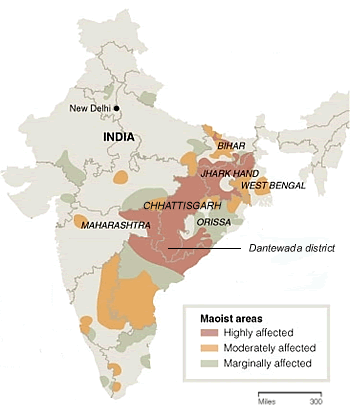 |
This is the biggest Naxalite terror attack since last April and May, when 44 and 75 jawans were killed, respectively, in two major terror attacks in the same district. (See "19-May-10 News -- Maoist terrorism puts India on high alert.")
That Naxalite (Maoist) terrorists, who occupy rural areas in the "Red Corridor," stretching along the entire southeast of the country, have become, in the words of Prime Minister Manmohan Singh, India's "greatest internal security challenge."
The Naxalite group was formed in 1967 in a split from the Communist Party of India (CPI). The CPI was aligned with Russian Communists, and they were increasingly moving away from violence and getting involved in India's political system. At that time, Russia and China were close to war with each other, and that split was reflected in the CPI itself. The breakaway group was aligned with China, and became known as Maoists. The initial peasant uprising that led to the Maoists occurred on May 27, 1967, in the town of Naxalbari, giving them the name "Naxalites."
It was just a few years ago that the Naxalites were confined to rural areas, but now that's changing, according to a former director-general of police quoted by the Times of India:
"Certainly, it's a matter of serious concern. Prima facie, the Naxalites seem to have succeeded in ensuring the support of tribals and intellectuals in urban areas. As a result of that, their movement is getting support in big cities. It appears that their social networking is very strong, and as a result, they have been able to attract urban intellectuals."
He adds that the Naxalite movement has grown because the government and industrialists are exploiting the poor tribal citizens. "It's a fact that they have been robbed of their livelihood. Their traditions and culture have been neglected. Therefore, they look to the Naxals for justice."
(Comments: For reader comments, questions and discussion,
see the 19-May-11 News -- India's Naxalite (Maoist) terrorists turn urban
thread of the Generational Dynamics forum. Comments may be
posted anonymously.)
(19-May-2011)
Permanent Link
Receive daily World View columns by e-mail
Donate to Generational Dynamics via PayPal
President Obama announces sanctions on Syria's president
This morning's key headlines from GenerationalDynamics.com.
President Obama plans to propose new economic help to Tunisia and Egypt in his speech to the nation on Thursday evening. The economic proposals will include debt cancellations and loan guarantees. Egypt in particular is close to bankruptcy, as we've reported before. USA Today
President Obama has put economic sanctions on Syria's president Bashar al-Assad because of the "continuous escalation of violence against the people of Syria." The sanctions are largely symbolic, since Assad has few assets under the control of the United States. LA Times
In a repeat of previous events, Yemen's President Ali Abdullah Saleh refused, at the last minute, to sign an agreement to step down within 30 days. The deal was brokered by the Gulf Cooperation Council, along with the United States. Reuters
The European Central Bank (ECB) is criticizing proposals of former EU president Jean-Claude Juncker, Luxembourg’s prime minister, to allow a "soft" restructuring of Greece's debt. This is a form of default that would give Greece more time to pay off its loans, but would not solve Greece's debt problem. The ECB is opposing default in any form, since the ECB is the biggest holder of Greek debt, and would lose the most money. The rising tempers in Europe are similar to the rising tempers in Washington. In both cases, politicians are only interested in what's best for them, not what's best for the nation or society. Financial Times (Access)
Already in the first quarter of 2011, pirates from Somalia have attacked more than 117 ships, killed 7 crew members and held 338 hostages for ransom. Ransom payments increased from an average of $150,000 in 2005 to $5.4 million in 2010. Spiegel
(Comments: For reader comments, questions and discussion,
see the 19-May-11 News -- India's Naxalite (Maoist) terrorists turn urban
thread of the Generational Dynamics forum. Comments may be
posted anonymously.)
(19-May-2011)
Permanent Link
Receive daily World View columns by e-mail
Donate to Generational Dynamics via PayPal
Germany limits information exchange with U.S. intelligence
On Monday, Pakistan's Prime Minister Syed Yousuf Raza Gilani told Xinhua, "We are proud to have China as our best and most trusted friend and China will always find Pakistan standing beside it at all times."
 |
He said China was the first country to show its support and solidarity with the government and people of Pakistan, in the aftermath of the killing of Osama bin Laden by U.S. forces:
"To test a friend whether true or not, it needs time and means under crisis, we appreciate that in all difficult circumstances China stood with Pakistan, therefore we call China a true friend and a time-tested and all-weather friend."
This comes at the same time as a military confrontation between Nato helicopters and Pakistan's military, injuring two of Pakistan's soldiers, causing the Pakistan military to demand a "flag meeting" with Nato commanders over Nato incursions into Pakistan's soil, according to the Telegraph. (A "flag meeting" is a meeting of military officials on their common border.)
The incident involved two Nato helicopters at the border between Afghanistan and Pakistan, though it's not clear which side they were on. According to the Pakistani statement, "The [Pakistani troops] fired upon the helicopters and, as a result of the exchange of fire, two of our soldiers received injuries."
Last week, Pakistan's parliament threatened reprisals for American military actions on Pakistan's soil -- the drone strikes and the military action that killed Osama bin Laden. They threatened to prohibit Nato from ferrying military supplies from Karachi harbor, across Pakistan into Afghanistan. They also threatened to end sharing of intelligence with the CIA.
As I've been writing for years, my expectation is that the coming Clash of Civilizations world war will pit the "axis" of China, Pakistan and the Sunni nations against the "allies" of the U.S., India, Russia, Iran and Israel, among others. The events of the last few weeks, since the killing of Osama bin Laden, appear to have pushed events very far along this trend line.
The Pakistanis have threatened to limit sharing intelligence information with the CIA, and the Germans are doing the same thing. Opposition has been growing in Germany to America's use of unmanned drones in Pakistan and Yemen, especially since October 4 of last year, when a missile from a missile strike from an unmanned American drone killed German citizen Islamists sitting in a room in Waziristan, in Pakistan's tribal area. Spiegel
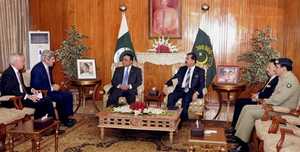 |
After an all-day meeting in Islamabad, Pakistan's capital, with Pakistan's President Asif Ali Zardari and other officials, Senator John Kerry said that progress had been achieved. These achievements were vague promises to continue cooperation on counter-terrorism, intelligence sharing and targeting terrorist sanctuaries. Dawn (Pakistan)
(Comments: For reader comments, questions and discussion,
see the 18-May-11 News -- Pakistan military demands 'flag meeting' over US incursion
thread of the Generational Dynamics forum. Comments may be
posted anonymously.)
(18-May-2011)
Permanent Link
Receive daily World View columns by e-mail
Donate to Generational Dynamics via PayPal
France's first lady, Carla Bruni Sarkozy, is pregnant
This morning's key headlines from GenerationalDynamics.com.
Top level European officials have been studiously avoiding any suggestion of a default on Greece debt, for fear that stating the obvious would panic investors. Instead, they've been buying time by giving Greece new credit cards to use to pay off the old one, in order to buy time. But on Tuesday, former EU president and current Prime Minister of Luxembourg Jean-Claude Juncker proposed a "soft" restructuring of Greece's debt, if it quickly presses ahead with its plan to privatize 50 billion euros ($70.8 billion) in assets and embark on other reforms that have been resisted so far. The soft restructuring would involved extending the due date of the loans. One BBC commentator called this an "elaborate pretense," since it's a default by another name, and because it will simply postpone the problem a little longer. Market Watch
Greece will have to "do its homework" -- fulfill its previous promises to sell assets and lay off workers -- before it can receive any more bailout money, according to Austrian finance minister Maria Fekter. "Before Greece does its homework, no money can flow. You can't make promises and then not get privatisation on its way. Greece is still remaining in the state we had in the seventies. It doesn't work that way. If you've cheated your way into the euro, then you have to catch up on your homework now." Reuters
The political field for France's presidential campaign, which culminates in two rounds of voting on April 22 and May 6 next year, is changing rapidly. First, Dominique Strauss-Kahn, expected to run on the Socialist ticket, is sitting in a jail cell in New York, and may be there for some time. And now, Sarkozy's father has confirmed that Carla is pregnant, and will probably give birth right in the middle of the campaign. AFP
Perp walks may be common in America, but they're illegal in France before a man is found guilty, since they prejudice the jury, and French politicians are outraged at the treatment of Dominique Strauss-Kahn. One Former Culture Minister Jack Lang calls the treatment a "lynching" that had "provoked horror and aroused disgust." He said that the U.S. justice system was "politicized" and was determined to "make a Frenchman pay." Former Justice Minister Elisabeth Guigou, who drafted the French law on presumption of innocence, called the pre-trial publicity "absolutely sickening." One BBC commentator said that the accusations didn't make sense, since Strauss-Kahn would not have acted so recklessly, while the accuser was a single mother who had an opportunity to make a great deal of money. Daily Mail
Oklahoma Republican Senator Tom Coburn says that the "Gang of Six" could not reach agreement on how to achieve their objective of cutting the deficit by $4 trillion over the next decade. They were working on a plan to increase taxes of $1 trillion in return for cuts to Medicare, Medicaid and Social Security, but leaders in both parties were cool to these efforts. From the point of view of Generational Dynamics, this failure is expected. The generational paradigm in a Crisis era is that these agreements will always collapse in bitterness, until a "regeneracy" event occurs, an event that regenerates civic unity. In this case, the anticipated regeneracy event will be a financial collapse so enormous that both sides will have to agree, since no other choices will be available. At that point, my expectation is that Medicare, Medicaid and Social Security will all be thrown out, and marginal tax rates will return to the 95% levels of World War II. In the meantime, the "Gang of Six" is just a circus act. Washington Post
Hundreds of supporters of Kurdish separatists attacked police with stones and fire bombs on Tuesday in southeastern Turkey. The clash occurred after a funeral, attended by thousands of separatist supporters, of one of 12 Kurdish rebels killed by Turkish troops as they attempted to sneak into Turkey from their bases in northern Iraq. The rebels are seeking an autonomous Kurdistan. AP
In a speech on Tuesday, Bill Gates called for a worldwide vaccinations program to protect children from infectious diseases. "If donors are generous, we will prevent 4 million deaths by 2015. By 2020, we can prevent 10 million deaths." I met Bill Gates several times when I was a technology journalist, and he's a very interesting guy who is now devoting his life to a worthy cause that he believes in passionately. Unfortunately, it falls to me, the gloomiest person in the world, to point out that reducing child mortality only worsens the population explosion and the food shortage, and will mean hundreds of millions of additional deaths in the coming Clash of Civilizations world war. Reuters
 |
If you wear these Neurowear cat ears, and your brain concentrates on something, then these cat ears perk up. If your brain relaxes, so do the cat ears. This may be the first commercial product that uses the new brain technology that's been under development for a number of years. The cat ears come with a headband with a forehead brain wave sensor, and have built-in motors that can make the cat ears react to an appropriate (or inappropriate) change in brain waves. A Japanese company Neurowear, hopes to market the item by the end of the year. Price has not yet been determined. CNet
(Comments: For reader comments, questions and discussion,
see the 18-May-11 News -- Pakistan military demands 'flag meeting' over US incursion
thread of the Generational Dynamics forum. Comments may be
posted anonymously.)
(18-May-2011)
Permanent Link
Receive daily World View columns by e-mail
Donate to Generational Dynamics via PayPal
Euro group backs a bailout for Portugal
Europeans are coming around to the idea that a new bailout of Greece will only pile on more debt, only making the euro / Greece financial crisis worse. Greece's problems are compounded by the weekend arrest of IMF chief Dominique Strauss-Kahn, a major support of Greece and further Greek bailouts.
 |
Negotiations are ongoing with the "troika," consisting of the International Monetary Fund (IMF), European Central Bank (ECB), and the European Union (EU).
Although no decisions have yet been made, sources indicate that new harsher austerity measures will be imposed on Greece, according to capital.gr:
There have already been violent anti-austerity riots, last year and as recently as last week, and the threat of mass dismissal of unionized public sector employees will almost trigger even greater rates of violence.
It's going to be a long, hot summer in Greece, but even that won't make any difference. A new bailout will buy time, but won't stop Greece's spiral into insolvency. Even without the austerity measures, Greece's economy is in recession, and the austerity measures will make it much worse, according to Kathimerini.
And putting Greece into default, according to all the reports that I've read, will be a financial disaster for European banks, many of which are carrying Greek bonds on their books at nominal value. A Greek default will cause a sharp recession through Europe. There is no way out of this.
Germany parliamentarians are pressuring the government to oppose a new bailout of Greece, and Chancellor Angela Merkel is facing a potential party rebellion over new bailout loans to Greece. Spiegel
However, Merkel herself is saying that Greek debt restructuring (another word for default) is out of the question: "It would raise incredible doubts about our credibility if we simply were to change the rules in the middle of the first programme." Financial Times (Access).
Europe's finance ministers didn't reach any decision on Greece, but they did approave a bailout package for Portugal. The package demands an ambitious austerity program and makes economic growth assumptions that aren't realistic. Reuters
(Comments: For reader comments, questions and discussion,
see the 17-May-11 News -- Greece headed for harsh new austerity measures, possible default
thread of the Generational Dynamics forum. Comments may be
posted anonymously.)
(17-May-2011)
Permanent Link
Receive daily World View columns by e-mail
Donate to Generational Dynamics via PayPal
U.S. borrowing exceeds the debt limit
This morning's key headlines from GenerationalDynamics.com.
The U.S. Treasury Dept. reported that new debt auctions of $72 billion will push the debt past the debt limit by Tuesday morning, meaning that the Treasury can't borrow any more money. Starting Monday, the agency will suspend investments in federal retirment and disability funds. These and other actions will free up $147 billion that can be used to pay off other debts, to keep the U.S. out of default. Wall Street Journal (Access).
Since the Fatah-Hamas reconciliation agreement, Israel has been withholding $85 million in tax revenues from customs duties and other levies it had collected on behalf of the Palestinians. Apparently responding to international criticism, Israel has reversed this decision, and will transfer the funds, "after Israel received several assurances and clarifications that the money would not find its way to terrorists' hands and that none of the procedures applied so far would change." Ynet
At least 19 people were injured on Sunday as Jordan's police used teargas and beat participants to disperse hundreds of anti-Israeli activists. Haaretz
Some web site readers have complained to me about my analysis of Israel's actions on Sunday. ( "16-May-11 News -- Israeli army fires on unarmed protesters crossing three borders") Thanks for all the feedback guys, but you're missing the point.
This isn't my opinion. I'm just reporting the news. It's the opinion of Israel's own internal inquiry, the Winograd Commision, that Israel's 2006 invasion of Lebanon was a total screwup. ( "Israeli government in crisis after report on war with Hizbollah")
Once again, it's not my opinion, but the opinion of the Jewish/Israeli sources quoted, as well as many others that appeared on Monday, that Sunday's actions against protesters were apparently also a total screwup. Already, the Palestinians are celebrating this as a big PR victory. There will be investigations, internal and external, that will explore this further. And yes, the incompetence shown was almost surely the fault of Boomers and Gen-Xers because they have no memory of the 1948 war.
Those of you who love Israel should start showing some common sense, before Israel's panic and overreaction cause a real disaster. Haaretz and Independent
The Pakistan Taliban militant group, Lashkar-e-Toiba, is taking credit for the murder, by gunmen on motorcycles, of a Saudi Arabian diplomat. The militant group described Pakistan and Saudi Arabia as American "slaves" and hailed the attack as a "very good job." Saudi Arabia will provide increased security for its diplomats in Pakistan and other countries. Reuters
Several times in the past, Mahmoud Abbas has threatened to resign as Palestinian Authority president (PA) because of the collapse of the peace process. In March, he threatened to resign if a Palestinian state is not established by September. Now he's saying that he will step down is a Palestinian state IS established by September. Haaretz
PA president Mahmoud Abbas says that in his opinion, Barack Obama was more receptive and sympathetic to the Palestinian cause prior to his becoming president. With regard to lame duck Mideast envoy George Mitchell, Abbas said, "Every visit by Mitchell, we talked to him and gave him some ideas. At the end we discovered that he didn’t convey any of these ideas to the Israelis. What does it mean?" Abbas said that Obama essentially double-crossed him by not pressuring Israel to continue its settlement moratorium: "It was Obama who suggested a full settlement freeze. I said OK, I accept. We both went up the tree. After that, he came down with a ladder and he removed the ladder and said to me, jump. Three times he did it." Jerusalem Post
The International Criminal Court (ICC) issued arrest warrants on Monday for Libya's Muammar Gaddafi, his son Saif al-Islam, and his brother-in-law and intelligence chief, Abdullah al-Sanoussi. It seems unlikely that Gaddafi will honor the warrants and turn himself in. The ICC warrants make a negotiated settlement to the war less likely, because Gaddafi would be subject to arrest at any time. Globe & Mail
(Comments: For reader comments, questions and discussion,
see the 17-May-11 News -- Greece headed for harsh new austerity measures, possible default
thread of the Generational Dynamics forum. Comments may be
posted anonymously.)
(17-May-2011)
Permanent Link
Receive daily World View columns by e-mail
Donate to Generational Dynamics via PayPal
Israel's panicked response is reminiscent of 2006
The Israeli Defense Forces (IDF) are going to have to account for their actions on Sunday, after firing on unarmed protesters crossing into Israel from Lebanon, Syria and Gaza, an action that is being described as a violation of international law, according to the Jerusalem Post. Dozens of the protesters, who were violating Israeli sovereignty, were injured, and 10-20 were killed.
 |
Palestinian Authority (PA) president Mahmoud Abbas said in a televised address that those who were killed are martyrs, according to the Jerusalem Post. "Their precious blood will not be wasted. It was spilt for the sake of our nation's freedom." Hamas called Naqba Day events "a turning point in the Israeli-Arab conflict." Hezbollah condemned the "Israeli aggression on unarmed civilians."
Israel's prime minister Benjamin Netanyahu said that Naqba day protesters are opposed to Israel's existence, according to Israel Nation News:
"It is important to note that these events are happening on the anniversary of the establishment of Israel. As the leaders of these violent acts themselves say – their battle is not for the 1967 lines, but rather, against Israel's existence, as they see that day as a disaster which must be rectified. We must keep our eyes open and see the reality, and know who and what we are dealing with."
An analysis by Debka claims that the IDF was almost completely unreprepared for the masses of protesters, especially on the Syrian border. The article points out that the IDF had previously been warned that Syria was planning some action against Israel to divert attention from its own troubles:
"Israeli forces on high alert for Nakba Day, Sunday, May 15, failed to seal three national borders on the Golan, Lebanon and the Gaza Strip against large-scale incursions. Dozens of Syrians and Hizballah invaders were able to overrun the Israeli Golan village of Majd al Shams and hoist Syrian and Palestinian flags in the main square; Hizballah-sponsored Palestinian demonstrators breached the Lebanese-Israeli border and damaged IDF installations; and hundreds of Palestinians battered the Erez crossing from the Gaza Strip.The interlopers sustained dozens of casualties including fatalities from Israeli fire these events in which Israelis too were injured. In the Gaza sector 40-50 casualties are reported. Lebanon reports five demonstrators killed.
On the Syrian border, Israeli snipers and helicopters belatedly opened fire to halt the thousands attempting to cross the border, but dozens got through to Majd al Shams. Some were killed or injured by Israeli fire. Three Israel civilians were wounded. Israeli tanks were speeded to the Syrian border to halt the incident.
debkafile reports that despite the high IDF border alert for Nakba Day invasions from neighboring Arab countries, Israeli forces were not deployed in sufficient strength on the Golan border, even though debkafile reported Saturday, May 14 that Damascus planned trouble on the border with Israel as a diversion from the rebellion against the Assad regime."
What happened on Sunday is reminiscent of Israel's overreaction in the 2006 Lebanon war with Hizbollah. (See "How Israel panicked in pursuing the summer Lebanon war with Hizbollah.")
When the 2006 war between Israel and Hizbollah began, both sides immediately fought the war in a manner appropriate to their respective generational eras. Hizbollah warriors fought the war in a "cool" Awakening era fashion, launching missiles into Israel during the day, and then returning to their wives in the evening. By contrast, Israel fought the war in a "hot" Crisis era fashion. They panicked when two Israeli soldiers were kidnapped, and went to war in four hours, with no plan, no objective, and no idea what was going on. They then blundered from one objective to the next, until the war finally ended. If Lebanon had also been in a generational Crisis era, then Hizbollah warriors would have crossed the border into Israel and slaughtered Israelis in their homes, possibly triggering a regional and world war.
Sunday's panicked response by Israel appears to be very similar, but this time it's even more dangerous than it was in 2006. With the entire Mideast becoming inflamed with Arab uprisings, and many of the countries in generational Crisis eras, there is a very real possibility that Israel will be blamed for starting a regional war, if one breaks out because of Israel's panic and overreaction.
As September approaches, and the United Nations heads for possible creation of a Palestinian state by international mandate, we can only expect the uprisings to continue, and the tension between Israel and Palestinians to escalate.
Israel's border with Syria is an entirely new front. The border along the Golan Heights, which Israel annexed in 1981 in a move that was not recognized internationally, has been quiet for decades, until Sunday, when four people were killed, according to Reuters.
Sunday's uprisings highlight a more general problem that we haven't heard much about lately -- the position of the Palestinian refugees, whose parents and grandparents were forced to leave their homes because of the 1948 war. There are some four million Palestinian refugees in refugee camps in Jordan, Lebanon, Syria, and the Palestinian territories. They are becoming more restive, and they are demanding the "right of return" to their grandparents' former homes, according to Reuters. It's hard for me to see how this can end any way but badly.
As I've been saying for years, the Generational Dynamics prediction is that there will be a new war refighting the genocidal war between Jews and Arabs that followed the partitioning of Palestine and the creation of the state of Israel on May 14, 1948. The trend has been clearly in that direction for years, and the war may not be very far off.
(Comments: For reader comments, questions and discussion,
see the 16-May-11 News -- Israeli army fires on unarmed protesters crossing three borders
thread of the Generational Dynamics forum. Comments may be
posted anonymously.)
(16-May-2011)
Permanent Link
Receive daily World View columns by e-mail
Donate to Generational Dynamics via PayPal
Protesters rally outside the Israeli embassy in Cairo, Egypt
This morning's key headlines from GenerationalDynamics.com.
 |
The juiciest story to come out over the weekend was the arrest of Dominique Strauss-Kahn on sexual assault charges. Strauss-Kahn is head of the International Monetary Fund (IMF) in Washington, and is widely regarded of having "saved the world" by guiding global policy through the financial crisis of 2008-2009. He was expected to step down from his position as IMF chief to run for President of France next year on the Socialist ticket. His political career is now thought to be finished, and his career at the IMF is probably finished as well. Agence France-Presse
He's charged with sexually assaulting a maid in a $3,000 per night suite at this New York City hotel on Saturday. He was arrested on Saturday evening as his plane was just about to take off for France. However, his plane trip is explained by his scheduled meetings with German Chancellor Angela Merkel on Sunday, to discuss the euro debt crisis. Reuters
The arrest of Strauss-Kahn throws the IMF into disarray, as it tries to figure out how to respond to the situation. He strongly supported the Greek rescue, even in the face of growing doubts about the Greek government's ability and resolve to meet the commitments of the international aid package. His latest trip was likely to focus on whether to adjust the terms of Greece's loans in order to keep the country -- and the rest of the euro zone -- from falling into a deeper crisis. Although he was going to be stepping down in a couple of months anyway, his sudden disappearance could derail European finance negotiations, at least for a while. Wall Street Journal (Access)
 |
Israel's IDF faced protesters crossing the border into Israel on three fronts, as I wrote in today's main article. There were also demonstrations in Cairo, Egypt, on Sunday, when thousands of protesters massed outside of the Israeli embassy. Egyptian police used rubber bullets and tear gad when a group of demonstrators tried to storm the entrance of the embassy. Protesters responded by burning tires and throwing stones. Al-Jazeera
The Libya military intervention was supposed to be victorious almost overnight, but now that it's dragging through its third month as a stalemate with no end in sight, politicians are looking for ways to escalate, so that they find that elusive light at the end of the tunnel. UK Armed Forces chief Gen Sir David Richards says that Nato must intensify the military campaign against the Gaddafi regime by easing the restrictions on bombing targets. "The vice is closing on Gaddafi, but we need to increase the pressure further through more intense military action. We now have to tighten the vice to demonstrate to Gaddafi that the game is up and he must go." Telegraph
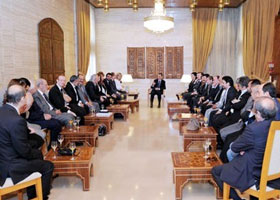 |
Syria's president Bashar al-Assad met on Saturday with a delegation of Syrian artists, actors and directors, to discuss the role of art and artists to uplift society, reflect its aspirations, bolster solidarity among the Syrian people, and promote awareness at plots that are targeting Syria and its security and stability. Sana (Syria)
Iran's Awakening-era political crisis continues to expand, as president Mahmoud Ahmadinejad is refusing to obey orders to fire his chief of staff Esfandiar Rahim-Mashaei, even after some of Mashaei's aides were accused of sorcery, using "supernatural powers," of being "magicians." ( "7-May-11 News -- Resignation of Iran's president Mahmoud Ahmadinejad may be imminent") Now Ahmadinejad himself stands accused of being "under a spell," for disobeying the Supreme Leader. According to Ayatollah Mohammad-Taqi Mesbah-Yazdi, "I've told some of my close friends that I am more than 90 per cent certain that he has been put under a spell. This is not natural at all. No sane person does such things unless his free will has been taken away." Telegraph
In a referendum in Switzerland on Sunday, voters overwhelmingly rejected proposals to ban assisted suicide, and also overwhelmingly rejected a proposal to ban "suicide tourism," which permitted foreign nationals to visit the country to obtain help in ending their lives. From the point of view of Generational Dynamics, the suicide rate among seniors is expected to increase, as the financial crisis deepens, causing pension plans and other financial safety nets to go bankrupt. Independent
(Comments: For reader comments, questions and discussion,
see the 16-May-11 News -- Israeli army fires on unarmed protesters crossing three borders
thread of the Generational Dynamics forum. Comments may be
posted anonymously.)
(16-May-2011)
Permanent Link
Receive daily World View columns by e-mail
Donate to Generational Dynamics via PayPal
Mitchell is just the latest of envoys to fail
George Mitchell, President Obama's Special Envoy for the Mideast, resigned on Friday, after two years on the job, accomplishing pretty much nothing. It comes as Palestinians commemorate the anniversary of the founding of Israel, the "Naqba" or catastrophe. It also comes shortly before President Obama's major Mideast speech on Thursday, as well as imminent planned visits to Washington from Jordan’s King Abdullah and Israel's Prime Minister Binyamin Netanyahu.
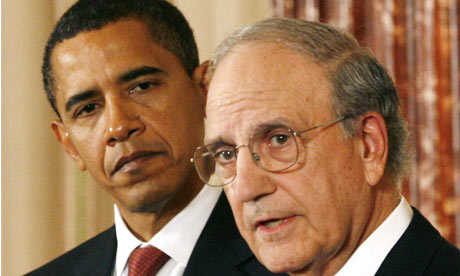 |
According to the President's statement:
"He is – by any measure – one of the finest public servants that our nation has ever had. Even though he already had an extraordinary legacy – serving the people of Maine, leading the Senate, and bringing peace to Northern Ireland – he took on the toughest job imaginable and worked grueling hours to advance the interests of the United States and the cause of peace."
The comparison to Northern Ireland is fatuous. When Mitchell was "bringing peace" to Northern Ireland in the 1990s, it was not a generational Crisis era, and the sectarian conflict between Catholics and Protestants was nowhere near a crisis war.
By contrast, the Palestine region is in a full-fledged generational Crisis era, headed for a new war, refighting the war between Jews and Arabs that followed the partitioning of Palestine and the founding of the state of Israel, 63 years ago yesterday, on May 14, 1948.
So Mitchell never had a chance to bring peace. The poor guy kept shuttling back and forth between Ramallah and Jerusalem, hoping to work his Northern Ireland magic again. But with the wrong generational constellation in place, there was no magic to be found.
Let's not forget that there's another Mideast envoy, Tony Blair, who was appointed by the Middle East Quartet (United Nations, Russian Federation, United States, European Union) on the day in 2007 when he resigned as prime minister of Britain.
Tony Blair was also going to bring peace to the Mideast. Blair is often given credit for ending the bloody Sierre Leone civil war in 1999. But the Sierre Leone civil war had already climaxed, so it was going to end anyway.
As an aside, it's worth remembering the late Richard Holbrooke, who was appointed special envoy to Afghanistan and Pakistan, because of his work brokering the Dayton Peace Accords that ended the Bosnian War in 1995. However, that war had ALSO already climaxed at the massacre at Srebrenica.
I don't wish to take away from anyone's accomplishments, but I'm just saying that a genocidal crisis war is an elemental force of nature that must run its course, and it's just as much a part of human DNA as sex is. Peace is not an option in the Mideast.
From the point of view of Generational Dynamics, I sometimes compare a crisis war to a ball rolling down a hill. A war may begin with years or even decades of low level violence -- occasional terrorist acts or police actions, but with general restraint on both sides. In the analogy, the ball might start out very slowly, going back and forth, perhaps getting stuck in the tall grass. Soon it starts to pick up speed, going faster and faster, gathering momentum. Once it has enough momentum, it can't be stopped by any human force. Finally it reaches the bottom in a massive explosion. In the case of a crisis war, it starts out slowly, and becomes increasingly violent as time goes on, ending in a crisis climax, a massive genocidal explosion.
But once the explosive climax has been reached and passed, a new phase begins, and the society enters a "recovery" phase. The survivors of the war vow that they'll never let anything so horrible ever happen again, and they set up institutions and define austere rules to guarantee it. People like Blair and Holbrooke were part of the generational Recovery Era in their respective negotiations.
None of that applies in any way to the current situation between the Palestinians and Israelis. As I wrote in 2003 in "Mideast Roadmap - Will it bring peace?", my first posted Generational Dynamics analysis, the region is headed for war that cannot be prevented.
Mitchell and Blair were not the first Mideast envoys since then.
In 2005, the Quartet appointed James Wolfensohn to be Mideast envoy. He actually accomplished quite a bit. He negotiated several agreements between the parties. And, as former President of the World Bank, he used his formidable list of contacts to get investors to purchase dozens of greenhouses left behind by Israeli settlers when they left Gaza, so that Palestinians could use them right away to get hard currency by growing food for exports.
When Wolfensohn resigned in 2006, I wrote about it in "International game of 'chicken' leading to disaster in Gaza", and I quoted the following from an Israeli commentator:
"But Wolfensohn is leaving in apparent disgust with the Israelis, the Palestinians, and the international community, regarding the entire effort to isolate the Hamas government a punishment of the Palestinians, which will only lead to more despair and intransigence on the Palestinian side. Ever the diplomat, he is not stating outright how disgusted he is, but he has made clear that he is furious about broken Israeli promises to take steps to ease conditions for the Palestinians, particularly Gazans, where half the population is now living beneath the World Bank's own measure of poverty -- less than $2 a day. He's no less frustrated by the Palestinians, particularly their inability to rein in the lawlessness that took over in Gaza. Indeed, while some of the greenhouses he purchased were successfully handed over to Palestinians (who are going bankrupt because of Israeli security restrictions that make agricultural exports out of Gaza extremely slow and difficult) others were ruined by in fighting by rival gangs that nobody in Gaza can control. As for the international community, which 'hired' him as an expert in economic development, he is disgusted with its inability to intervene with anything other than isolation of the Hamas government."
Wolfensohn got out just in time, as the war between Israel and Hizbollah in Lebanon began shortly thereafter. That was followed by the war between Fatah and Hamas in 2007, and then the Operation Cast Lead war between Israel and Hamas in Gaza early in 2009. See what I mean about the ball rolling down the hill, gathering momentum?
Today we seem inexorably headed for the creation of a Palestinian state by international mandate in the United Nations by September. I cannot for the life of me see how that's going to work, based on pre-1967 borders. That's just a formula for another war.
In the meantime, the entire Mideast region is inflamed. The Tunisian and Egyptian uprisings are showing signs of increased violence, the Libyan uprising is nowhere near an end, the Yemen uprising is growing more violent, and tensions are growing between Iran and Saudi Arabia over the situation in Bahrain. The Syrian uprising is leveling off (Syria itself is in a generational Awakening era, not a Crisis era), but it's spilling over into Lebanon, where the Palestinian population is becoming increasingly restive.
It would be nice if mediators like Mitchell, Blair, Wolfensohn and Holbrooke could actually accomplish something, but once generational theory tells you what's really going on, you realize that they can neither cause nor prevent the events that they're supposed to influence. We hope that George Mitchell enjoys his retirement.
(Comments: For reader comments, questions and discussion,
see the 15-May-11 News -- Mideast envoy George Mitchell resigns, ending one more grand peace process
thread of the Generational Dynamics forum. Comments may be
posted anonymously.)
(15-May-2011)
Permanent Link
Receive daily World View columns by e-mail
Donate to Generational Dynamics via PayPal
Pakistan reportedly drops intelligence sharing with the CIA
This morning's key headlines from GenerationalDynamics.com.
Syria has been cracking down violently on protesters in the town of Talkilakh, on the border with Lebanon. Hundreds of women and children are fleeing into Lebanon, while the men remain in Syria to protect their homes. With at least 250,000 Palestinian refugees living in Lebanon, most of whom are deprived of basic human rights, and thousands of Iraqi refugees receiving insufficient attention and care, Lebanon is hardly capable of coping with its current refugee populations, much less new ones. Palestine Chronicle
Violence erupted in a Cairo neighborhood on Saturday when some 2,000 pro-Coptic protesters clashed with several dozen unidentified men, leaving at least two people injured. Egyptian riot police were deployed and created a human barrier between the protesters of dozens of unidentified men, dressed in plain clothes, who began firing live ammunition into the air and attacking the demonstrators with sticks and stones. They also threw Molotov cocktails. It was not immediately clear who the attackers were or what their motive was. CNN
Officials at Pakistan's ISI intelligence services are furious about being double-crossed by the CIA in misleading them about intelligence related to the killing of Osama bin Laden. There are reports that ISI is refusing to share details of suspects or plots with their American counterparts in protest, raising the potential threat of attacks on Western cities. Telegraph
Pakistan's parliament is threatening reprisals for American military actions on Pakistan's soil -- the drone strikes and the military action that killed Osama bin Laden. The lawmakers also threatened to prohibit Nato from ferrying military supplies into Afghanistan if Washington continued its campaign of drone strikes against militants. Military supplies have been reaching land-locked Afghanistan by overland routes through Pakistan, starting from Karachi. LA Times
 |
The relationship between Russian President Dmitry Medvedev and Prime Minister Vladimir Putin has been called a "tandem leadership," since they seem to complement each other without friction. But now, with both of them eligible to run for president in next year's elections, there are signs of friction. Medvedev is withholding approval of some of Putin's initiatives, and has appeared to criticize Putin for his statements on Libya. Ria Novosti
North Korea and Iran have been regularly exchanging ballistic missile technology in violation of U.N. sanctions. The illicit technology transfers had "trans-shipment through a neighboring third country," apparently China. "Prohibited ballistic missile-related items are suspected to have been transferred between the Democratic People's Republic of Korea (North Korea) and the Islamic Republic of Iran on regular scheduled flights of Air Koryo and Iran Air," according to a U.N. report. Reuters
Osama bin Laden's al-Qaeda is no friend of Iran, being a Sunni terrorist group that has targeted Shia Iran in the past. However, Iran cannot be pleased by the killing of bin Laden, since it gives greater prestige to President Obama, and because it raises the possibility of some similar kind of U.S. military operation in Iran. Meir Javedanfar
Osama bin Laden must have been driven nuts by living in the same home as three wives and 17 children. Time
(Comments: For reader comments, questions and discussion,
see the 15-May-11 News -- Mideast envoy George Mitchell resigns, ending one more grand peace process
thread of the Generational Dynamics forum. Comments may be
posted anonymously.)
(15-May-2011)
Permanent Link
Receive daily World View columns by e-mail
Donate to Generational Dynamics via PayPal
Erdogan and Ahmadinejad have very different Mideast strategies
The warming relations between Turkey and Iran have been troubling to the West, but there is great potential for dispute between the two countries.
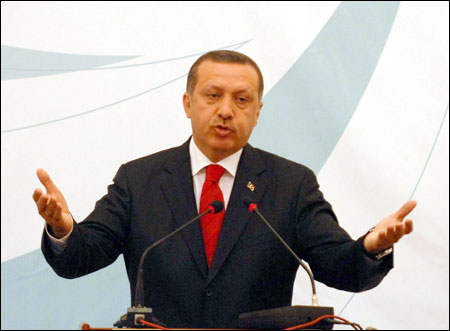 |
In fact, the basic interests of Ankara and Tehran collide, in some if not most issues, according to an analysis by the Foreign Policy Research Institute (FPRI). These colliding interests could lead to disagreements, and in the long run even conflict, between these two major non-Arab powers in the Middle East.
Today's most visible policy difference is in Syria. Both Iran and Turkey would like to see Syrian President Bashar al-Assad stay in power, but for different reasons: Turkey would like to see Assad take "a reformist, positive approach," while Iran wants Assad to resist Israel and strengthen Hezbollah as a proxy against the "Zionist entity."
Libya presents even sharper differences. Turkey is cooperating with Nato's military intervention, while Iran called the Nato intervention "a big stupidity" and predicted "that the NATO-US invasion would throw them to the depth of an abyss," something which the Turks do not wish to hear.
In fact, the uprisings in Syria and Libya are causing a number of foreign policy problems for Turkey in the Arab world, according to Jamestown.
Turkey's prime minister Recep Tayyip Erdogan has tried to maintain his popularity in the Arab world by taking moderate positions on the Arab uprisings, but that has resulted in some criticisms, because of his slow response. He didn't support Nato's military intervention in Libya at first, but only reversed policy when Muammar Gaddafi's forces became particularly bloody, leading many to believe that Erdogan has no principled position on the Arab uprisings. The situation in Syria is posing an even more difficult dilemma as the Syrian response to its uprising becomes increasingly violent and bloody, risking a flood of Syrian refugees pouring across the border into Turkey.
If Turkey and Iran come to a military confrontation, it will probably be over the Israeli-Palestinian conflict. Turkey supports a settlement between the Israelis and the Palestinians, while Iran opposes Israel's existence, and is trying its best to prevent a settlement.
In a television interview on Thursday, Erdogan said he considered Hamas as a political party or a resistance movement instead of a terrorist organization, according to Turkish Weekly. He added, "I have exerted great efforts to unite Al Fatah and Hamas over the past years during my term in office and now I am very happy to see that happen. If peace would come to the Middle East, it would start from peace in Palestine."
Another hot spot in Turkey-Iran relations is "Kurdistan," the region in northern Iraq that overflows into both Turkey and Iran. Turkey has been the target of numerous terrorist attacks by the PKK Kurds for years, and Kurdish rebel leader Ocalon is threatening a "big war" with Turkey, according to AP.
Another Kurdish group, the Free Life Party of Iranian Kurdistan, known as PJAK, is considered the Iranian "branch" of the PKK, according to Newsmax. The group is based in guerilla camps in northern Iraq, and Iran has recently moved tanks and artillery close to the guerilla camps, apparently in preparation for military action.
American troops are scheduled to be out of Iraq by the end of this year. The fear is that the American troop withdrawal from Iraq will leave a power vacuum that will be filled by invasions of Kurdish regions by both Turkey and Iran.
The departure of U.S. troops could leave Iraq vulnerable. It cannot yet protect its own airspace, and relies on the U.S. for intelligence-gathering capabilities and logistics and maintenance of its military equipment. For that reason, Iraq's prime minister Nouri al-Maliki is beginning to suggest that American troops should stay past the December 31 deadline, according to the AP.
Other issues where Turkey's interests collide with Iran's are the following, according to FPRI:
As the two biggest non-Arab Muslim states in the region, Turkey and Iran are more competitors than allies. As the Clash of Civilizations war approaches, each country will eventually be forced to choose a side. It's very unlikely that they'll be on the same side.
(Comments: For reader comments, questions and discussion,
see the 14-May-11 News -- Syria, Libya and Iraq aggravate the Turkey-Iran axis
thread of the Generational Dynamics forum. Comments may be
posted anonymously.)
(14-May-2011)
Permanent Link
Receive daily World View columns by e-mail
Donate to Generational Dynamics via PayPal
85% of international investors say that Greece will default
This morning's key headlines from GenerationalDynamics.com.
During the credit bubble a few years ago, the world could count on America's "generation of 'zombie consumers'" to spend their time at the mall, providing the foundation on which Western prosperity was built. However, these recovering shopaholics face "years of retrenchment," according to Morgan Stanley's Stephen Roach. U.S. consumer spending rose only 2.7% in the first quarter, down sharply from 4% in the last quarter of 2010. This is a big deal, considering that the consumer accounts for about 70% of the US economy, down from 71.3% during the bubble. The long-term average is 66%, so by the Law of Mean Reversion, it will fall to about 60% as the financial crisis worsens. Extending unemployment benefits, mortgage forgiveness, and massive government and monetary stimulus are likely to "inhibit the deleveraging and balance-sheet repair that America’s zombie consumers now need for post-crisis healing," according to Roach. "Notwithstanding government life-support initiatives, U.S. consumers seem headed for years of retrenchment." Money News and Globe & Mail
In a survey of international investors, 85% said that Greece will probably default on its debts, despite the austerity measures and EU bailouts. A majority of those surveyed predict the same fate for Portugal and Ireland, which followed Greece in asking for EU bailouts. According to one analyst, "All these countries will go bust at some stage. I just can’t see a scenario in which these countries get out of their debt problems." However, the European Central Bank says that a Greek default would cause financial disaster. Bloomberg
The deadliest terrorist attack this year in Pakistan killed at least 70 paramilitary recruits and 17 civilians in a twin suicide bombing attack on the Frontier Constabulary's headquarters in Shabqadar, near Peshawar, in Pakistan. Tehrik-i-Taliban Pakistan (TTP), the Pakistan Taliban, claimed responsibility for the attack, and said that the attack had been carried out to avenge the killing of Al Qaeda leader Osama bin Laden in Abbottabad. Dawn
In harsh language from after more than ten hours of debate on "situation arising from unilateral US action in Abbottabad," Pakistan's parliament demanded an end to US drone strikes on its territory and called for an independent probe into the raid by US troops that killed Osama bin Laden. AFP
On Friday, 6,000 Palestinians in Jordan gathered near the border with Israel to mark the founding of Israel and to demand to be allowed to return to the land that Israel took from the Palestinians in the genocidal war between Jews and Arabs that followed the 1948 partitioning of Palestine and the creation of the state of Israel. The largely peaceful rally was organized by the Jordanian Muslim Brotherhood, trade unions and other political movements. CNN
Hostility between Iran and Saudi Arabia has greatly increased over the Bahrain uprising that pits a Sunni government, supported by the Saudis, against the Shia protesters, supported by Iran. In particular, the Iranians have objected to the Saudis' military intervention on the side of the Bahrain government's bloody crackdown. A senior member of Iran's Revolutionary Guards close to Mahmoud Ahmadinejad is calling for Iranian intelligence to train Hizbollah-like Shia cells to carry out sabotage with explosives in Saudi Arabia. Al-Bawaba
(Comments: For reader comments, questions and discussion,
see the 14-May-11 News -- Syria, Libya and Iraq aggravate the Turkey-Iran axis
thread of the Generational Dynamics forum. Comments may be
posted anonymously.)
(14-May-2011)
Permanent Link
Receive daily World View columns by e-mail
Donate to Generational Dynamics via PayPal
Thousands of African migrants head for Italy
As the United States tries to deal with its own immigration problems on the border with Mexico, the growth of right-wing nationalism in Europe is creating a crisis that strikes at the very heart of the EU project.
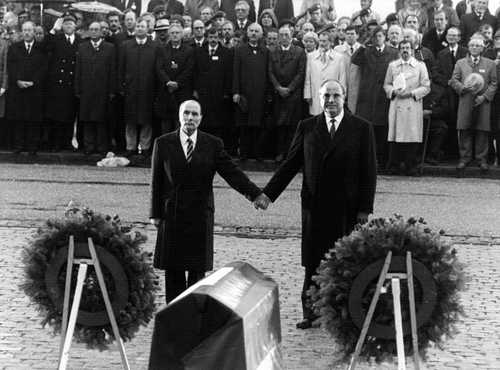 |
Denmark has said that it plans to unilaterally enforce stricter border controls, in violation of a 1995 agreement called the "Schengen Agreement," signed by the EU nations, guaranteeing an "open border" policy among EU nations, according to France24.
Denmark was heavily criticized at a special meeting of EU interior ministers, according to the AP. According to the Hungarian minister:
"Currently, the majority view is that one country should not be in a position to make a decision like that. That might trigger a chain reaction that might shatter confidence in other countries. So we do not want to let it happen."
The controversial Danish policy was lead by the right wing Danish People's Party (DPP), and one poll found that 75% of Danes backed the new policy, according to UTV (Ireland).
But some Danes fear that the legislation will be ineffective at fighting crime and will damage national reputation. According to a history teacher quoted by the article:
"It is an expression of xenophobia. I guess Pia Kjaersgaard [the DPP leader] is scared of all the people who will come flooding up from the Arab countries. Presumably, the idea behind this is to catch criminals but it is border control officers who are at the borders, not police. Unless the officers have police privileges it doesn't make any sense."
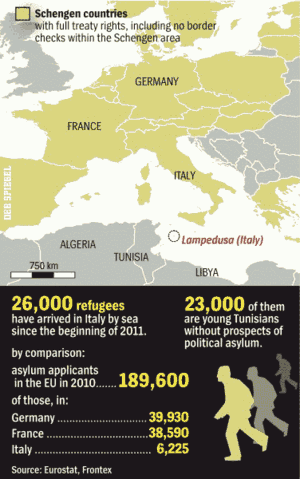 |
Indeed, it's the flow of refugee migrants from northern Africa and black Africa that's motivating this change in policy. Italy and France are planning to implement some border controls to stop the flow of migrants who travel to Italy hoping to reach France and then the UK. Some 25,000 Tunisians have already reached Italy, and thousands more are taking to the sea in overcrowded and unseaworthy boats, according to Jamestown.
According to the article,
"Last year, Mu’ammar Qaddafi struck a €50 billion deal with the European Union to regulate its borders as a “transit country” for refugees and economic migrants from Sub-Saharan Africa. Despite this payoff, Qaddafi has not hesitated to use it against Europe, threatening to “turn Europe black” if various demands are not satisfied (Der Spiegel, February 24). The French minister of foreign affairs, Laurent Wauquiez, has warned: “Libya is the funnel of Africa. Flows of illegal immigrants from countries such as Liberia, Somalia and Eritrea pass through Libya. We must defend our frontiers on a European level. What we're talking about isn't a few tens of thousands of illegal immigrants who could arrive in Europe; it's a potential 200,000 to 300,000 this year” (Radio France Internationale, March 2)."
With the possibility that some of these migrants will be terrorists, there's a real security threat to Europe in this wave of migrants, although it's not clear to me how border controls between Italy and France will make much difference.
In contrast to this security threat is the concern of a lot of people that ending Europe's "open borders" policy could mean the end of the entire EU project. (Imagine if the United States implemented border controls between states within the Union.)
Referring to the photo at the top of this report, a Spiegel commentary tells how things have changed:
The photo has been reprinted enough to be branded into the collective memories of Germany and France. It shows Helmut Kohl and Francois Mitterand standing hand-in-hand during a 1984 commemoration ceremony at Verdun. Their gesture illustrates the astounding reconciliation that took place between their respective nations after two world wars. Today, its emotionalism is both moving and oddly foreign.Back then, what would ultimately become the European Union was more than just a body for administering financial transfers between member countries. When people talked about "Europe," they focused on the big issues: open borders, international understanding, war and peace. These weren't just empty words but, instead, things that statesmen like Kohl and Mitterand felt deeply about. And since it came from the heart, people believed in what they said.
This passion has disappeared from the debate over the European Union. Indeed, these days, merely saying that the European idea transformed a war-torn continent into an island of freedom and stability would seem rather quaint to most. Now the issue is whether Europe can even be prevented from becoming a transfer union -- or, in the words of Germany's tabloid press, how much we want "to pay for the lazy Greeks?"
This is generational change at its height. Kohl and Mitterand had lived through World War II, when they were enemies. America was traumatized by 9/11, but Kohl and Mitterrand lived through several 9/11's every day for several years. To them, this moment must have seemed the pinnacle of their lives. Today's officials, by contrast, have little sense of that history.
"Today, everyone agrees that xenophobia and populist parties are gaining ground. Extremism and discrimination are major threats against our societies," says Turkey's Foreign Minister Ahmet Davutoglu, quoted by Zaman. "We all need to be in solidarity across Europe in regard to our common values."
Davutoglu is talking about Muslims in Europe, but he might have said the same thing about Japanese in China, Han Chinese in Xinjiang, Americans in Mexico, Coptic Christians in Egypt, or any of hundreds of other examples around the world.
I've been writing about xenophobia for years, because it's predicted by Generational Dynamics as occurring in every generational crisis era. Typically, xenophobia continues to worsen, exacerbated by population growth, shortages or resources like food and water, and increased nationalism, leading to wars of extermination. In today's world, those wars of extermination will spiral into the Clash of Civilizations world war. As the Europeans give up their most prized accomplishments, it's happening right before our eyes.
(Comments: For reader comments, questions and discussion,
see the 13-May-11 News -- Europe's immigration crisis strikes at heart of European Union
thread of the Generational Dynamics forum. Comments may be
posted anonymously.)
(13-May-2011)
Permanent Link
Receive daily World View columns by e-mail
Donate to Generational Dynamics via PayPal
Egypt's Muslims may donate money instead of going to Mecca
This morning's key headlines from GenerationalDynamics.com.
The Obama administration had "very detailed contingency plans" for military action against Pakistani forces if they had tried to stop the U.S. attack on Osama bin Laden's compound. "No firepower option was off the table" during the operation, according to an unnamed US official. CNN
The US and Pakistan struck a secret deal almost a decade ago permitting a US operation against Osama bin Laden on Pakistani soil. The deal was struck between the military leader General Pervez Musharraf and President George Bush after Bin Laden escaped US forces in the mountains of Tora Bora in late 2001. Under its terms, Pakistan would allow US forces to conduct a unilateral raid inside Pakistan in search of Bin Laden, his deputy, Ayman al-Zawahiri, and the al-Qaida No3. Afterwards, both sides agreed, Pakistan would vociferously protest the incursion. Guardian
China's growing military and economic power is causing the South Koreans to reevaluate their relationship with the United States. Ideally, they would prefer not to have to choose between China and the U.S., but circumstances force a choice. Under the current Lee Myung-bak administration, Seoul has been conspicuously leaning closer toward Washington, but that could change. Asia Times
The head of the International Union for Muslim Scholars has issued a fatwa saying that Egyptian Muslims who had been planning to make a pligrimage to Mecca may, instead, donate the money reserved for the pilgrimage toward supporting the country's economy, and this counts as if he has performed the pilgrimage. Muslims are required to make a pilgrimage to Mecca at least once in their lifetimes, but this ruling relieves them of having to go even once. Memri
Palestinian President Mahmoud Abbas is leaning towards retaining his prime minister, Salam Fayyad, in the unity government that's being formed as a result of the Fatah-Hamas reconciliation agreement. Hamas considers Fayyad to be a tool of the West, but he's a U.S.-educated economist, and keeping him would improve the Palestinians' chances of continue to receive Western aid. AP
Like almost everyone else, the political and terrorist group Hizbollah, and its leader Sayyid Hassan Nasrallah, are having difficulty deciding which Arab uprisings to support. Nasrallah's has vocally criticized the governments of Tunisia, Libya, Bahrain, Egypt and Yemen over their uprisings, but he's been silent about the uprising directed against his own allies, Syria and Iran. This has cost him some credibility, but more important, it's derailed his plans for greater prominence in the entire region. Asia Times
The Chinese authorities pointed to its seven consecutive years of grain harvests and huge grain reserves, but there are reasons to doubt that these claims are accurate. One reason for doubt is the increase in China's imports of grains. Another reason is the explosive real estate boom of the last few years, reducing the size of its total arable land. <#stdurl http://www.eurasiareview.com/chinas-food-security-questioning-the-numbers-analysis-09052011/ "Rajaratnam School of International Studies (RSIS)" Adding further to the doubts is China's announcement that food prices are surging in China, up 11.5% in April from a year earlier. This is much higher than the rate of inflation, as non-food prices rose 2.7%. Global Times (Xinhua)
More than 20,000 servicement marched on Red Square in Moscow on May 9, to commemorate victory in the Great Patriotic War (WW II), but the amount of military hardware on display was much less than in previous years. The present day Russian military is indeed a pale shadow of the once awesome Red Army of the Cold War era. Jamestown
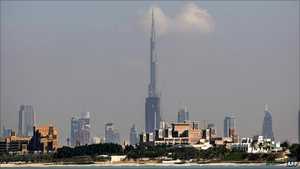 |
A man has committed suicide by jumping from the world's tallest skyscraper in Dubai. He fell from the 147th floor, landing on a deck on the 108th floor. He jumped following a dispute with his employer. BBC
A founder of a religious cult glorifying Russian Prime Minister Vladimir Putin believes that he's the reincarnation of Saint Paul. The sect's founder, Mother Fotinya, was quoted as saying that there were certain parallels between the life of former president Putin and St. Paul. "According to the Bible, Paul the Apostle used to be a warlord and the fierce persecutor of Christians, and then he began preaching the Gospel. Putin also was not a saint during his service in the KGB. But when he became president, the Holy Ghost descended on him." Ria Novosti
(Comments: For reader comments, questions and discussion,
see the 13-May-11 News -- Europe's immigration crisis strikes at heart of European Union
thread of the Generational Dynamics forum. Comments may be
posted anonymously.)
(13-May-2011)
Permanent Link
Receive daily World View columns by e-mail
Donate to Generational Dynamics via PayPal
Regulators are as guilty as banksters
Billionaire hedge fund manager Raj Rajaratnam was convicted on Wednesday of 14 counts of insider trading, according to Bloomberg.
 |
He had a network of insiders at companies like Intel, Goldman Sachs, Google and Hilton Hotels who provided him with specific information about earnings, forecasts and mergers in advance of public information, and then he traded on that information. He made $63.8 million from illegal insider trading. He's expected to be sentenced to about 19 years in jail.
One can understand and sympathize with a Jean Valjean who steals a loaf of bread to feed his family, or even an ordinary employee who makes a couple of thousand dollars by purchasing a some stock after hearing some insider news.
But here you have a billionaire who blatantly broke the law to make $60 billion more. Listening to some of the wiretap recordings on TV, you can hear what contempt he has for the rules. This is a man who considers breaking the law for his own gain, f--king the system, f--king ordinary investors, to be like a fun video game where he had a higher score than other crooks.
Even so, it's almost a miracle that he was charged with anything. As I wrote last year ( "23-Oct-10 News -- Prof. William K Black on dereliction of duty by FBI"), William Black was the prosecutor was the senior regulator investigating the savings and loan crisis of the 1980s. He had thousands of criminal referrals, and got over a thousand priority felony convictions of the elites -- the top people at the savings and loans. By contrast, today's regulatory agencies had ZERO criminal referrals -- not a one. According to Black:
"This is a crisis that we know empirically involved million of fraudulent mortgages being made. We know that the losses are out there. We know that the industry extorted FASB to gimmick the accounting rules, so they didn't have to recognize the losses. We know that the Fed has huge positions as collateral in these fraudulent mortgages. We've seen the Fed, Ambac, Fannie, Freddie, Pimco, Blackrock -- all putting back after investigating tens of billions of dollars of mortgages, and saying, these were sold under false representations and warranties -- frauds, and absolutely no one has gone to jail for it."
Black points to collusion between the FBI and the Mortgage Bankers Association -- "the trade association of the perps" -- as one reason.
The reason that there were thousands of criminal referrals in the 1980s savings and loan crisis is because the Silent generation, who had a sense of ethics, were still in charge at that time. The reason that there are ZERO criminal referrals in today's crisis is because the Boomers and Gen-Xers are in charge, and today's regulators are just as crooked and incompetent as the perpetrators, and have NO morality or ethics.
For an example of this, see my 2008 report, "Bond insurer 'bailout' appears near crisis point." In that report, I described how New York Insurance Superintendent Eric Dinallo repeatedly colluded with banks, including Citibank, and bond insurance firms, to lie to the public and defraud investors.
This isn't the first time this has happened. It also happened in the 1930s. People were sent to jail then because of the Pecora Commission. Here's how it was described in the 1939 book Since Yesterday by Frederick Lewis Allen:
"Intermittently throughout the year 1933 the Senate Committee on Banking and Currency, with the aid of its inexorable counsel, Ferdinand Pecora, had been putting on one of the most extraordinary shows ever produced in a Washington committee room: a sort of protracted coroner's inquest upon American finance. One by one, a long line of financial overlords--commercial bankers, investment bankers, railroad and public-utility holding-company promoters, stockbrokers, and big speculators--had filed up to the witness table; and from these unwilling gentlemen, and from their office files, had been extracted a sorry story of public irresponsibility and private greed. Day by day this story had been spread upon the front pages of the newspapers.The investigation showed how pool operators in Wall Street had manipulated the prices of stocks on the Exchange, with the assistance of men inside the companies with whose securities they toyed. It showed how they had made huge profits (which represented the exercise of no socially useful function) at the expense of the little speculators and of investors generally, and had fostered a speculative mania which had racked the whole economic system of the country--and this not only in 1928 and 1929, but as recently as the spring of 1933, when Roosevelt was in the White House and Wall Street had supposedly been wearing the sackcloth and ashes of repentance. The investigation showed, too, how powerful bankers had unloaded stocks and bonds upon the unwary through high-pressure salesmanship and had made millions trading in the securities of their own banks, at the expense of stockholders whose interests they claimed to be serving. It showed how the issuing of new securities had been so organized as to yield rich fruits to those on the inside, and how opportunities to taste these fruits had been offered to gentlemen of political influence. It showed how that modern engine of financial power, the holding company, had been misused by promoters: how some of these promoters had piled company upon company till their structures of corporate influence were seven or eight stories high; how these structures had become so complex that they were readily looted by unscrupulous men, and so unstable that many of them came crashing down during the Depression. It showed how grave could be the results when the holding-company technic was applied to banking. It showed how men of wealth had used devices like the personal holding company and tricks like the sale of stock (at a loss) to members of their families to dodge the tax collector--at the very moment when men of humbler station had been paying the taxes which supported the government. Again and again it showed how men occupying fiduciary positions in the financial world had been false to their trust."
This is exactly what's happening today, except that there's no Pecora Commission to throw these people in jail. There are too many regulators, analysts, journalists and politicians, Democrats and Republicans, in bed with the crooks to risk delving too deeply.
When the Financial Crisis Inquiry Commission hearings began in Congress a couple of years ago, I had hoped that they would perform the same role as the Pecora Commission, especially when they elicited testimony that proved mathematically that the banksters had committed fraud. (See "Financial Crisis Inquiry hearings provide 'smoking gun' evidence of widespread criminal fraud.")
However, I was severely disappointed when the FCIC hearings essentially came to nothing.
So call me a cockeyed optimist, but I'm hoping that the well-deserved conviction of Raj Rajaratnam will lead to a new Pecora Commission, and to sending a lot of perpetrator banksters to jail. But I won't hold my breath.
Update: A new article by Mike Taibbi in Rolling Stone has just been posted today, detailing years of specific crimes by Goldman Sachs executives, as determined by the Senate Subcommittee on Investigations, chaired by Democrat Carl Levin. The investigation showed that Goldman executives created and sold billions of dollars worth of fraudulent synthetic securities (residential mortgage backed collateralized debt obligations squared), knew that the securities were fraudulent, and then "shorted" the market, betting that their own clients would be wiped out by the securities that Goldman sold them. The result was that Goldman made billions of dollars by knowingly screwing their own clients. During the Levin committee hearings, Goldman executives lied about material facts. Despite all this, the Obama Justice Department is refusing to prosecute. (Paragraph added - 12-May)
(Comments: For reader comments, questions and discussion,
see the 12-May-11 News -- Raj Rajaratnam conviction raises hopes of Pecora Commission revival
thread of the Generational Dynamics forum. Comments may be
posted anonymously.)
(12-May-2011)
Permanent Link
Receive daily World View columns by e-mail
Donate to Generational Dynamics via PayPal
Egypt faces starvation as economy collapses
This morning's key headlines from GenerationalDynamics.com.
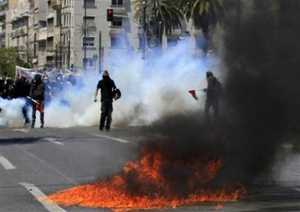 |
Police clashed with protesters in Athens and Thessaloniki in Greece on Wednesday as 20,000 people participated in street protests against a new wave of austerity cuts. When Greece received a bailout one year ago, Greek Prime Minister George Papandreou confidently assured the people that the austerity measures announced at that time, in combination with the bailout, would solve Greece's debt problem, and no further austerity would be required. It's now evident that (a) Greece's debt problem is NOT solved; (b) Greece needs another bailout; (c) Greece will have to impose additional harsh austerity measures; but (d) the new bailout and new austerity measures will STILL not solve Greece's debt problem. Reuters
With large protests continuing in cities around Syria, president Bashar al-Assad is considering two strategic choices to remove the pressure from his administration: Going to war against Israel, and/or sending weapons to Palestinians and Israeli Arabs for use in terrorist attacks against Israel, to foment an armed uprising against both Israel and Palestinian Authority president Mahmoud Abbas. Hamas' political leader Khaled Meshaal is relocating from Damascus to Gada, providing Egypt with the opportunity to play a more active role in the Palestinian arena, and providing Assad with a conduit for weapons transfers. Debka
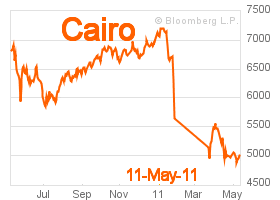 |
Egypt is the most populous country in the Arab world, and imports half its wheat. But the country is showing all the symptoms of national bankruptcy and hyperinflation, and distribution of food supplies is being disrupted. The Ministry of Solidarity and Social Justice is already forming "revolutionary committees" to mete out street justice to bakeries, propane dealers and street vendors who "charge more than the price prescribed by law," as if that will work. Half of Egyptians live on $2 a day, and that $2 is about to collapse along with the national currency. At the rate Egypt is losing foreign exchange reserves, the country will be broke by September. Asia Times
A version of the fiscal 2012 defense authorization bill contains language expressly permitting the Defense Department to conduct clandestine cyberspace operations outside of the United States in support of military operations. Fierce Government IT
The U.S. Postal Service lost $2.2 billion in the most recent quarter. "Snail mail" has been getting less popular, as mail volume has spread to e-mail. Total mail volume in the last quarter fell to 41 billion pieces, from 42.3 billion in the same period last year. However, expenses have been rising as well, especially prepaid retiree health benefits. The service will run out of money by September. CNN
(Comments: For reader comments, questions and discussion,
see the 12-May-11 News -- Raj Rajaratnam conviction raises hopes of Pecora Commission revival
thread of the Generational Dynamics forum. Comments may be
posted anonymously.)
(12-May-2011)
Permanent Link
Receive daily World View columns by e-mail
Donate to Generational Dynamics via PayPal
EU imposes sanctions on Libyans, but not on the president
Syria might not be elected to the U.N.'s Human Rights Council after all. Syria has been poised for some time to be elected by the U.N. General Assembly to the "Arab seat" on the Human Rights Council. However, with Syria's streets filled with the blood of hundreds of peaceful pro-democracy protesters, the prospective election, scheduled for May 20, appears to have been too embarrassing for even the United Nations, as well as the Arab League.
As a result, Syria is negotiating with the U.N. to concede the seat to Kuwait, in return for getting some equally prestigious post in the future. Jerusalem Post
 |
It's getting harder for Syria's protesters to move around. Many have been arrested or killed. The army and security forces have sealed off the main cities with tanks and roadblocks. Snipers are on rooftops, shooting at anything that moves, according to Reuters. Security forces are mowing down or rounding up protesters.
The European Union has placed sanctions on 13 Syrian officials, but not on President Bashar al-Assad himself, according to Al-Jazeera. The targets include his brother, Maher al-Assad, who commands the Republican Guard and is considered the second most powerful man in the country. The EU sanctions described him as the "principal overseer of violence against demonstrators."
EU officials have not imposed sanctions on the president himself, because they are hoping that he's a potential reformer held back by hardliners in his entourage.
Concern is growing that the uprising in Syria might destabilize other Mideast nations, starting with Lebanon.
Syria has already blamed Lebanon's "Future Movement" faction for the violence in Syria by arming and funding anti-regime protestors, according to Xinhua. The fear is that sectarian violence in Syria will spread to sectarian violence in Lebanon.
(Comments: For reader comments, questions and discussion,
see the 11-May-11 News -- Syrian regime shooting at anything that moves
thread of the Generational Dynamics forum. Comments may be
posted anonymously.)
(11-May-2011)
Permanent Link
Receive daily World View columns by e-mail
Donate to Generational Dynamics via PayPal
Iran's 'Morality Police' will be working overtime this summer
This morning's key headlines from GenerationalDynamics.com.
On May 10, Israel celebrated the 63rd anniversary of the creation of Israel, with parties, fireworks and barbeques. On May 14, the Palestinians will also commemorate the 63rd anniversary of "al-Naqba," the catastrophe, with protest marches. AFP
U.S. State Dept. spokesman Mark Toner criticized Israel's decision, following the signing of the Hamas-Fatah reconciliation deal, to withhold $105 million in tax revenues that Israel collected on behalf of the Palestinians. Toner said that the U.S. government position is that:
"[W]e believe that we need to wait and see. We believe it's premature to make any decisions. What's important now is that the Palestinians ensure implementation in a way that advances the prospects of peace.We are looking to see what this reconciliation agreement looks like in practical terms, before we make any decisions about future assistance.
We understand [Israel's] concerns, and I would just say, as the new Palestinian government's formed, we'll assess it based on its policies and we'll determine the implications for our assistance"
It slipped out during an interview on human rights in Libya, Syria, and other Mideast countries, when U.S. Secretary of State Hillary Clinton was asked about human rights in China, and whether the Chinese were frightened by the Arab uprisings:
"They’re worried. They’re trying to stop history, which is a fool’s errand. They cannot do it, but they’re going to hold it off as long as possible."
European Central Bank (ECB) officials warned of catastrophic consequences if Greece is allowed to restructure its debt (a form of default), calling it "political suicide which leads many into poverty." It was almost exactly a year ago that Europe created a "gobsmacking" aid fund that was used to bail out Greece. ( "10-May-10 News -- Europeans approve trillion dollar aid package") It was clear from the beginning that it would only postpone, not solve, Greece's debt problems, but only now are politicians admitting it, since Greece will run out of money to pay debts about a year from now. It's now becoming increasingly clear that the EU will be forced to provide another bailout of Greece, so that Greece can continue paying debtors for an extra year. The amount is expected to be €60 billion ($86 billion), and it will probably be voted on next week at a regularly scheduled meeting of EU finance ministers Bloomberg
We've commented several times on the repeated denials by EU officials on Friday, and how every one of them turned out to be a flat lie. Mainstream analysts and journalists are finally beginning to recognize what we've been saying for years -- that in this generational Crisis era, lying and fraud are the norm, not the exception. Here's how EuroIntelligence describes the situation:
"Guy Schuller, spokesman for Jean-Claude Juncker, admitted yesterday to lying about the secret meeting of finance ministers on Friday. The Wall Street Journal Real Time Brussels (link) blog has got it all, including the above quote from Mr Schuller, who was contacted by various media groups to whom he denied that the meeting was taking place. "There was a very good reason to deny that the meeting was taking place," Mr Schuller told the WSJ. "It was self-preservation." Helpfully, the WSJ also dug up an older press conference of Mr Juncker, who said "When it becomes serious, you have to lie." In his column on Monday, Wolfgang Münchau also commented on Mr Schuller's lie, adding that he did not believe the pronouncement that the meeting did not discuss a Greek exit from the eurozone either. Furthermore, he no longer believed any statement by any EU officials in respect of this crisis. We are in the stage of the crisis where officials are lying all the time. Lucas Zeise, in his column in FT Deutschland, says the outbreak of lies is the best metric for the pending break-up of the eurozone. He recalls various currency crises from the 1970s and 1980s, in which officials also lied that nothing would happen, until it happened. Zeise says two necessary conditions to avoid a break-up are the acceptance of a transfer union, financed, for example, by a tax on exporters, and the tolerance of large wage increases in northern European countries."
As we reported a few days ago ( "6-May-11 World View"), Portugal has requested a bailout from the EU, and was promised a €78 billion bailout in principle, although Portuguese Prime Minister José Sócrates lied about the details when he announced it. The Portugal bailout has been pushed off the front pages by the growing Greek debt crisis, but now it's time for the bailout in principle turn into a real cash bailout. All eurozone countries unanimously have to approve any bailout package, but Finland's approval depends on a vote by its legislature. The problem is that the nationalistic, euro-skeptic "True Finns" party made a strong showing in Finland's elections two weeks ago, and now they're threatening to hold up the bailout until Portugal goes into default and forces the investors to take a "haircut." Reuters
 |
Ever since Iran's president Mahmoud Ahmadinejad was elected in 2005, he's been sending out morality police to arrest women who aren't dressed modestly enough. (See "Iranian police swoop down on women with loose headscarves.") Now, the head of Tehran's "morality police forces" has announced that 70,000 officers would be deployed to enforce public morality regulations this summer. Radio Zamaneh
In a press conference in Istanbul on Monday, Ahmadinejad said that he doubted that the U.S. killed Osama bin Laden on May 1, that the U.S. is refusing to identify the "real" perpetrators of the 9/11 attacks, and that the West is still hiding the truth about the Holocaust, if it happened at all. He portrayed Iran as a cooperative nation of freedom and love and friendship, forced into a righteous battle against the eternally evil forces of global imperialism, led by the United States and Israel. CS Monitor
(Comments: For reader comments, questions and discussion,
see the 11-May-11 News -- Syrian regime shooting at anything that moves
thread of the Generational Dynamics forum. Comments may be
posted anonymously.)
(11-May-2011)
Permanent Link
Receive daily World View columns by e-mail
Donate to Generational Dynamics via PayPal
The return of toxic synthetic securities
For the last four years, politicians, journalists and analysts have been saying, almost on a daily basis, "housing prices have bottomed out," even though that's mathematically impossible in view of the 7-10 million homes that are in foreclosure or close to foreclosure. These are the same people who, in 2004-7, were saying that there was no housing bubble in the first place.
 |
In fact, the opposite is happening, according to Zillow. Home values fell three percent in the first quarter of this year, accelerating to the fastest rate since 2008. 28% of homes are now "underwater," compared to just 22% a year ago. This means that the rate of foreclosures is going to INCREASE, not decrease.
Last year's claims that housing prices had "bottomed out" were the result of being propped up in 2009 and early 2010 by federal stimulus programs, such as tax credits worth up to $8,000 for first-time homebuyers, according to Zillow Chief Economist Stan Humphries, in a Bloomberg interview. That program "was stealing demand from the future." Now that the stimulus programs have ended, the housing crash is accelerating again.
The housing bubble grew for 11 years before it popped ( "The global housing bubble began in the mid-1990s."), and by the Law of Mean Reversion, we can expect the housing collapse to continue for a roughly equivalent period of time, continuing through almost all of the current decade.
Standard & Poor's ratings services cut Greece's credit rating by two notches on Monday, and said that further reductions are possible, according to Bloomberg.
According to S&P's John Chambers:
"The downgrade reflects our view of increasing sentiment among Greece’s key euro-zone official creditors to extend the debt payment maturities of their 80 billion euros ($115 billion) of bilateral loans pooled by the European Commission. As part of such an extension, we believe the euro-zone creditor governments would likely seek ‘comparability of treatment’ from commercial creditors in the form of their similarly extending bond and loan maturities."
In other words, the EU governments are all going to have to take a "haircut" (lose a chunk of the principal they invested), and they're going to demand that private investors take the same "haircut." The historical average "haircut" in such situations is 40% recovery, meaning 60% loss of principal. So if you're a private investor, it might not be a good idea to invest in Greek bonds.
Recall that a credit default swap (CDS) is a kind of insurance policy on debt that pays off when the underlying debt defaults. When CDS prices rise, it means that investors are increasingly afraid that the underlying debts will default. Once the market has set a CDS price, it's possible to compute what investors believe is the probability that the insurance policy will have to be paid off.
The following chart shows the computed probability of default for the bonds of several European countries:
 |
So, investors believe that the probability of default is 72% for Greece, and about 43% each for Ireland and Portugal.
The deteriorating situation comes after a weekend of total farce. On Friday, Spiegel said that there would be a secret meeting of EU finance ministers in Luxembourg to discuss the possibility of Greece leaving the euro currency and reinstating its old drachma currency. EU officials immediately came out and claimed that there would be no meeting, that if there were a meeting it wouldn't be about Greece, if it were about Greece it wouldn't be about Greece defaulting, and that the idea of Greece leaving euroland was not under any consideration.
By Saturday, it turned out that all those claims were complete lies, and that there had been a previously unscheduled meeting in Luxembourg to discuss a Greek default. However, they still insisted that Greece leaving euroland was not under any consideration. As I pointed out, why should we believe that, when everything else was a lie?
On Monday on the BBC, I heard one financial analyst (whose name unfortunately I didn't catch) give a lengthy explanation of the latter option. He said that Greece was using the threat of leaving euroland to gain leverage for better terms from the EU negotiators. In other words, a Greek departure from the euro WAS under consideration, at least by Greece, and so even that last claim was a lie. So every statement by EU politicians on Friday was a flat lie.
The biggest part of the financial crisis was the collapse in value of tens of trillions of dollars in fraudulent synthetic financial instruments (collateralized debt obligations, or CDOs), backed by residential mortgage loans. When the real estate market began to collapse, so did the banking system. ("Financial Crisis Inquiry hearings provide 'smoking gun' evidence of widespread criminal fraud")
Now JP Morgan and other investment banks are doing it again, creating synthetic securities, but this time they're backed by US junk bonds, rather than residential mortgage loans, according to the Financial Times (Access). The article points out that, separate from the real estate market collapse, there was a collapse of the junk bonds market in the early 2000s, when the dot-com bubble burst.
Investment bankers are saying that "this time it's different," and these new synthetic securities won't cause a crisis like the last ones did.
But an analysis by Yves Smith's Naked Capitalism blog disagrees: "But you can achieve the same nasty outcomes via leverage. In the old collateralized obligation market..., investors would do correlation trades (going long one tranche and short another) and would borrow against the trade to enhance returns. So don’t assume the overall activity is less risky because the instruments aren’t as intrinsically dodgy."
It needs to be pointed out again and again that the same people who perpetrated the widespread fraud seven or eight years ago are still in the same jobs perpetrating the same frauds.
From the point of view of Generational Dynamics, the punishment has not yet been harsh enough, and so generational attitudes and behaviors haven't changed enough, just as an alcoholic doesn't stop drinking until he really hits bottom. That's another reason why we can be certain that the real financial crisis has barely begun. It will take a much larger financial disaster to permanently change the attitudes and behaviors of the current generations, and that will be coming soon.
(Comments: For reader comments, questions and discussion,
see the 10-May-11 News -- US housing price fall accelerates, while Greece's euro debt crisis widens
thread of the Generational Dynamics forum. Comments may be
posted anonymously.)
(10-May-2011)
Permanent Link
Receive daily World View columns by e-mail
Donate to Generational Dynamics via PayPal
As Arab uprisings continue, Turkey loses credibility and Iran becomes alarmed
This morning's key headlines from GenerationalDynamics.com.
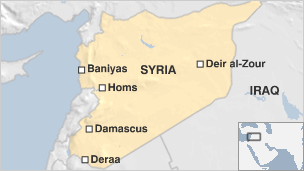 |
The uprising in Syria has stayed away from the capital city Damascas, so far, because of the strong army presence. But now it's getting closer, as clashes occurred in a western suburb. Clashes continued in cities all across Syria. The regime continues to step up counter-measures by cutting off electricity and telephone lines, and by going from house to house and arresting hundreds of people. BBC
For years, Turkish Prime Minister Recep Tayyip Erdogan won popularity in the Arab streets by confronting Israel. But now Erdogan is losing credibility by delaying any reaction to the Arab uprisings, first in Libya and now in Syria. Only last week did Erdogan reverse position and demand that Libya's Muammar Gaddafi step down, and he's still equivocating on the issue of Syria violence. His only comment on Syria's president Bashar al-Assad was an indirect one: "I find it necessary to repeat my warning to countries in the region: Equality, justice and democracy are not the right of some countries but of every nation." Global Post
As Turkey risks losing credibility, Iran is viewing the increasing violence in Syria with more and more alarm. Syria's president Bashar al-Assad has been Iran's closest Arab friend, and has provided a gateway into the Arab world and a partner to Iran in the support of Lebanon’s Hizbollah and of Palestinian groups. Even if al-Assad survives, he's going to have to be less accommodating to Iran to satisfy the Sunni protesters. Financial Times (Access)
Nato ignored calls for help from a boat in the Mediterranean off the coast of Libya carrying 72 migrants trying to reach to Lampedusa island in Italy. As the migrants lost fuel and ran adrift, they contacted Nato via satellite phone, and were visited by a helicopter that lowered water and food to them. However, the helicopter left, and there was no further help, leaving them to die. Ignoring a cry for help is a violation of international law, and Nato may be charged with war crimes. The boat carried 47 Ethiopians, seven Nigerians, seven Eritreans, six Ghanaians and five Sudanese migrants. Twenty were women and two were small children, one of whom was just one year old. Guardian
The Supreme Council of the Armed Forces, which is Egypt's current interim government following the uprising that forced Hosni Mubarak to step down, is responding harshly to the sectarian violence between Muslims and Coptic Christians that occurred in Cairo over the weekend, killing 9 people. The violence was triggered by rumors that Christians had abducted a woman who had converted to Islam and married a Muslim man, which Christians say never happened. Fearing that sectarian violence might spread, the Supreme Council of the Armed Forces arrested 190 people in connection with the violence, and will try them in military courts, "as a deterrent to all those who think of toying with the potential of this nation." CS Monitor
An apparent attempt by Pakistan's media to unmask the identity of the CIA station chief in Islamabad failed over the weekend, because the media reports did not provide the correct name. American officials suspect the attempt was the work of someone in the Pakistani government, possibly Pakistan's principal spy agency, the Inter-Services Intelligence directorate (ISI). Reuters
(Comments: For reader comments, questions and discussion,
see the 10-May-11 News -- US housing price fall accelerates, while Greece's euro debt crisis widens
thread of the Generational Dynamics forum. Comments may be
posted anonymously.)
(10-May-2011)
Permanent Link
Receive daily World View columns by e-mail
Donate to Generational Dynamics via PayPal
Unrest over food prices is growing
The food price index of the U.N. Food and Agriculture Association (FAO) held steady during April, after increasing in eight of the previous nine months. There was little change in the index because although international grain prices increased sharply in April, the rise was more than offset by declines in dairy, sugar, and rice, while oils and meat prices were mostly unchanged, according to the FAO.
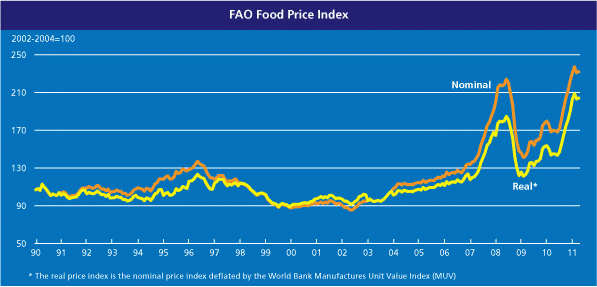 |
The outlook for cereal grain prices in 2011 is good, according to an analyst quoted by AFP, but "Among all the cereals, maize is the most worrisome. This year we would need above-average, if not record, yields in the United States for the maize situation to improve, but maize plantings so far have been delayed considerably due to cool and wet conditions on the ground."
The price index remains well the 2008 levels that caused riots across the developing world. The level of unrest hasn't been as high this time, because governments have reduced the severity of the problem by providing food subsidies, and by closer cooperation with neighboring countries. Still, the uprisings that have spread across the Arab world were originally triggered by high food prices.
Black Africa (also called sub-Saharan Africa) has been particularly hard hit by the rise in food prices, according to the Swaziland Observer. High poverty rates will cause additional uprisings, according to the article, and in Uganda there have already been organized protests that have turned violent.
Food prices have been increasing almost steadily since 2002, in good times and bad, in good weather or bad. From the point of view of Generational Dynamics, we're continuing to see what I call the "Malthus Effect," a continuing increase in the price of food as the population grows faster than the supply of food, especially during a generational Crisis era.
(Comments: For reader comments, questions and discussion,
see the 9-May-11 News -- World food price index holds steady at historic highs
thread of the Generational Dynamics forum. Comments may be
posted anonymously.)
(9-May-2011)
Permanent Link
Receive daily World View columns by e-mail
Donate to Generational Dynamics via PayPal
Hamas security forces break up pro-bin Laden rally in Gaza
This morning's key headlines from GenerationalDynamics.com.
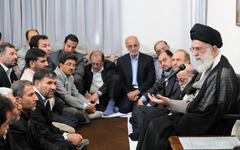 |
Iran's president Mahmoud Ahamadinejad has acquiesced in his bitter dispute with Supreme Leader Ayatollah Ali Khamenei ( "7-May-11 News -- Resignation of Iran's president Mahmoud Ahmadinejad may be imminent"), and will keep his job for the time being. However, Ahmadinejad has angered a lot of conservatives for his disobeying Khamenei, so the bitter fighting is going to continue. Reuters
Last week, Iran claimed to be the target of a new "cyber attack," following the Stuxnet attack last year that attacked and damaged Iran's nuclear capabilities. However, experts are skeptical of the new claims, and suspect that Iran is making the claim for domestic political purposes. As I've described many times (see details in my 2007 report, "Iran's President Ahmadinejad facing a growing 'generation gap'"), many of Iran's policies represent a desperate attempt to restore national unity by mimicking the claims of Iran's last crisis war, the Great Islamic Revolution followed by the Iran/Iraq war of the 1980s. Iran is particularly concerned about domestic unrest, in view of recent violence and the general unrest in the region. Reuters
Hamas on Saturday broke up a Salafist protest in Gaza against the killing of al-Qaida leader Osama bin Laden. Hamas forces have clashed with Salafists numerous times in recent weeks, as talk of a reconciliation with the Fatah gathered momentum. The Salafists have advocated much more violent action against Israel. Jerusalem Post
I've noticed that the word "Salafist" is appearing much more often in news stories in the last 2-3 weeks, as another way of distinguishing terrorists from ordinary Muslims. In this context, "Salafists" refers to hardline groups with links to al-Qaeda. This word is in contrast to "Islamist," which is a more general term for hardline Muslim terrorist groups. Now journalists seems to be using the world "Salafist" to distinguish between different kinds of Islamists. Hamas is not linked to al-Qaeda, and while it (sometimes) promotes violence against Israel, it does not sponsor international terror as al-Qaeda and Hizbollah have done.
Firefighters are battling 34 wildfires in Siberia on an area of over 1,300 hectares (3200 acres), with the fires spreading rapidly over larger areas. In the summer of 2010, an enormous heat wave in Central Russia caused massive wildfires across the country, which killed 62 people and left thousands homeless. This was one of the principal causes of Russia's wheat shortage last year, and caused Russia to ban wheat exports. Ria Novosti
Russia plans to deploy new coastal missiles and warships in the Caspian , over the next few years. (See "25-Jun-10 News -- A naval arms race is growing on the Caspian Sea.") The Caspian Sea is surrounded by Azerbaijan, Iran, Russia, Turkmenistan and Kazakhstan and tensions have been growing for some years. Xinhua
It's been three years since violence in Zimbabwe caused millions of refugees to flee to South Africa, where they were subjected to violent, gruesome attacks. (See "South Africa will create 'temporary shelters' for migrants, not 'refugee camps.'") Now flareups of anti-immigrant xenophobia are flaring up again, though perpetrators claim that it's not xenophobia because it's really just business related. Times (S. Africa)
(Comments: For reader comments, questions and discussion,
see the 9-May-11 News -- World food price index holds steady at historic highs
thread of the Generational Dynamics forum. Comments may be
posted anonymously.)
(9-May-2011)
Permanent Link
Receive daily World View columns by e-mail
Donate to Generational Dynamics via PayPal
Russia objects to the 'Libya Contact Group'
Libya's rebels in Misurata suffered a major setback early Saturday, when Gaddafi's forces breached Nato's no-fly zone and bombed fuel storage tanks, causing them to explode and burn, according to VOA.
 |
It's not known how the no-fly zone was evaded, but some reports indicate that it was done with helicopters bearing the Red Cross emblems.
Government forces have also been scattering land mines in and around Misrata harbor, preventing aid and evacuation ships from docking. The Chinese anti-vehicle mines are dropped by mini-parachutes from rockets that open during flight, according to the BBC.
Misrata is the third largest city in Libya, with a population over half a million. It's been under siege by Gaddifi's forces for weeks, and Gaddafi's forces have now destroyed much of Misrata's remaining supply of fuel. Some reports indicate that Misrata will be running out of food within a few weeks, along with other parts of eastern Libya, according to Reuters
The United Nations Security Council originally approved the no-fly zone to save the city of Benghazi from the kind of humanitarian disaster that Misrata is now facing.
Since the beginning of the military intervention, a way has been sought to aid the opposition so that they could pursue the fight with as little outside help as possible. One approach being considered has been to unfreeze some of Gaddafi's frozen assets and give the money to the rebels. Libya has over $34 billion in frozen assets in the U.S., more than $19.7 billion in the U.K., and about $412.3 million in Switzerland, according to the Wall Street Journal (Access).
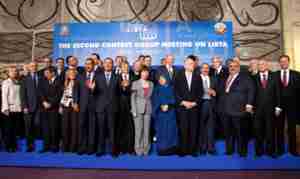 |
In order to determine how to resolve legal issues and provide this aid, several European and Arab countries formed an international group called the "Libya Contact Group." The U.S., Britain, France, Italy, Qatar, Kuwait and Jordan are among the member countries.
The Libya Contact Group met on Thursday and agreed to set up a new fund to aid Libya's rebels. It will initially be funded through donations and loans from the U.S. and Europe, according to Al-Ahram, and frozen funds will be used later.
However, only about $250 million were readily available, far less than the $3 billion that that the rebels are requesting.
The Contact Group is also coordinating military contributions to the rebels, and this is raising the suspicions of the Russians.
As we've reported several times in the past, the Russians are pursuing a policy objective of keeping the stalemate in Libya going on for as long as possible, so that Nato forces will be tied down there, giving Russia's armed forces a free hand in the Caucasus and Central Asia.
To this end, the Russians are insisting that any expansion of the Nato military intervention must be approved by the U.N. Security Council, where Russia has a veto, thus giving Russia effective control over Nato.
Russia's Foreign Minister Sergei Lavrov is complaining that the Libya Contact Group is seeking a way to set the course of the Libya intervention without having to go through the Security Council, and therefore not subject to a Russian veto. Lavrov said the conflict in Libya was a civil war and the international community should focus on stopping the fighting and not "taking sides," according to Reuters
(Comments: For reader comments, questions and discussion,
see the 8-May-11 News -- Libya forces breach no-fly zone and destroy Misrata's fuel depots
thread of the Generational Dynamics forum. Comments may be
posted anonymously.)
(8-May-2011)
Permanent Link
Receive daily World View columns by e-mail
Donate to Generational Dynamics via PayPal
Muslim-Christian clashes in Cairo kill 10
This morning's key headlines from GenerationalDynamics.com.
On Friday, Greek and EU financial officials were denying that any unscheduled meeting would occur in Luxembourg, that the meeting had nothing to do with Greece, that Greece would be defaulting on its debt, or that Greece would be exiting euroland. ( "7-May-11 World View -- Greece denies the rumors that it's leaving euroland")
On Saturday it turns out that all of those claims were lies. The only thing that they're still denying is that Greece will be leaving euroland. But they lied about everything else, so why should we believe that? And politicians wonder why they're held in such contempt, and why they're never believed. The old joke that you can tell if a politician is lying by whether his mouth is moving is supposed to be just a joke, but it's far more true than false.
According to statements made on Saturday, EU officials discussed a further bailout of Greece, either by extending the bond redemption dates, by imposing a "haircut" of around 50%, or by lending the country more bailout money. There would almost certainly be debt default in one form or another. Kathimerini
However, one German MP says that Berlin should do everything possible to help Greece leave the euro currency, and reinstate its old drachma currency. Many MPs in Chancellor Angela Merkel's opposition believe that Greece's debt trajectory is unsustainable and action needs to be taken sooner rather than later before the long-term cost becomes far greater. Reuters
Following the reconciliation agreement between Fatah and Hamas, Palestinian president Mahmoud Abbas wants to project to the world that the future unity government will be committed to the same plan as the current government, which is legitimized by Western countries. Although Hamas continues to believe in its right to "armed struggle" against Israel, Hamas officials accept nonviolent resistance, at least for now. Jerusalem Post
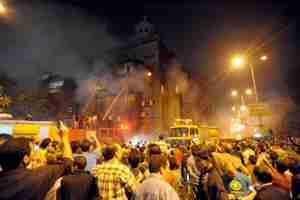 |
Egypt's cabinet is in crisis talks after clashes between Muslims and Christians killed 10 people (6 Muslims and 3 Christians, according to state television) and injured 186 and set a church ablaze in a working class neighborhood of Cairo. AFP
Russian officials reacted favorably to the killing of Osama bin Laden, but the flow of contradictory statements from the White House about the details of the killing soon changed the mood in Moscow from praise to mockery to concern. The greatest concern is that western forces will withdraw sooner from Afghanistan, leaving it to Russia's faltering army to defend the secular Central Asian dictatorships from Islamists. However, Russia sees the bin Laden killing as a vindication of its own anti-terrorist activities in the North Caucasus provinces. Jamestown
Iraq's mostly Shia government has sided with the Shia protesters in Bahrain, and against the Sunni rulers. This has angered the Gulf Arab countries, who are committed to using as much force as necessary to crush the protests in Bahrain. The result is that an Arab League summit that had been scheduled to be held in Iraq this year has been postponed until March 2012. Iraq had been hoping that the high prestige summit would restore Iraq's prestige among its neighbors after years of war and economic isolation, and had spent $450 million in preparation, planting palm trees along highways, re-paving roads and restoring Saddam Hussein's palace so that it could be used as a hotel for the Arab League delegates. Iraqi citizens are complaining that the money should have been spent on things like water, electricity, and more food. Reuters
A study released on Thursday found that California's state government spends three times as much on pensions and other benefits for retired persons as the state's large private corporations. Reuters
(Comments: For reader comments, questions and discussion,
see the 8-May-11 News -- Libya forces breach no-fly zone and destroy Misrata's fuel depots
thread of the Generational Dynamics forum. Comments may be
posted anonymously.)
(8-May-2011)
Permanent Link
Receive daily World View columns by e-mail
Donate to Generational Dynamics via PayPal
A major theological dispute is splitting the government
A bitter power struggle pitting Iran's president Mahmoud Ahmadinejad against the supreme leader Ayatollah Ali Khamenei may lead to the president's resignation as early as Sunday.
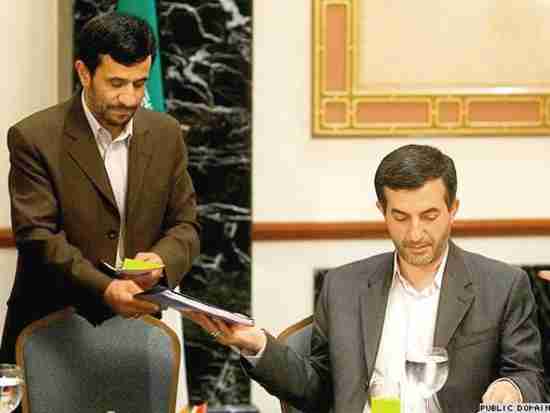 |
It's been fairly clear for a long time that there was a growing coldness between Ahmadinejad and Khamenei. When Ahmadinejad was first elected in 2005, he and Khamenei kissed and embraced in a victory celebration. But there was no such affection when Ahmadinejad was reelected in 2009.
Rumors of a split have been growing, but they burst out into the open early in April, when Ahmadinejad dismissed Heydar Moslehi, the head of the Intelligence Ministry, and faithful to Khamenei. Khamenei refused to accept Moslehi's forced resignation, and Moslehi was kept in his job, according to Haaretz.
Ahmadinejad responded with his own power play -- he failed to show up at cabinet meetings and missed several scheduled public engagements, including a trip to Qom, home to Iran's religious establishment, where he is increasingly mistrusted, according to RFERL.
Then it was Khamenei's turn again. Khamenei's security forces arrested several presidential aides, including two close to Ahmadinejad's chief of staff, Esfandiar Rahim-Mashaei, whom Khamenei despises.
The arrests were based on charges that seem completely bizarre. The aides were accused of sorcery, of using "supernatural powers," and of being "magicians" and invoking djinns (spirits), according to the Guardian. One of the men, Abbas Ghaffari, was charged as "a man with special skills in metaphysics and connections with the unknown worlds."
These charges of sorcery are related to Ahmadinejad's claimed devout belief in the Mahdaviat -- the Shia Muslim belief that the Mahdi (or "the 12'th Imam" or "the Hidden Imam") is coming to save mankind. This belief is roughly equivalent to the Christian belief in the second coming of Christ, or the Buddhist belief in the Maitreya -- that a new Buddha is to appear on earth, and will achieve complete enlightenment. This belief, which is shared by Rahim-Mashaei, has been the center of an increasingly widening theological dispute within the government. (See my 2009 report, "Theological split in Iran widens as opposition protests continue" for details.)
Ahmadinejad has disobeyed Supreme Leader Khamenei, which is considered to be equivalent to disobeying God. But Ahmadinejad has been paving the way for the return of the Hidden Imam, and as I understand it, he's using his claim that the Hidden Imam's return is imminent as a justification for disobeying Khamenei.
Thus, the sorcery charges are related in some way to the beliefs about the Hidden Imam, and are complicated by the fact that, as I understand it, Khamenei himself has claimed in the past to be the Hidden Imam.
The best way to understand all this craziness is to understand that Iran is in a generational Awakening era, 23 years after the end of climax of Iran's last generational crisis war, the Great Islamic Revolution followed by the Iran/Iraq war.
Any Awakening era is characterized by a "generation gap," where the young people, born after the last crisis war, demonstrate against the austere rules laid down by the war survivors, who are committing their lives to do everything possible to preventing any similar war from occurring again.
Thus, the huge demonstrations that followed Ahmadinejad's 2009 reelection, widely assumed to be fraudulent, are very similar to the huge demonstrations that occurred in America's last Awakening era. (See my 2007 report, "Boomers commemorate the 40th anniversary of the Summer of Love.")
Every Awakening has a climax which establishes a "winner" between the older and younger generations. The climax of America's Awakening era would be President Nixon's resignation in 1974.
However, the resignation of Ahmadinejad, if it occurs, would not be equivalent, and would not be a climax, since Khamenei would still be in power. There's no reason why there would have to be a one to one correspondence between all events in Awakening eras, but if one were to match this up to some event, the best choice would be President Lyndon Johnson's 1968 decision not to run again.
At any rate, the generational conflict in Iran is far from over, and is still years away from reaching a climax. A climax where the older generation wins would be Khamenei's completely crushing any further opposition, as in the Tiananmen Square massacre. I personally do not expect this outcome, because most young people in Iran, even young people in the Revolutionary Guards, are generally pro-Western and generally have nothing against Israel. My expectation is that, at some point, Khamenei and his followers will be removed, probably via a "velvet revolution," and that, when forced to choose, Iran will be on the side of the West in the coming Clash of Civilizations world war.
(Comments: For reader comments, questions and discussion,
see the 7-May-11 News -- Resignation of Iran's president Mahmoud Ahmadinejad may be imminent
thread of the Generational Dynamics forum. Comments may be
posted anonymously.)
(7-May-2011)
Permanent Link
Receive daily World View columns by e-mail
Donate to Generational Dynamics via PayPal
Protesters defy Syrian army by moving to another town
This morning's key headlines from GenerationalDynamics.com.
Friday was another one of those days where all you can do is just shake your head in disbelief. It all started with a Der Spiegel story that a secret meeting of finance ministers was to be held in Luxembourg on Friday evening to discuss Greece's massive problems, with the possibility that Greece would abandon the euro currency and reintroduce its old currency, the drachma.
This set off a frenzy, as Greek officials denied the report, according to capital.gr:
"The report regarding the forthcoming exit by Greece from the euro zone, beyond the fact that it is untrue, is written with inconceivable frivolity given that fact that it has been repeatedly denied by the Greek government as well as the other governments of the European Union. Such reports are a provocation and undermine the efforts of Greece and of the euro, and serve speculators. ...The report is not true, it's factually wrong. We have no intention to leave the euro zone. [The report is] ridiculous. ... I haven't heard anything about such a meeting taking place."
Well, Dear Reader, hold on to your hat, because you're not going to believe this: There WAS a meeting in Luxembourg, attended by finance ministers from Germany, France, Netherlands, Finland, and ... wait for it! ... Greece, according to the Telegraph. The agenda for the meeting was restructuring Greece's debt -- a form of default that would write doen billions of euros, potentially imperilling Europe's banks, particularly those in Germany.
However, officials denied that Greece leaving euroland was being considered.
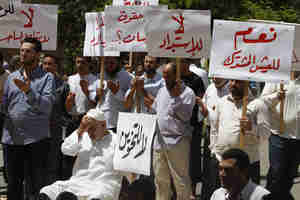 |
Syria's government used blockades and tanks in the hope of preventing the regular Friday anti-government demonstrations after midday prayers, but tens of thousands of them protested in cities across Syria on Friday, as a "Day of Defiance." The city of Daraa, which has been the epicenter of the protests, was surrounded by tanks, but that didn't stop the protesters, who flocked to the nearby town of Tafas, and gathered in a square near the old mosque, carrying placards with the word "leave." Reuters
Violence against anti-government protesters is increasing in Tunisia, whose "Jasmine Revolution" started the uprisings across the Arab world. Tunisian police with teargas and batons scattered protesters demanding the government's resignation on Friday in the most violent confrontation for weeks. The demonstrators say that they fear that July elections will bring Islamists into power. Reuters
China's neighbors in Asia have been become increasingly alarmed about the increasingly confrontational actions in claiming sovereignty over islands in the South China Sea that have historically been claimed as sovereign terroritory of other countries. Thus, the People's Liberation Army (PLA) has launched a military diplomacy program to convince neighbors that the PLA are really very nice guys after all. Whether this "smile diplomacy" is really propaganda warfare remains to be seend Jamestown
However, China's "military diplomacy" is not working with the Philippines, where there has been a military confrontation with the Chinese over Reed Bank, an island in the South China Sea claimed by the Philippines. On March 2, two Chinese patrol boats aggressively approached a Filipino survey ship near Reed Bank, forcing it to flee. The incident is causing the Philippines to increase its military strength in the South China Sea, with the help of the U.S. Vietnam and Malaysia have also upgraded their military strength in response to China's threat. Jamestown
The reconciliation agreement between Hamas and Fatah has caused the Israelis to withhold tax collections from the Palestinian Authority, for fear that any money given to the PA would be channeled to Hamas's terrorist activities. The Israelis collect the customs duties and other levies on behalf of the PA, and currently owes the PA $105 million. However, the European Union, pointing out that the PA needs the money to pay salaries of essential workers and provide benefits, said on Friday that it would provide an extra $124 million to the PA. This is in addition to the $145 million already approved for 2011. Reuters
 |
Chief Lt-Gen Shuja Pasha, the head of Pakistan's Inter-Services Intelligence (ISI) agency, headed for Washington on Friday to smooth relations with the U.S. The apparent incompetence of the ISI following the killing of Osama bin Laden has thrown the agency into crisis, and there are rumors that Pasha will be used as a scapegoat and be forced to step down from his position. Dawn (Pakistan)
The "rich nations" have missed a U.N. deadline for providing information on how much money they're going to give to a proposed $30 billion fund to help developing nations adapt to climate change. Everyone was supposed to provide a statement by May 1, but among the industrialized nations, only Russia and Ukraine provided statements, and both of those statements said that they weren't going to contribute anything. Reuters
(Comments: For reader comments, questions and discussion,
see the 7-May-11 News -- Resignation of Iran's president Mahmoud Ahmadinejad may be imminent
thread of the Generational Dynamics forum. Comments may be
posted anonymously.)
(7-May-2011)
Permanent Link
Receive daily World View columns by e-mail
Donate to Generational Dynamics via PayPal
Contagion may spread from silver to commodities to stocks
It all started on Sunday evening, when a dramatic international price collapse began when silver fell 12% in Asian markets, according to Barrons (Access). After reaching $48.35 last week on Friday, by Thursday it had fallen almost 30% to $34.95.
 |
The price collapse accelerated on Thursday and, as of this writing (on Thursday evening), the price of silver is still falling in after hours trading, according to the Wall Street Journal (Access).
The collapse of silver has had a "contagion" effect on other commodities prices, according to CNBC. On Thursday, oil fell 9%, gold fell 2%, rice fell 5%, and soybeans and wheat feel 2-3%.
 |
A survey of economists by Reuters indicates that many of them expect the plunge in commodity prices to continue. According to Shawn Hackett of Hackett Financial Advisors:
"I've been pretty bearish over the last several months due to the unrealistic chasing of commodities that has taken place.My expectation is that ultimately from the highs that we've recently set to the lows that we will likely set, I am looking for a minimum of 20 percent down.
The inflation trade got super crowded. There were record-long speculative positions in all commodities, the TV was telling you how hyper-inflation was around the corner ... they were all signs that markets were not going up based on fundamentals, but they were going up because money was chasing money.
All of a sudden, all of the top-money leaves the market, and then the market has to find what the fundamental value is based upon supply and demand.
Real demand is not supporting these prices and the speculators are getting out.
My view is that a correction is going to take at least 6 months."
The most relevant question for most people is whether the "contagion" is going to spread to stock prices.
The stock price bubble actually achieved something of a milestone in the past week: The Dow Jones Industrial Average actually rose above 200% of its long-term trend value for the first time since the Lehman collapse in September, 2008. So, for the first time since then, stocks are overpriced by a factor of more than 2. (See my Dow Jones historical page.) Stocks have been overpriced by this measure continuously since 1995.
Another way of looking at it is that the S&P 500 Price/Earnings ratio index is at 17.16, according to the Wall Street Journal. P/E ratios (also called valuations) have been above the historical average of 14 continuously since 1995, sometimes WAY above average. (See "4-Nov-10 News -- Fed announces $600 billion quantitative easing.")
So by applying the Law of Mean Reversion to either of these measures, we see that the market is overdue for a crash at least as far as the Dow 3000 level, and will stay there for many years.
Obviously, there's no way to predict whether the current crash in silver prices, and the resultant selloff in other commodities, is going to be the trigger that leads to this panic and crash.
The selloff in silver isn't the only ominous sign. The euro crisis worsens literally almost every day. It's almost impossible to believe the bond yields (interest rates) for Greece, Ireland and Portugal -- with Greece's 2-year bond yield well above an incredible 20%. And let's not forget that there could be a major Mideast crisis almost any day.
So all I'm going to do is warn my readers, as I've done on three or four occasions in the past, that we're now at a particularly susceptible time, when a lot of factors appear to be converging in a dangerous way. You should take additional steps to protect yourself and your family for at least the next couple of months, until it becomes clear whether things are going to settle down again.
(Comments: For reader comments, questions and discussion,
see the 6-May-11 News -- Crash of silver prices may signal further market plunge
thread of the Generational Dynamics forum. Comments may be
posted anonymously.)
(6-May-2011)
Permanent Link
Receive daily World View columns by e-mail
Donate to Generational Dynamics via PayPal
Republican terrorists in Northern Ireland raising money in U.S.
This morning's key headlines from GenerationalDynamics.com.
 |
The Syrian military has arrested hundreds of protesters, and killed about 500. As it prepares for this week's massive demonstrations following Friday's midday prayers, the army is moving some 30 tanks and 40 armored vehicles from Daraa to Banias. CNN
We've heard a lot about masses of refugees from Tunisia and Libya reaching Italy, but now a new refugee problem is growing, as the government violence in Syria is causing a wave of refugees arriving in Turkey. Turkey has already set up a refugee camp for 300 Syrians. Southeast European Times
Terrorist splinter groups from the old Irish Republican Army (IRA) are threatening new attacks in both mainland U.K. and Northern Ireland, and are raising money in the United States to support their activities. In the 1960s-90s, in a period known as "the Troubles," there was sectarian violence between a Protestant majority that wished to remain a part of the U.K. and Catholic Republicans who wanted who sought union with the Republic of Ireland. The violence and terrorist attacks mostly ended with peace agreements in 1998 and 2005, but splinter groups are now threatening renewed violence. Wall Street Journal (Access)
When Portuguese Prime Minister José Sócrates announced the EU/IMF bailout on Wednesday, without revealing details, he sold it as being almost painless, requiring few new austerity measures beyond those that had already been implemented. However, EuroIntelligence says that a Financial Times analysis proves that Socrates lied. (Quelle surprise!) The actual memorandum indicates harsh tax increases, special taxes on pensions and welfare benefits, freezes on public sector pay, and labor reforms that make it easier to dismiss workers. Financial Times (Access).
Turkish Prime Minister Recep Tayyip Erdogan called for Libya's Muammar Gaddafi to step down right away. This is a shift in Turkey's position, which previously had called for negotiation, and originally opposed any Nato military intervention at all. According to Erdogan:
"A new period started in the history of Libya. Words ran out on the Libya matter. At this point, what needs to be done is for Muammar Gaddafi, who is holding the government in Tripoli in Libya, to leave power immediately and to fulfil his historical and humanitarian responsibility.Gaddafi has ignored calls for change in Libya and instead preferred blood, tears and pressure against his own people. Under current conditions, the best way is to return power to its genuine owners, the Libyan people. Libya is not the property of a single man or one family.
America's successful military intervention in Pakistan that led to the death of Osama bin Laden has raised "tormented" questions among Indians, who wonder why they can't do the same. After the horrendous November, 2008, terrorist attack on Mumbai, India wanted to send its military into Pakistan to go after the Lashkar-e-Toiba terrorist group, but was stopped from doing so. Indian Army Chief Gen VK Singh said that Indian armed forces were "competent" to carry out a similar operation. "I would like to say only this that if such a chance comes, then all the three arms (of the military) are competent to do this," he said, but added, "Whether the US sought permission or not (from Pakistan), it has to be asked from them." Express Tribune (Delhi)
Pakistan's Foreign Secretary Salman Bashir responded to Singh in a press conference: "Of course, the United States is a friend and important partner in the fight against terror. But it’s worth stating here that any country, that any other country, that ever acts on the assumption that it has might and can mimic unilateralism of any sort, it will find that it has made a basic miscalculation. We feel that that sort of adventure and miscalculation would result in a terrible catastrophe." Bloomberg
This is really mind-blowing, but apparently is being seriously considered. Last year, France deported thousands of Roma Gypsies to their homes in eastern Europe, a move that was popular in France, but condemned by politicians in other countries. (See "5-Sep-10 News -- Thousands protest Gypsy expulsions from France.") But now, with Russia's population facing some serious declines, the Russians and the Europeans are discussing the possibility of resettling all the Roma in Russia and the Ukraine, which have a tradition of tolerance for the Roma, as reflected in Russian novels and music. "In this way, by counting on our accommodating spirit and hospitality, ‘tolerant’ Europe wants on our account to resolve the problem of its own intolerance. And it is worth noting that in the circles in and around the powers that be in Russia, there is actively being prepared the basis for such decisions." Paul Goble
The U.S. has about 90,000 troops in Afghanistan, while European countries, including France and Germany, have another 13,000 or so. The plan is to begin withdrawing troops this year, with complete withdrawal planned for 2014. But after the death of Osama bin Laden, France is reconsidering its options, and may withdraw its troops sooner. CS Monitor
(Comments: For reader comments, questions and discussion,
see the 6-May-11 News -- Crash of silver prices may signal further market plunge
thread of the Generational Dynamics forum. Comments may be
posted anonymously.)
(6-May-2011)
Permanent Link
Receive daily World View columns by e-mail
Donate to Generational Dynamics via PayPal
Israeli prime minister expresses grave concern
Palestinians in Gaza, the West Bank and refugee camps celebrated on Wednesday. In Gaza's Square of the Unknown Soldier, a demonstration turned into a raucous party of thousands cheering, chanting and waving flags, according to the Guardian.
 |
The occasion was a ceremony in Cairo, attended by representatives from the U.N., the EU, and the Arab League, for the signing of a reconciliation agreement between Fatah and Hamas. The two factions have been bitter rivals since a 2007 war, when Hamas defeated Fatah for control of Gaza. Mahmoud Abbas, the president of the Palestinian Authority (PA), the governing body associated with Fatah, and Khaled Meshaal, leader of the Hamas, identified by the U.S. as a terrorist group, met for the first time in five years to sign the agreement.
The reconciliation agreement is an important step on the way to getting the United Nations General Assembly to unilaterally create a Palestinian state in September by international mandate. A reconciliation is an important prerequisite.
Abbas said that they had forever turned "the black page of divisions." Meshall spelled out Hamas's goal:
"Our aim is to establish a free and completely sovereign Palestinian state on the West Bank and Gaza Strip, whose capital is Jerusalem, without any settlers and without giving up a single inch of land and without giving up on the right of return [of Palestinian refugees]."
In fact, several years ago, the Middle East Quartet (United Nations, Russian Federation, United States, European Union) set three conditions for Hamas: recognize the state of Israel; renounce violence; and honor past Israeli-Palestinian agreements. Hamas has said that it will not agree to any of these conditions.
Furthermore, Hamas officials have been openly criticial of the U.S. military action that led to Osama bin Laden's death, according to the Jerusalem Post. On Monday, Hamas Gaza prime minister Ismail Haniyeh, said:
"We condemn the assassination and the killing of an Arab holy warrior. ... We regard this, as a continuation of the American policy based on oppression and the shedding of Muslim and Arab blood."
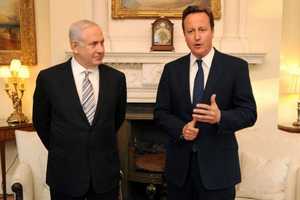 |
Thus, Israeli prime minister Benjamin Netanyahu was extremely critical of the agreement:
"What happened today in Cairo is a tremendous blow to peace and a great victory for terrorism. I think the fate of the Middle East and the fate of peace hangs in the balance."
Netanyahu made this statement while visiting British prime minister David Cameron. Cameron's office had issued a statement critical of Netanyahu that said:
"This is a time to pursue not ignore the Middle East peace process. That will be his main message to Mr Netanyahu today. We need to study the detail of the agreement but, as the prime minister was making clear in the House of Commons yesterday, we hope that Palestinian unity between Fatah and Hamas will be a step forward."
However, after the meeting, Cameron was more conciliatory:
"The leaders discussed today's announcement on Palestinian unity. Prime Minister Cameron said that any new Palestinian government must reject violence, recognise Israel's right to exist and engage in the peace process, and that Britain would judge it by its actions."
It's always interesting to watch politicians dance like this, waiting until they have a chance to conduct a public opinion poll, so they'll know what to believe.
On the one hand, it almost seems that a Palestinian state in September has become an unstoppable train. On the other hand, there are many serious issues standing in the way.
(Comments: For reader comments, questions and discussion,
see the 5-May-11 News -- Palestinians celebrate Fatah-Hamas reconciliation ceremony in Cairo
thread of the Generational Dynamics forum. Comments may be
posted anonymously.)
(5-May-2011)
Permanent Link
Receive daily World View columns by e-mail
Donate to Generational Dynamics via PayPal
Portugal is promised a 78 billion euro bailout
This morning's key headlines from GenerationalDynamics.com.
The protests following Friday's midday prayers in Syria have been growing larger every week, even as Syria's government launches bloodier and more brutal attacks on protesters. Security forces are setting up roadblocks in Damascus and other cities to prevent the spread of protests on Friday. LA Times
According to Syrian government-controlled Sana news service, Syria's security forces "have continued today their hunting for armed terrorist groups, an official army source declared Monday evening." The result is that the security forces "have caused satisfaction to the citizens, who started to feel the restoration of security, and serenity to Daraa." Day Press (Syria)
It used to be an "insult" to Portugal to suggest that it might need a bailout, but on Wednesday, Portugal became the third EU country, after Greece and Ireland, to be promised a bailout. The amount is a €78 billion ($116 billion), but the interest rate is being kept secret for now. Interim prime minister José Sócrates said that the bailout was a "good deal," and that Portugal had received "better terms" than Ireland or Greece. Sócrates said that the terms imposed by the IMF wouldn't be painful at all, but a BBC reporter said that Portugal would face huge austerity measures later this year. The bailout still needs approval from the EU and from Portugal's opposition parties. Irish Independent
The chief prosecutor of the International Criminal Court announced Wednesday that the ICC will seek the arrest of three individuals for crimes against humanity in Libya. The crimes involve systematic arrests, torture, killings and forced disappearances. VOA
 |
Thousands of ethnic Hmong people in Vietnam are holding a protest calling for autonomy, in the remote Dien Bien province. The demands of the protesting Hmong - who are mostly Christians - include more religious freedom, better land rights and more autonomy. The BBC report calls it a "rare protest," but Vietnam is still in a generational Awakening era, when protests are expected to increase. BBC
With Russia's population continuing to fall, Russian analysts are increasingly considering "Russia’s disintegration into regional principalities, khalifates, republics and confederations." The most disturbing proposals are "the separation of Siberia from European Russia and a split along the Volga-Urals line." The North Caucausus will likely leave as soon as "the river of [aid] money from Moscow runs out." The most likely scenario will be the "Kosovo scenario," with "local referend[a], unilateral declaration[s] of independence, [and] recognition of sovereignty by the key powers, the US, China and the European Union." Paul Goble
Fifteen former inmates and prison guards in North Korean prisons have testified to Amnesty International of horrific torture. Prisons occupy an ever-growing number of vast wilderness sites, and house 200,000 or more prisoners. CNN
(Comments: For reader comments, questions and discussion,
see the 5-May-11 News -- Palestinians celebrate Fatah-Hamas reconciliation ceremony in Cairo
thread of the Generational Dynamics forum. Comments may be
posted anonymously.)
(5-May-2011)
Permanent Link
Receive daily World View columns by e-mail
Donate to Generational Dynamics via PayPal
Deutsche Bank's actions make you want to vomit
The federal government sued Deutsche Bank on Tuesday, saying the bank committed fraud and padded its pockets with undeserved income as it repeatedly lied so it could benefit from a government program that insured mortgages, according to AP. This comes just five days after the European Commission opened antitrust investigations on 16 major financial institutions, including Deutsche Bank. EU Observer.
 |
As I've been writing for years, the massive fraud that led to the continuing financial crisis occurred at almost every financial and real estate institution in the world. The contempt for ethics and rules that Deutsche Bank, and its subsidiary MortgageIT, showed is typical of what happened in financial institutions around the world. It's worth extracting a few paragraphs from the complaint (PDF):
"1. ... Deutsche Bank and MortgageIT repeatedly lied to be included in a Government program to select mortgages for insurance by the Government. Once in that program, they recklessly selected mortgages that violated program rules in blatant disregard of whether borrowers could make mortgage payments. While Deutsche Bank and MortgageIT profied from the resale of these Government-insured mortgages, thousands of American homeowners have faced faced default and eviction, and the Government has paid hundreds of millions of dollars in insurance claims, with hundreds of millions of dollars more expected to be paid in the future. ...9. Deutsche Bank and MortgageIT repeatedly lied to HUD to obtain and maintain MortgageIT's Direct Endorsement Lender status. Deutsche Bank and MortgageIT failed to implement the quality control procedures required by HUD, and their violations of HUD rules were egregious. For instance, Deutsche Bank and MortgageIT failed to audit MortgageIT's early payment defaults; Deutsche Bank and MortgageIT failed to dedicate sufficient staff to quality control; MortgageIT repeatedly failed to address dysfunctions in the quality control system, which were reported to upper management; MortgageIT took only the staff member dedicated to auditing FHA-insured mortgages, and reassigned him to increase production instead; and when an ouside auditor provided findings to MortgageIT revealing seroius problems, those findings were literally stuffed in a closet and left unread and unopened. ...
89. Until late 2005, MortgageIT had no personnel to conduct the required quality control reviews for closed FHA-insured loans.
90. In or about 2004, MortgageIT contracted with an outside vendor, Tena Companies, Inc. ("Tena"), to conduct quality control reviews of closed FHA-insured loans.
91. As noted above, those reviews did not include early payment defaults because MortgageIT failed to identify early payment defaults to Tena.
92. Throughout 2004, Tena prepared findings letters detailing underwriting violations it found in FHA-insured mortgages underwritten by MortgageIT.
93. The findings letters included the identification of serious underwriting violations. Among the serious underwriting violations identified in the Tema findings were violations by a MortgageIT underwriter in the MortgageIT Chicago branch. The underwriting violations involved mortgages in the Michigan market, including properties in and around Darborn, Michigan, and certain repeat brokers in that market.
94. No one at MortgageIT read any of the Tena findings letters as they arrived in 2004.
95. Instead, MortgageIT employees stuffed the letters, unopened and unread, in a closet in MortgageIT's Manhattan headquarters.
96. The letters remained unopened until December 2004 or January 2005.
97. In December 2004, MortgageIT hired its first quality control manager. The quality control manager asked to see the Tena findings, but was not provided with any findings. After searching throughout the office, the head of the credit department at MortgageIT showed the quality control manager to a closet. The quality control manager opened the closet and found a series of envelopes, unopened and still sealed, in the closet.
98. The envelopes were disorganized. They contained the unread Tena findings.
99. The quality control manager opened the Tena findings, for the first time, in December 2004 or January 2005. The quality control manager quickly identified serious underwriting violations, which had remained unread over the course of the preceding year.
100. MortgageIT's failure to read the audit reports from its outside vendor prevented MortgageIT from taking appropriate actions to address patterns of ongoing underwriting violations."
If you skipped reading the above paragraphs, you ought to go back just to take in the sordid, sleazy attitudes of these people, and the depraved, debauched acts they committed. I've read many stories like this in the past few years, and they make me want to vomit.
Deutsche Bank was hardly unique. Fraud was not the exception during the credit and real estate bubble years; it was THE RULE. Fraud was rampant all over the place, and still is.
The housing bubble was caused by massive fraud throughout the entire financial and real estate industries, from top to bottom, whether it was homeowners lying on their applications, construction firms colluding with appraisers and brokers to get kickbacks by over-valuing homes, lenders who resold mortgages without checking any of the claims, lenders who adopted predatory lending practices, granting loans to people with no hope of making payments, "financial engineers" creating synthetic securities that could mathematically be proven fraudulent, investment banks that securitized loans based on the assumption that real estate prices would rise forever, ratings firms and monoline insurers that took fat fees to lie about these potentially worthless securities.
The only possible explanation for such ubiquitous debauchery is generational. There's no other way that it could have reached every corner of every financial and real estate organization, except in the contemptuous attitudes of greedy, nihilistic Generation-Xers, perpetrating fraud right under the noses of their greedy, incompetent Boomer bosses, who condoned the crimes because they also gain. This lethal combination of Gen-X nihilism, combined with Boomer incompetence is what got us where we are.
And it's far from over. The same people are still in the same jobs, adapting to new laws, and figuring out new ways to defraud. Stock brokers fraudulently ignore "one time expenses" when quoting valuations. Banks still have on their books many trillions of dollars of toxic assets that haven't been marked to market, meaning that quarterly statements are still defrauding investors. And bankers are charging usurious 30% interest rates and using the money to pay themselves million dollar bonuses, which they believe that they deserve, since they've been so successful at defrauding the public.
The financial crisis has only begun.
(Comments: For reader comments, questions and discussion,
see the 4-May-11 News -- U.S. sues Deutsche Bank for $1 billion, as the EU investigates antitrust violations
thread of the Generational Dynamics forum. Comments may be
posted anonymously.)
(4-May-2011)
Permanent Link
Receive daily World View columns by e-mail
Donate to Generational Dynamics via PayPal
Syria arrests hundreds, charging 'degrading the state'
This morning's key headlines from GenerationalDynamics.com.
During the month of April, Greece's 2-year bond yields -- the interest rates demanded by investors to lend money to Greece for two years -- jumped 10 percentage points, to almost 26%. However, bond yields fell to 24.78% on Tuesday, because Greek and EU officials instituted that Greece will NOT restructure its debt (a form of default), even though it's mathematically impossible for Greece to avoid default. (As I wrote in today's main article, the same financial officials who committed massive fraud during the credit and real estate bubbles are still in the same jobs today, committing different kinds of fraud.) An analysis shows that investors will be forced to take a 55% "haircut" (loss of principal), and that yields would have to increase to 45%. Financial Times (Access).
The Syrian government's destructive binge is continues, as hundreds of ordinary citizens are being arrested and charged with "degrading the state," which carries a three year prison sentence. In some cities, the police are going from door to door and arresting every male under 40, along with some females. There are thousands of political prisoners. The violence is also affecting the economy, as 8% of Syrian pound deposits in banks have been converted to dollars since the unrest began. Reuters
Egypt's ousted president Hosni Mubarak has said that he would die in Egypt, and he may get his wish soon. Egypt's justice minister says that Mubarak could receive a death sentence if he's convicted of "the crime of killing protesters." Mubarak is 82 years old. AFP
 |
Superman may not be celebrating the death of Osama bin Laden. Superman was a comic book hero appearing in Action Comics in 1933 as a fighter against social injustice and tyranny. He was an important American icon during World War II in the fight against the Nazis. In the 1950s, he was my favorite comic book hero. However, Superman will now renounce his American citizenship in a story line where the President's national security advisor is incensed that Superman appeared in Tehran to non-violently support the protesters demonstrating against the Iranian regime. Comics Alliance
On November 19, 2010, an Indian Air Force (IAF) helicopter crashed in India's Arunchal Pradesh, near the border with China, killing 12 people. In Xinhua's government controlled news coverage of the incident, there were differences between the English and Chinese versions. The English version quoted the AFP news coverage, saying that the accident occurred in a Russian-made helicopter in India's "northeast ... border areas." The Chinese version said that the accident occurred "in the so-called 'Arunachal Pradesh,' [which] is located in southern Tibet, China, which has always been Chinese territory. China’s repeated solemn declaration that China never recognized the illegal 'McMahon Line' and the Indian authorities in February 1987 announced the establishment of the so-called 'Arunachal Pradesh.'" Bahukutumbi Raman.
China's strategy plans a "String of Pearls," where each "pearl" is a naval facility running from the South China Sea, across the Indian Ocean, reaching the Mideast and Africa. Here's an interesting map, too big to display here, showing China's String of Pearls. Washington Institute
(Comments: For reader comments, questions and discussion,
see the 4-May-11 News -- U.S. sues Deutsche Bank for $1 billion, as the EU investigates antitrust violations
thread of the Generational Dynamics forum. Comments may be
posted anonymously.)
(4-May-2011)
Permanent Link
Receive daily World View columns by e-mail
Donate to Generational Dynamics via PayPal
Waterboarding led to killing of bin Laden
News anchors in Pakistan didn't know what words to use. There are two ways to say "Osama has been killed" in Urdu and Hindi, with one less respectful than the other, and anchors would zigzag back and forth between the two, according to Dawn (Pakistan).
 |
This is only one of many examples of schizophrenia that Pakistanis are experiencing, now that Osama bin Laden has been found and killed on Pakistani soil, not far from the nation's capital.
Pakistan is a country that almost appears to be disintegrating. Last year's floods flattened and washed away hundreds of villages. Sectarian violence is almost a daily occurrence, with militant Islamist Sunni terror groups attacking mosques and gatherings of Shia, Sufi, and other "apostate" branches of Islam, as well as Pakistan's security forces.
Last week, for example, Taliban militants in Karachi perpetrated three bomb attacks targeting Pakistan Navy personnel, killing ten and injuring dozens, according to Dawn. A Taliban spokesman claimed responsibility in a phone call. "Our men carried out this attack and all security forces are our target. They will be attacked everywhere in the country. Our organisation is still strong in cities of Pakistan."
On top of this, polls show that Pakistanis are overwhelmingly opposed to American missile strikes from drones, since they blame the Taliban terror attacks on these strikes, and many believe (incorrectly) that the terrorism will stop when the drone attacks stop.
But the government is "married" to the U.S. for the duration of the war on terror, and Pakistan must cooperate, including allowing drone strikes, in order to receive badly needed American aid -- about $2 billion a year.
So into this mess of tangled pressures comes the news that Osama bin Laden has been killed where he was living in a mansion down the street from a military academy, just a few miles from the capital city Islamabad.
The Pakistanis had been insisting for years that Osama bin Laden was not in the heart of Pakistan, that he was either in the mountainous tribal areas bordering Afghanistan, or in Afghanistan itself. So his location was just the first embarrassment.
Did Pakistani government officials know that he was there? Certainly a lot of people think so, and some analysts are claiming that bin Laden was actually being kept there under a kind of house arrest by Pakistan's Inter-Services Intelligence (ISI) agency. The Pakistanis deny this, and Pakistan's ambassador to the United States points out that Boston gangland figure James J. "Whitey" Bulger has been on FBI's most wanted list since 1999, but the FBI hasn't been able to find him. The Atlantic quotes him as saying, "The fact is, Mafia figures manage to do this sort of thing in Brooklyn, and Pakistan is a country that does not have the highly-developed law enforcement capabilities that your country possesses."
The next problem is that the attack was performed by American special forces. The Americans didn't inform the Pakistanis until the attack was under way, because the Americans believe that someone in Pakistan's government would have tipped bin Laden off, allowing him to escape. So American forces carried out a military operation on Pakistan's soil near the nation's capital, without notifying Pakistan in advance.
Former Pakistani president Pervez Musharraf expressed surprise that bin Laden was near Islamabad, but said that the operation was a "violation of our sovereignty":
"America coming to our territory and taking action is a violation of our sovereignty. Handling and execution of the operation (by US forces) is not correct. The Pakistani government should have been kept in the loop.Foreign troops crossing the border into Pakistan will not be liked by the people of Pakistan. US forces should not have crossed over into Pakistan. ...
If there is lack of trust, it is very bad. We are fighting the same enemy."
There is indeed lack of trust -- not just between Pakistan and the U.S., but especially between Pakistan and India.
After the horrendous terrorist attack on Mumbai on November 26, 2008, India's prime minister Dr. Manmohan Singh directly accused Pakistan of complicity. "There is enough evidence to show that, given the sophistication and military precision of the attack it must have had the support of some official agencies in Pakistan," he said. (See "India's Prime Minister Singh formally accuses Pakistan re Mumbai terrorist attacks.")
When Pakistan was slow to help India with the investigation into the Mumbai attacks, furious Indian officials threatened to go after the Lashkar-e-Toiba terrorist group on Pakistani soil. This would have led to a regional war, but it was nipped in the bud by hard intervention from Condoleezza Rice.
One Indian official quoted by the Times of India says, "Pakistan stands exposed having harboured the most wanted terrorist in the world. The elimination of terrorist safe havens in Pakistan will now increasingly become an international priority."
What's ironic is that the United States has taken action with bin Laden similar to what the Indians wanted to with Lashkar-e-Toiba two years ago. The U.S. got away with it, while the Indians were stopped.
Pakistan has so much pressure on it that it always seems about to implode. Now they face new problems, as many U.S. and India officials believe that Pakistan knowlingly harbored Osama bin Laden, considered the most violent terrorist in the world.
From the point of view of Generational Dynamics, Pakistan and India will be re-fighting the war that followed Partition, the 1947 war that following the partitioning of the Indian subcontinent, creating the states of India and Pakistan.
Here are some related items:
The United States says that bin Laden received Muslim religious rites and his body was "eased" into the Arabian Sea so that no one can build a shrine on his grave:
"Traditional procedures for Islamic burial were followed. The deceased’s body was washed and then placed in a white sheet. The body was placed in a weighted bag.A military officer read prepared religious remarks which were translated into Arabic by a native speaker. After the words were complete, the body was placed on a prepared flat-board… (and) eased into the sea."
But some Muslim scholars say that burial at sea is not permitted by Muslim law. "Islam only accepts burials" at sea unless it is inevitable like for those who drown, he said. Dawn
The original information that led to finding Osama bin Laden came from Khalid Sheikh Mohammed, who provided crucial information after being subjected to "harsh interrogation tactics" inside CIA prisons according to Poland and Romania. AP
On Monday evening, representative Peter King (R-NY) appeared on Fox's the O'Reilly Factor, and said that the harsh tactics were waterboarding. YWN.
According to Cindy Sheehan:
"I am sorry, but if you believe the newest death of OBL, you're stupid. Just think to yourself--they paraded Saddam's dead sons around to prove they were dead--why do you suppose they hastily buried this version of OBL at sea? This lying, murderous Empire can only exist with your brainwashed consent--just put your flags away and THINK!"
Later, she added, "It's also easier just to swallow the lies of the Empire like Monica Lewinsky swallowed Clinton's sperm. It works for me." Adam Holland
(Comments: For reader comments, questions and discussion,
see the 3-May-11 News -- Pakistan has embarrassed, schizophrenic reaction to bin Laden killing
thread of the Generational Dynamics forum. Comments may be
posted anonymously.)
(3-May-2011)
Permanent Link
Receive daily World View columns by e-mail
Donate to Generational Dynamics via PayPal
Marrakesh, Morocco, bombing was not suicide bombing
This morning's key headlines from GenerationalDynamics.com.
Aid ships are unable to reach port at Misrata in Libya, because Gaddafi forces have planted mines. Nato minesweepers have destroyed two of three mines laid by government forces, but a third drifting mine must be cleared before the aid ship can deliver supplies. Reuters
The explosion that killed 15 people in Marrakesh, Morocco, was triggered by a remote control device, not a suicide bomber as previous reports suggested. The perpetrator has not yet been identified, but Al-Qaeda in the Islamic Maghreb (AQIM) is assumed responsible. The bomb contained nails, ammonium nitrate and a high explosive called TATP that was also used in a series of bombings on the Paris underground system in 1995. Reuters
In a speech delivered on Saturday on Libyan TV, Muammar Gaddafi called for war with Italy because of Italy's "colonization" attempts. Libya was a colony of Italy from 1911 to 1941. "We are already in a war with Italy since Italians kill our children in 2011 as they did in 1911, that is why I cannot forbid Libyans to defend their lives and carry the military actions on the enemy's territory," Gaddafi said. Ria Novosti
Most Russians increasingly do not consider the Russian Orthodox Church of the Moscow Patriarchate as separate and distinct from the Russian state. This acts to the detriment of the Church, since citizens are concluding that Patriarch and the bishops are as dishonest as the politicians are. Thus, they want the Church to have fewer ties to the government. Paul Goble
Now that, under UN mandate, international force has been used to confront rutheless dictators Laurent Gbagbo in Ivory Coast and Muammar Gaddafi in Libya, it's time to consider using international force against an even more ruthless dictator, Robert Mugabe of Zimbabwe. Mugabe's actions to transform Zimbabwe, the breadbasket of southern Africa, into into a starving disease-ridden country are almost beyond belief. (See "'Liberation Hero' Robert Mugabe now destroys Zimbabwe with cholera.") Mugabe's neighbors have refused to deal with him because of his stature as an anti-American anti-Western anti-white 'Liberation Hero," even though militias affiliated with Mugabe's party, the Zimbabwe African National Union-Patriotic Front (ZANU-PF), operate as de facto enforcers of government policies and commit assault, torture, rape, extralegal evictions and executions without fear of punishment. International Relations and Security Network (ISN)
In the heated United Nations Security Council closed-door debate last week, the Russians and other countries objected that Nato was exceeding the UN mandate in Libya. But US ambassador Susan Rice said that Gaddafi's forces were "issuing viagra to soldiers so that they go out and rape." Similar reports have appeared in British tabloid newspapers. AFP
(Comments: For reader comments, questions and discussion,
see the 3-May-11 News -- Pakistan has embarrassed, schizophrenic reaction to bin Laden killing
thread of the Generational Dynamics forum. Comments may be
posted anonymously.)
(3-May-2011)
Permanent Link
Receive daily World View columns by e-mail
Donate to Generational Dynamics via PayPal
Senator Lindsey Graham thanks Nato
Angry supporters of Libyan leader Muammar Gaddafi staged revenge attacks on Sunday, burning and looting the U.S., U.K., French, Italian and Qatari embassies in Tripoli on Sunday, according to AP. The UN was forced to evacuate its foreign staff from Tripoli, according to the Independent.
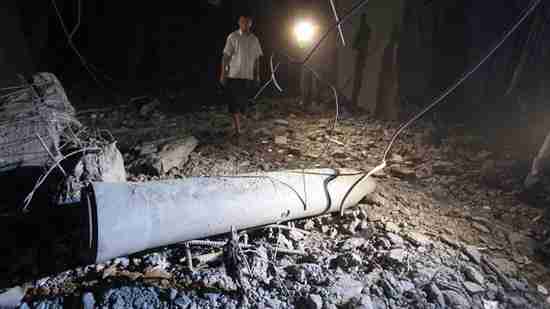 |
This comes one day after a Nato air strike on Gaddafi's compound in Tripoli. A Libyan government spokesman said that the air strike killed Muammar Gaddafi's youngest son, Saif al-Arab Gaddafi, and three of the Libyan leader's grandsons.
Libyan rebels in Benghazi are saying that they're skeptical that Gaddafi's son is really dead, according to AFP. And a Nato spokesman says that the reports of the deaths of Gaddafi's son and grandchildren are unconfirmed, according to Haaretz. "We targeted a military command and control building with a precision strike. It was not targeted against any individual. It was a military target, clearly linked to the Gadhafi's regime's systematic attacks on the civilian population."
The controversy is arising because it appears that Nato targeted Gaddafi's compound in order to assassinate Gaddafi, which would be a violation of U.S. and international law, and would be beyond the U.N. resolution that mandated the Libyan operation.
A Russian MP, Konstantin Kosachev, is quoted by Reuters as saying that the strike was proof that the coalition was not protecting civilians. "(It is) a clear confirmation of the indiscriminate use of force by the anti-Libyan coalition," he said.
However, a leading Republican senator, Lindsey Graham, defended the action on Fox News Sunday:
"Well, I think this is a good move by NATO to go after the source of the problem. If you want to protect the Libyan people, go after his inner circle. Do two things -- support the rebels, give them better air cover, get American aircraft back in the game to diminish Gadhafi's military, but also put pressure in Tripoli. In my view, wherever Gadhafi goes, he is the legitimate military target. He's the command and control source. He's not the legitimate leader of Libya. And the way to get to this to end is to go after the people around him and his support network.In my view, he is not a foreign leader. In my view, he's a murderer. He's killing his own people. He's acting outside of international law. He's bombing civilians. He is not the legitimate leader of Libya. ...
I support what Nato did. This is a good use of the mandate. This is the way to end this. Thousands of people are subject to dying the longer this takes. No one in the world is going to regret Gaddafi being replaced, no matter how you do it. So I want to thank Nato for expanding the scope of these operations, and I wish we'd acted earlier, but we're now on the right track, supporting the rebels and going after the inner circle. Everything around him needs to be subject to attack."
This continuing deterioration of the Libyan crisis comes at a time when military leaders of neighboring countries -- Mali, Mauritania, Niger and Algeria -- are on alert, according to AFP. An officer from Mali is quoted as saying, "The situation in Libya is of great concern. There is a risk of destabilising the entire region."
He indicated that the instability is providing opportunities for Al-Qaeda in the Islamic Maghreb (AQIM), the group that's assumed responsible for the cafe bombing in Marrakesh, Morocco, a couple of days ago.
"Because of the Libyan crisis, the security situation in the Sahel has deteriorated, so it is necessary to be careful. We are all on alert and we keep each other informed," he said.
(Comments: For reader comments, questions and discussion,
see the 2-May-11 News -- Libya war controversy rages after missile strike on Gaddafi compound
thread of the Generational Dynamics forum. Comments may be
posted anonymously.)
(2-May-2011)
Permanent Link
Receive daily World View columns by e-mail
Donate to Generational Dynamics via PayPal
Syria's security forces arrest hundreds, shell Daraa
This morning's key headlines from GenerationalDynamics.com.
 |
Late Sunday evening, President Barack Obama announced that Osama bin Laden was killed a week ago by a U.S. bomb delivered manually, not by a drone, based on actionable US intelligence. DNA tests have confirmed that it's really OBL. Bin Laden was killed in a mansion in Abbottabad, Pakistan, near Islamabad. American bases around the world have been told to be on high alert for revenge attacks. The death of OBL is an important symbolic act at this time, but it may not have much effect on the operations in Afghanistan. OBL's death by American attack in Pakistan will have repercussions in relations between the U.S. and Pakistan, and will cause a backlash among Pakistanis who object to U.S. missile strikes in Pakistan. Furthermore, the fact that OBL was killed near the Pakistani capital of Islamabad will raise suspicions that Pakistan's intelligence group suspected or knew where he was. Hundreds of joyful Washingtonians and students gathered outside the north lawn of the White House, cheering, chanting "USA!" and singing the Star Spangled Banner. (FNC/CNN)
Thousands of Syrians continued pro-democracy protests on Sunday. Security forces arrested hundreds, and shelled the city of Daraa into submission with a tank-backed force. In the central city of Homs, thousands marched chanting "downfall of the regime." Signs of discontent are emerging in the army, a reaction to being forced to fire on and kill peaceful Syrian protesters. Reuters
As the situation in Syria appears to be going out of control, Arab leaders are being forced to break their silence. The Arab League was instrumental in facilitating the international military intervention in Libya, but has issued only a general statement saying peaceful protesters in Arab states deserved "support, not bullets." Arab officials are afraid of facing similar uprisings in their own countries. But a former Arab official says, "Everyone is concerned about Syria but everyone is also worried about the day after. Still, things are moving at a pace that is faster than anyone imagined and governments are making decisions hour by hour, not even day by day." Financial Times (Access).
Reacting to the reconciliation of Hamas and Fatah, and plans for a meeting in Cairo later this week to form a unity government, Israel has decided to temporarily halt the transfer of millions of dollars of tax revenue to the Palestinian Authority (the governing side of Fatah). Israel collects $80-100 million each month in taxes at border crossings, and turns the money over to the PA. The PA warned that it will not be able to pay the salaries of its civil services, and said that it as "an assault on the Palestinian economy." Jerusalem Post.
 |
The flow of thousands of Tunisian and Libyan migrants to Italy, where they've received travel visas for travel throughout the European Union, is causing the EU to consider reinstating border controls that were abandoned in 1995 by the Schengen agreement. Many migrants speak French and wish to reach France, and so France is particularly interested in border controls. Reuters
Many migrants hope to reach the UK, where they believe that they'll be able to live on rich benefits without working. One is quoted as saying, "There is nothing for us in France. I sleep outside. I hear the Government in Britain gives money. I want to go to England. I will be rich. I will receive benefits." The Sun (UK)
Last year's promises by Hungary's government for "a notable increase in public security" have gone unfulfilled, as the police and judiciary have lost control over the growing right-extremist citizen groups and paramilitary-style gangs. They've staged repeated anti-Roma marches against "Gypsy criminality," and police have stood aside as vigilante groups have attacked. Roma activist Aladár Horváth says that the country has been gripped by a "civil war-like atmosphere" and "rampant racism." Der Spiegel
(Comments: For reader comments, questions and discussion,
see the 2-May-11 News -- Libya war controversy rages after missile strike on Gaddafi compound
thread of the Generational Dynamics forum. Comments may be
posted anonymously.)
(2-May-2011)
Permanent Link
Receive daily World View columns by e-mail
Donate to Generational Dynamics via PayPal
The move may be political theatre
In a rebuff to the six-nation Gulf Cooperation Council (GCC), led by Saudi Arabia, Yemen's president Ali Abdullah Saleh has refused to sign a peace agreement that the GCC had brokered.
 |
After "Arab uprisings" began in January, first in Tunisia and then in Egypt, Yemen became the third country to face tens of thousands of pro-democracy protesters demanding that the country's leader step down. Since then, over 145 protesters have been killed, making the demands that Saleh step down even louder.
The GCC members, particularly Saudi Arabia and the UAE, were becoming increasingly concerned that Yemen's government would collapse completely, leaving the country in a state of tribal chaos. So the GCC ministers worked with Saleh and with the opposition leaders to come up with a transition plan that would allow Saleh to step down peacefully.
Saleh had informed the GCC a week ago that he would sign the plan, according to VOA. The plan called for Saleh to step down with a month, after 32 years of rule, in return for a grant of immunity from prosecution. The opposition coalition had accepted the deal as well, although some protesters objected to allowing Saleh escape prosecution.
Saleh was supposed to sign the agreement on Saturday, but found a cute way of backing out, according to Al-Arabiya. He said he would sign the agreement in his role as head of his political party, but not in his role as "president of the republic." In effect, he's reneging on his promise to step down.
Many officials in the region believe that Saleh's turnabout may be temporary political theatre, according to the article, and that he's trying to secure more concessions from Saudi Arabia and the UAE. Saleh is the beneficiary of a great deal of aid from oil-rich GCC countries, and other GCC leaders are unlikely to permit Saleh to humiliate them for long.
(Comments: For reader comments, questions and discussion,
see the 1-May-11 News -- Yemen's president Saleh reneges on agreement to step down
thread of the Generational Dynamics forum. Comments may be
posted anonymously.)
(1-May-2011)
Permanent Link
Receive daily World View columns by e-mail
Donate to Generational Dynamics via PayPal
Is Iran's president Ahmadinejad about to resign?
This morning's key headlines from GenerationalDynamics.com.
 |
A Libyan government spokesman said that a Nato air strike killed Muammar Gaddafi's youngest son, Saif al-Arab Gaddafi, and three of the Libyan leader's grandsons. Muammar Gaddafi and his wife were in the same house at the time, but they were unhurt. According to a Libyan government spokesman, "This was a direct operation to assassinate the leader of this country. This is not permitted by international law. It is not permitted by any moral code or principle. What we have now is the law of the jungle. We think now it is clear to everyone that what is happening in Libya has nothing to do with the protection of civilians." Al-Jazeera.
Some news reports have confused Saif al-Arab with Saif al-Islam, who has been a very visible international presence since the Libyan conflict began. (See "11-Mar-11 News -- Saif Gaddafi declares all out war on Libya opposition.") I've read that Saif al-Islam means "sword of Islam," so I assume that Saif al-Arab means "sword of Arabia."
Saif al-Arab is the least known of the sons. Until recently, he lived in Munich where he reportedly attended university. He has a reputation as a party animal and was investigated in 2008, but never charged, in an arms smuggling case. In February, Germany revoked his residency status and he will not be allowed back into the country. National Post
Rumors are spreading that Iran's president Mahmoud Ahmadinejad is about to resign over bitter differences with the supreme leader Ayatollah Ali Khamenei. Asian News International
Negotiators at the latest United Nations summit on climate change have been unsuccessful at raising large sums of money, purportedly to help poor nations adapt to climate change. The principal disagreement is that rich donor countries demand "cumbersome oversight," which the poor recipients refuse to tolerate. The next climate change conference is scheduled for December in Durban, South Africa. Reuters
In his April 27 column in the UAE-based Gulf News, Faisal Al Qasim wrote, "Zionist crimes pale in comparison with the manner in which some Arab regimes have cracked down on their own people for merely seeking change." He noted that "Israelis are very much less brutal" to Palestinians than some Arab regimes are to their own citizens. Because of this column, Al-Qasim was criticized for his column, and may have been forced to resign from his position at al-Jazeera.Memri
Al-Jazeera, headquartered in Qatar, broadcasts different messages in its English and Arabic editions. Al-Jazeera English has thoroughly covered the uprisings across the Mideast, but Al-Jazeera Arabic overreports events in Libya and Yemen, countries unfriendly to Qatar, while reducing coverage of uprisings in Bahrain and Syria. (As I've noted in the past, al-Jazeera is completely in the tank for Hamas, and is relentlessly hostile to the Palestinian Authority.) Washington Institute
Egypt is rebuking Israel for objecting to Egypt's decision to permanently open the Rafah crossing to Gaza. This will essentially break Israel's blockade of Gaza, allowing people and goods to flow freely. Israeli officials fear that this will permit more weapons to be smuggled into Gaza. Jerusalem Post
(Comments: For reader comments, questions and discussion,
see the 1-May-11 News -- Yemen's president Saleh reneges on agreement to step down
thread of the Generational Dynamics forum. Comments may be
posted anonymously.)
(1-May-2011)
Permanent Link
Receive daily World View columns by e-mail
Donate to Generational Dynamics via PayPal
Web Log Summary - 2016
Web Log Summary - 2015
Web Log Summary - 2014
Web Log Summary - 2013
Web Log Summary - 2012
Web Log Summary - 2011
Web Log Summary - 2010
Web Log Summary - 2009
Web Log Summary - 2008
Web Log Summary - 2007
Web Log Summary - 2006
Web Log Summary - 2005
Web Log Summary - 2004
Web Log - December, 2016
Web Log - November, 2016
Web Log - October, 2016
Web Log - September, 2016
Web Log - August, 2016
Web Log - July, 2016
Web Log - June, 2016
Web Log - May, 2016
Web Log - April, 2016
Web Log - March, 2016
Web Log - February, 2016
Web Log - January, 2016
Web Log - December, 2015
Web Log - November, 2015
Web Log - October, 2015
Web Log - September, 2015
Web Log - August, 2015
Web Log - July, 2015
Web Log - June, 2015
Web Log - May, 2015
Web Log - April, 2015
Web Log - March, 2015
Web Log - February, 2015
Web Log - January, 2015
Web Log - December, 2014
Web Log - November, 2014
Web Log - October, 2014
Web Log - September, 2014
Web Log - August, 2014
Web Log - July, 2014
Web Log - June, 2014
Web Log - May, 2014
Web Log - April, 2014
Web Log - March, 2014
Web Log - February, 2014
Web Log - January, 2014
Web Log - December, 2013
Web Log - November, 2013
Web Log - October, 2013
Web Log - September, 2013
Web Log - August, 2013
Web Log - July, 2013
Web Log - June, 2013
Web Log - May, 2013
Web Log - April, 2013
Web Log - March, 2013
Web Log - February, 2013
Web Log - January, 2013
Web Log - December, 2012
Web Log - November, 2012
Web Log - October, 2012
Web Log - September, 2012
Web Log - August, 2012
Web Log - July, 2012
Web Log - June, 2012
Web Log - May, 2012
Web Log - April, 2012
Web Log - March, 2012
Web Log - February, 2012
Web Log - January, 2012
Web Log - December, 2011
Web Log - November, 2011
Web Log - October, 2011
Web Log - September, 2011
Web Log - August, 2011
Web Log - July, 2011
Web Log - June, 2011
Web Log - May, 2011
Web Log - April, 2011
Web Log - March, 2011
Web Log - February, 2011
Web Log - January, 2011
Web Log - December, 2010
Web Log - November, 2010
Web Log - October, 2010
Web Log - September, 2010
Web Log - August, 2010
Web Log - July, 2010
Web Log - June, 2010
Web Log - May, 2010
Web Log - April, 2010
Web Log - March, 2010
Web Log - February, 2010
Web Log - January, 2010
Web Log - December, 2009
Web Log - November, 2009
Web Log - October, 2009
Web Log - September, 2009
Web Log - August, 2009
Web Log - July, 2009
Web Log - June, 2009
Web Log - May, 2009
Web Log - April, 2009
Web Log - March, 2009
Web Log - February, 2009
Web Log - January, 2009
Web Log - December, 2008
Web Log - November, 2008
Web Log - October, 2008
Web Log - September, 2008
Web Log - August, 2008
Web Log - July, 2008
Web Log - June, 2008
Web Log - May, 2008
Web Log - April, 2008
Web Log - March, 2008
Web Log - February, 2008
Web Log - January, 2008
Web Log - December, 2007
Web Log - November, 2007
Web Log - October, 2007
Web Log - September, 2007
Web Log - August, 2007
Web Log - July, 2007
Web Log - June, 2007
Web Log - May, 2007
Web Log - April, 2007
Web Log - March, 2007
Web Log - February, 2007
Web Log - January, 2007
Web Log - December, 2006
Web Log - November, 2006
Web Log - October, 2006
Web Log - September, 2006
Web Log - August, 2006
Web Log - July, 2006
Web Log - June, 2006
Web Log - May, 2006
Web Log - April, 2006
Web Log - March, 2006
Web Log - February, 2006
Web Log - January, 2006
Web Log - December, 2005
Web Log - November, 2005
Web Log - October, 2005
Web Log - September, 2005
Web Log - August, 2005
Web Log - July, 2005
Web Log - June, 2005
Web Log - May, 2005
Web Log - April, 2005
Web Log - March, 2005
Web Log - February, 2005
Web Log - January, 2005
Web Log - December, 2004
Web Log - November, 2004
Web Log - October, 2004
Web Log - September, 2004
Web Log - August, 2004
Web Log - July, 2004
Web Log - June, 2004